What To Know About Medicinal Herbal Capsules
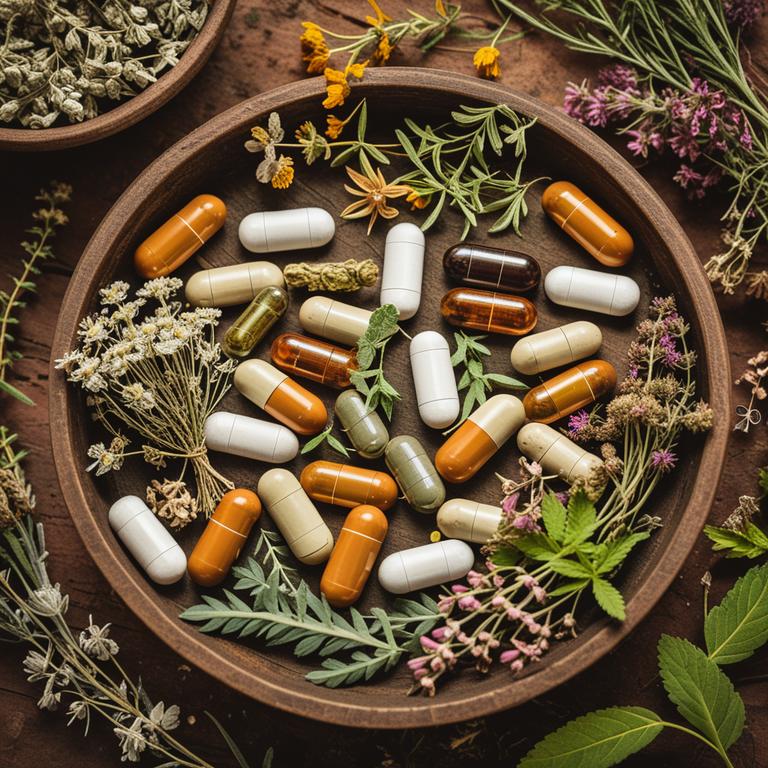
Some of the best medicinal herbal capsules include turmeric, which contains curcumin and is known for its powerful anti-inflammatory and antioxidant properties.
Garlic capsules are widely used to support heart health and boost the immune system due to their allicin content. Echinacea is a popular choice for cold and flu prevention, as it may help reduce the duration and severity of symptoms. Ashwagandha, an adaptogen, is valued for its ability to reduce stress and improve overall well-being.
Additionally, ginger capsules are often used to alleviate nausea, digestion issues, and inflammation, making them a versatile and effective herbal supplement.
FREE Herb Drying Checklist
How to make sure every batch retains maximum flavor, color, and aroma without the risk of mold or over-drying. Eliminate guesswork and trial-and-error, making herb drying faster, easier, and more efficient every time.
Table of Contents
- 1. Ginger (Zingiber officinale)
- 2. Stinging nettle (Urtica dioica)
- 3. Chaste tree (Vitex agnus-castus)
- 4. Thistle (Silybum marianum)
- 5. St. john's wort (Hypericum perforatum)
- 6. Echinacea (Echinacea purpurea)
- 7. Turmeric (Curcuma longa)
- 8. Salvia (Salvia officinalis)
- 9. Licorice (Glycyrrhiza glabra)
- 10. Blessed thistle (Cnicus benedictus)
- 11. Dog rose (Rosa canina)
- 12. Ceylon cinnamon (Cinnamomum verum)
- 13. Aloe barbadensis
- 14. Black pepper (Piper nigrum)
- 15. Yarrow (Achillea millefolium)
- 16. Peppermint (Mentha piperita)
- 17. Fennel (Foeniculum vulgare)
- 18. Field horsetail (Equisetum arvense)
- 19. Chamomile (Matricaria chamomilla)
- 20. Rosemary (Rosmarinus officinalis)
- 21. Ginkgo (Ginkgo biloba)
- 22. Common grape (Vitis vinifera)
- 23. Cumin (Cuminum cyminum)
- 24. Thyme (Thymus vulgaris)
- 25. English lavender (Lavandula angustifolia)
- 26. Panax ginseng (Panax ginseng)
- 27. Eucalyptus (Eucalyptus globulus)
- 28. Camellia (Camellia sinensis)
- 29. German chamomile (Chamomilla recutita)
- 30. Black elderberry (Sambucus nigra)
- 31. Black cohosh (Cimicifuga racemosa)
- 32. Marigold (Calendula officinalis)
- 33. Valerian (Valeriana officinalis)
- 34. Centella (Centella asiatica)
- 35. White water lily (Nymphaea alba)
- 36. Black cumin (Nigella sativa)
- 37. Red sage (Salvia miltiorrhiza)
- 38. Anise (Pimpinella anisum)
- 39. Ceylon cinnamon (Cinnamomum zeylanicum)
- 40. Ashwagandha (Withania somnifera)
- 41. Bacopa (Bacopa monnieri)
- 42. Golden root (Rhodiola rosea)
- 43. European plum (Prunus domestica)
- 44. Kava (Piper methysticum)
- 45. Lemon balm (Melissa officinalis)
- 46. Common mallow (Symphytum officinale)
- 47. Maca (Lepidium meyenii)
- 48. Lemon grass (Cymbopogon citratus)
- 49. Maypop (Passiflora incarnata)
- 50. Heartworts (Leonurus cardiaca)
- 51. Puncture vine (Tribulus terrestris)
- 52. Bloodroot (Sanguinaria canadensis)
- 53. Oregano (Origanum vulgare)
- 54. Indian barberry (Berberis aristata)
- 55. Indian frankincense (Boswellia serrata)
- 56. Dandelion (Taraxacum officinale)
- 57. Buckwheat (Plantago ovata)
- 58. Parsley (Petroselinum crispum)
- 59. False leaf (Phyllanthus amarus)
- 60. Horse radish (Cnidium monnieri)
- 61. Sacred lotus (Nelumbo nucifera)
- 62. White cedar (Thuja occidentalis)
- 63. Sutherlandia frutescens
- 64. Tulsi (Ocimum sanctum)
- 65. Wormwood (Artemisia vulgaris)
- 66. Catnip (Nepeta cataria)
- 67. Plantain (Plantago lanceolata)
- 68. Greek oregano (Satureja hortensis)
- 69. Nux vomica (Strychnos nux-vomica)
- 70. Tree peony (Paeonia suffruticosa)
- 71. Velvet bean (Mucuna pruriens)
- 72. Barrenwort (Epimedium grandiflorum)
- 73. Garlic (Allium sativum)
- 74. Caraway (Carum carvi)
- 75. Scots pine (Pinus sylvestris)
- 76. Tongkat ali (Eurycoma longifolia)
- 77. Goatweed (Eclipta prostrata)
- 78. Melaleuca (Melaleuca alternifolia)
- 79. Mountain arnica (Arnica montana)
- 80. Polium germander (Teucrium polium)
- 81. Euphrasia (Euphrasia officinalis)
- 82. Sanguisorba (Sanguisorba officinalis)
- 83. Geranium (Pelargonium graveolens)
- 84. Negundo vitex (Vitex negundo)
- 85. Sweet wormwood (Artemisia annua)
- 86. Kudzu (Pueraria lobata)
- 87. St. john's wort (Agrimonia eupatoria)
- 88. Sandalwood (Santalum album)
- 89. Pumpkin (Cucurbita pepo)
- 90. Tamarind (Tamarindus indica)
- 91. Common myrtle (Myrtus communis)
- 92. Pogostemon (Pogostemon cablin)
- 93. Purple coneflower (Echinacea angustifolia)
- 94. Hops (Humulus lupulus)
- 95. Chinese date (Ziziphus jujuba)
- 96. Hemp (Cannabis sativa)
- 97. Dill (Anethum graveolens)
- 98. Love-in-a-mist (Peucedanum ostruthium)
- 99. Marshmallow (Althaea officinalis)
- 100. Rhubarb (Rheum palmatum)
1. Ginger (Zingiber officinale)

Zingiber officinale herbal capsules are used to support digestive health by stimulating the production of digestive enzymes and reducing symptoms of indigestion, bloating, and nausea.
They are also commonly used to alleviate nausea and vomiting, particularly in cases of morning sickness or motion sickness, due to their natural antiemetic properties. These capsules may help in reducing inflammation and pain associated with conditions like arthritis because of their potent anti-inflammatory and analgesic compounds. Additionally, they are often incorporated into wellness routines to boost energy levels and improve mental clarity due to their thermogenic and mood-enhancing effects.
Overall, zingiber officinale herbal capsules are valued for their versatility and efficacy in promoting overall well-being through various physiological mechanisms.
2. Stinging nettle (Urtica dioica)

Urtica dioica herbal capsules are used to support digestive health by promoting the elimination of toxins from the body.
They are also beneficial for skin conditions due to their anti-inflammatory and antioxidant properties. These capsules may help in managing symptoms of arthritis by reducing inflammation and pain. Additionally, they are often used to enhance liver function and support detoxification processes.
The high concentration of nutrients and bioactive compounds in urtica dioica makes it a popular choice for those seeking natural health benefits.
3. Chaste tree (Vitex agnus-castus)

Vitex agnus-castus herbal capsules are used to support hormonal balance, particularly in women experiencing menstrual irregularities or symptoms of premenstrual syndrome (PMS).
They are often recommended for their potential to regulate menstrual cycles and alleviate mood swings, breast tenderness, and bloating associated with PMS. The herb is believed to influence the pituitary gland, which plays a key role in hormone regulation, making it a popular choice for women's health. Its traditional use dates back centuries, with historical records showing its application in herbal medicine for reproductive health.
Due to these properties, vitex agnus-castus herbal capsules are increasingly sought after as a natural alternative for hormonal support.
4. Thistle (Silybum marianum)

Silybum marianum herbal capsules are used to support liver health and detoxification due to their active compound, silymarin, which has antioxidant and anti-inflammatory properties.
These capsules are often recommended for individuals with liver conditions such as hepatitis or cirrhosis, as they may help protect liver cells from damage. Additionally, they are used to promote the regeneration of liver tissue and enhance the organ's ability to process toxins. Silybum marianum is also believed to aid in reducing the risk of liver disease and supporting overall metabolic function.
Because of these benefits, silybum marianum herbal capsules are a popular choice in natural health remedies for liver support.
5. St. john's wort (Hypericum perforatum)

Hypericum perforatum herbal capsules are used to support mood regulation and alleviate symptoms of mild to moderate depression.
They contain active compounds such as hyperforin and hypericin, which are believed to enhance the levels of neurotransmitters like serotonin, dopamine, and norepinephrine in the brain. These capsules are often recommended as a natural alternative or complement to conventional antidepressants, especially for individuals seeking a holistic approach to mental health. Their anti-inflammatory and antioxidant properties also contribute to overall well-being and may help reduce stress and anxiety.
Due to their potential benefits and relatively mild side effect profile, hypericum perforatum capsules are widely used in herbal medicine and complementary health practices.
6. Echinacea (Echinacea purpurea)

Echinacea purpurea herbal capsules are used to support the immune system and help the body fight off infections, particularly the common cold.
They contain active compounds such as polysaccharides, glycoproteins, and caffeic acid derivatives, which are believed to enhance immune function by stimulating the production of white blood cells. These capsules are also used to reduce the duration and severity of cold symptoms when taken at the first sign of illness. Due to their natural origin and minimal side effects, they are a popular choice for people seeking alternative remedies.
However, it is important to consult a healthcare provider before use, especially for individuals with allergies or chronic health conditions.
7. Turmeric (Curcuma longa)

Curcuma longa herbal capsules are used to support digestive health by promoting the production of bile and aiding in the digestion of fats.
They are also known for their anti-inflammatory properties, which can help alleviate symptoms of conditions such as arthritis and inflammatory bowel disease. These capsules may contribute to skin health by reducing oxidative stress and supporting the body's natural healing processes. Additionally, curcuma longa is often used to enhance cognitive function and may help in the prevention of neurodegenerative diseases.
The combination of these benefits makes curcuma longa a popular natural supplement for overall wellness and disease prevention.
8. Salvia (Salvia officinalis)
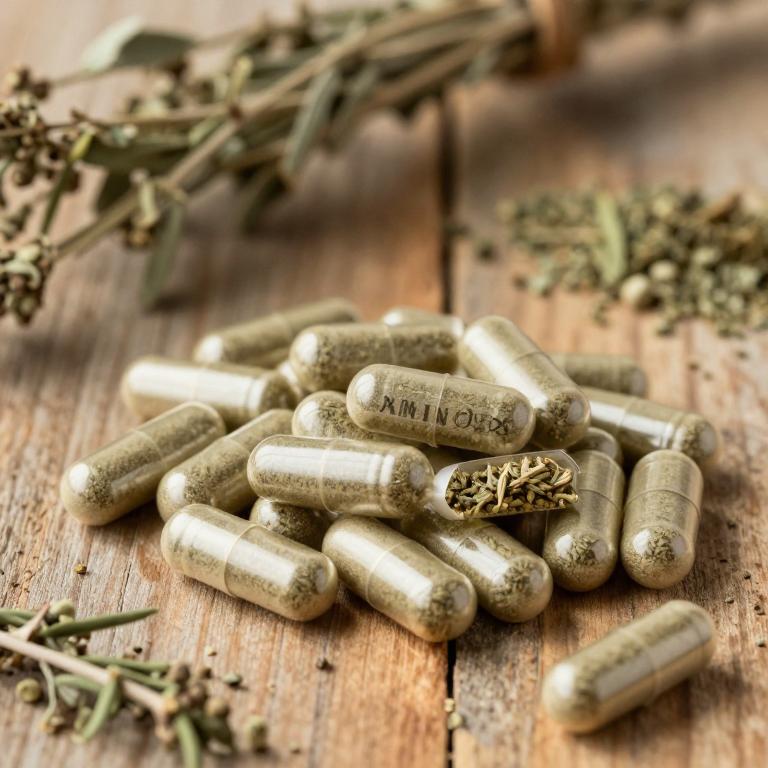
Salvia officinalis herbal capsules are used to support digestive health by promoting the secretion of digestive enzymes and reducing symptoms of indigestion.
They are also commonly used to alleviate symptoms of anxiety and stress due to their calming properties. These capsules may help improve cognitive function and memory, making them beneficial for mental clarity and focus. Additionally, salvia officinalis has been traditionally used to treat respiratory issues such as coughs and sore throats.
Overall, their versatility and potential health benefits make salvia officinalis herbal capsules a popular choice for natural health support.
9. Licorice (Glycyrrhiza glabra)

Glycyrrhiza glabra herbal capsules are used to support respiratory health by helping to relieve symptoms of coughs, colds, and bronchitis due to their expectorant and anti-inflammatory properties.
They are also commonly used to soothe digestive issues such as indigestion and ulcers because of their ability to protect the stomach lining and reduce acid secretion. Additionally, these capsules may aid in reducing inflammation and irritation in the throat, making them a popular choice for managing sore throats and laryngitis. The adaptogenic qualities of glycyrrhiza glabra also help the body manage stress and enhance immune function, contributing to overall wellness.
Due to these diverse benefits, glycyrrhiza glabra herbal capsules are valued in both traditional and modern herbal medicine for their broad therapeutic applications.
10. Blessed thistle (Cnicus benedictus)
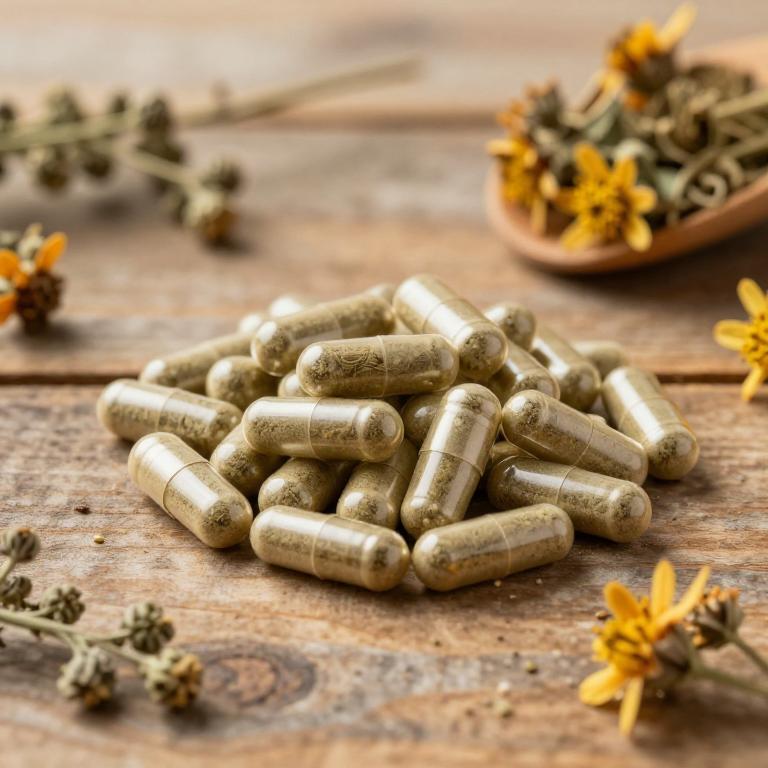
Cnicus benedictus herbal capsules are used to support digestive health and promote overall well-being.
This plant, also known as blessed thistle, is valued for its high concentration of nutrients and bioactive compounds that aid in nutrient absorption and gut function. They are often incorporated into herbal formulations to enhance the body's natural detoxification processes. The capsules provide a convenient and concentrated form of the herb, making it easy to incorporate into daily wellness routines.
Due to their potential to support liver and digestive health, cnicus benedictus capsules are recommended for individuals seeking natural remedies for gastrointestinal issues.
11. Dog rose (Rosa canina)
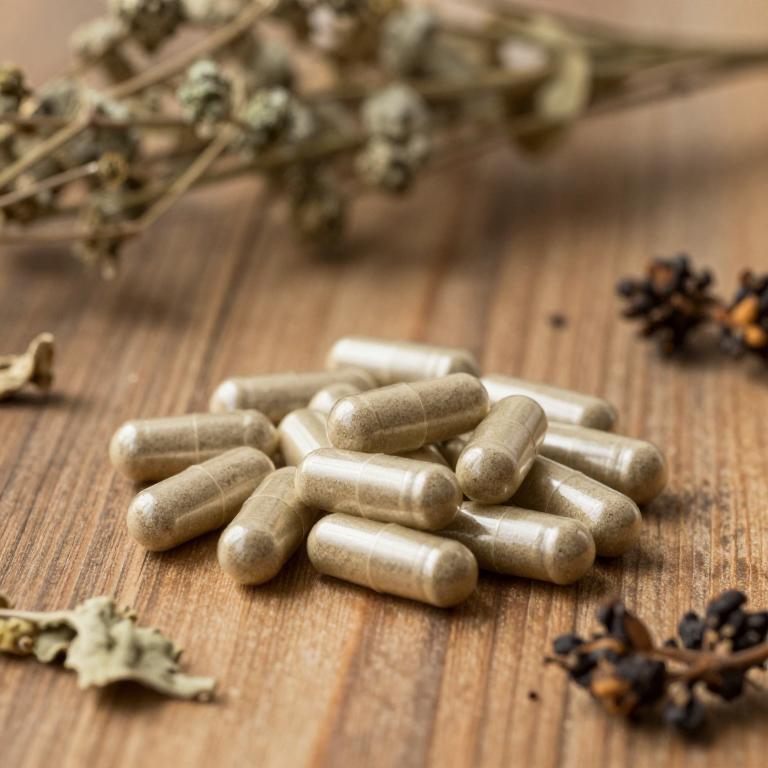
Rosa canina herbal capsules are used to support immune function and promote overall health due to their high content of vitamin C and antioxidants.
These capsules are often recommended for individuals looking to enhance their body's natural defenses against infections and illnesses. The anti-inflammatory properties of Rosa canina make it beneficial for reducing symptoms of respiratory conditions and supporting joint health. Additionally, they may aid in skin health by promoting collagen production and improving skin elasticity.
Overall, Rosa canina herbal capsules are valued for their natural, holistic approach to wellness and their potential to contribute to a balanced and healthy lifestyle.
12. Ceylon cinnamon (Cinnamomum verum)
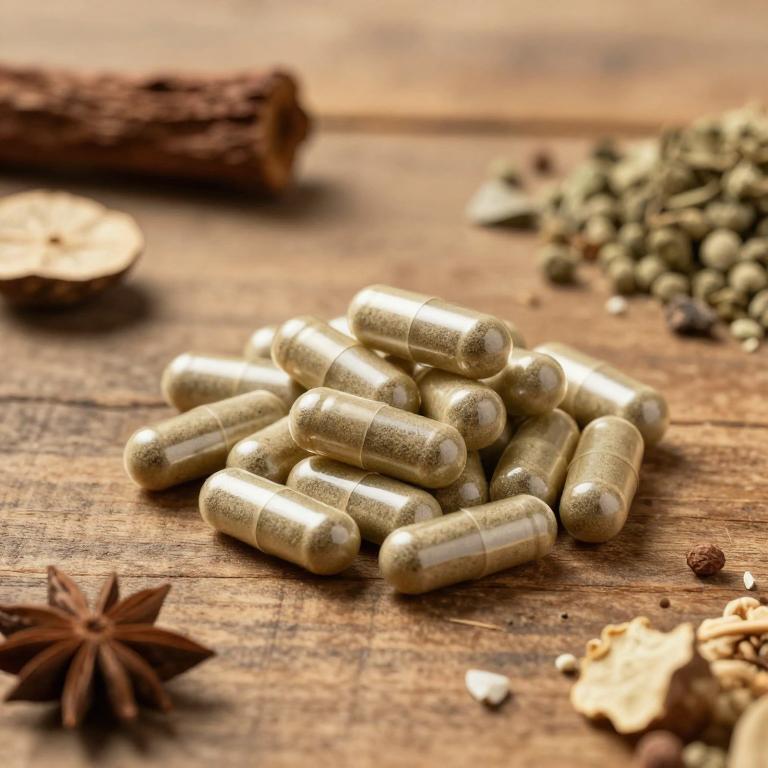
Cinnamomum verum herbal capsules are used to support digestive health by promoting the secretion of digestive enzymes and reducing symptoms of indigestion.
They are also known to help regulate blood sugar levels, making them beneficial for individuals with diabetes or those at risk of developing the condition. These capsules may aid in reducing inflammation due to their antioxidant properties, which can contribute to overall wellness. Additionally, they are often used to improve circulation and alleviate symptoms of colds and respiratory issues.
The versatility of cinnamomum verum makes it a valuable natural supplement for maintaining holistic health.
13. Aloe barbadensis
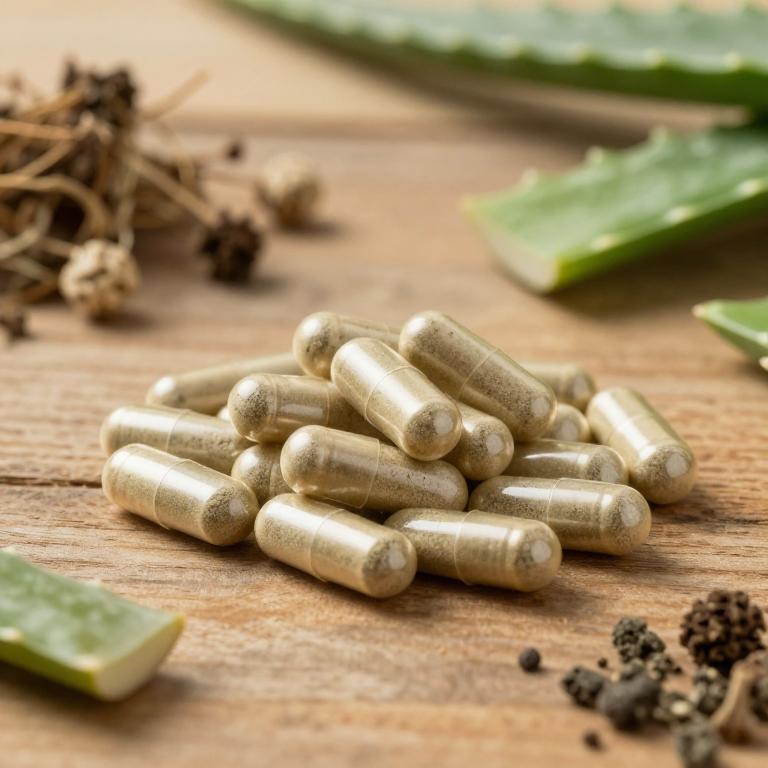
Aloe barbadensis herbal capsules are used to promote digestive health by supporting regular bowel movements and reducing symptoms of constipation.
They are also utilized to soothe inflammation and irritation in the gastrointestinal tract, making them beneficial for individuals with conditions like irritable bowel syndrome. Additionally, these capsules are known for their potential to enhance skin health when applied topically, though they are primarily consumed internally for their internal benefits. The active compounds in aloe barbadensis, such as polysaccharides and antioxidants, contribute to its therapeutic effects.
Overall, aloe barbadensis herbal capsules are valued for their natural ability to support overall wellness and digestive function.
14. Black pepper (Piper nigrum)
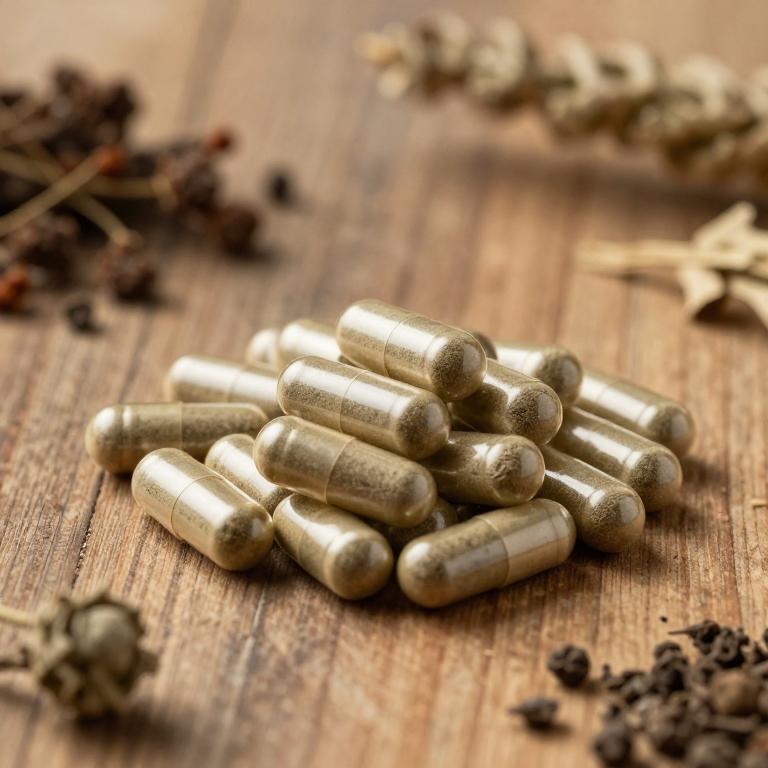
Piper nigrum herbal capsules are used to support digestive health by stimulating the production of digestive enzymes and promoting healthy gut function.
They are also known to aid in reducing inflammation and may help alleviate symptoms of gastrointestinal disorders such as indigestion and bloating. These capsules are often used in traditional medicine for their potential to enhance metabolism and support weight management efforts. Additionally, piper nigrum is believed to have antioxidant properties that can contribute to overall immune system support.
Due to these potential benefits, piper nigrum herbal capsules are increasingly being incorporated into modern wellness routines for their holistic health advantages.
15. Yarrow (Achillea millefolium)
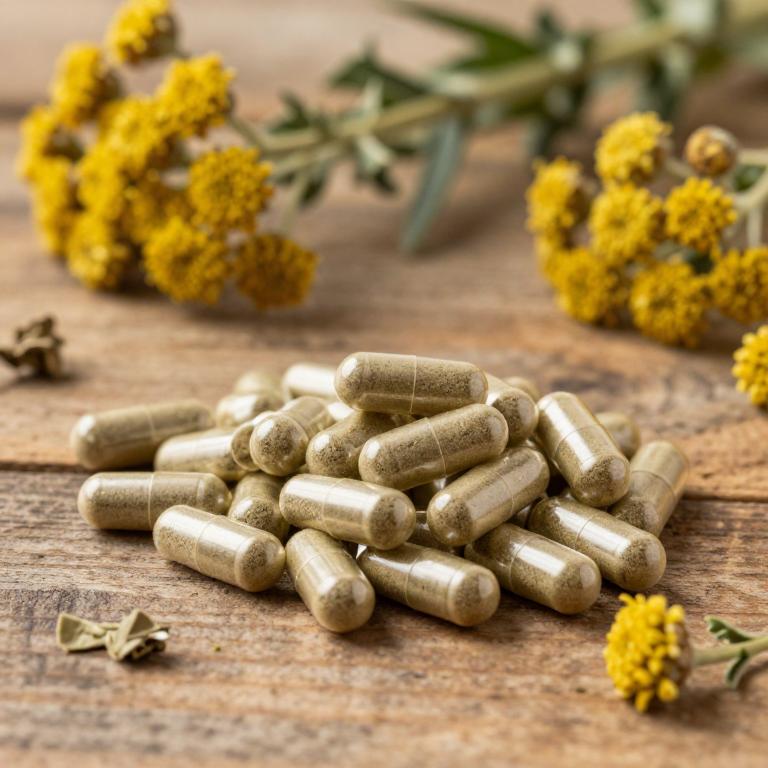
Achillea millefolium herbal capsules are used to support digestive health by promoting the production of digestive enzymes and reducing gastrointestinal discomfort.
They are also commonly used to alleviate symptoms of mild digestive issues such as bloating, gas, and indigestion due to their carminative properties. The herb is believed to have anti-inflammatory effects that can help soothe the lining of the stomach and intestines. Additionally, achillea millefolium may aid in the management of mild anxiety and stress-related digestive disturbances.
These capsules are often preferred for their natural composition and potential to complement conventional treatments without significant side effects.
16. Peppermint (Mentha piperita)
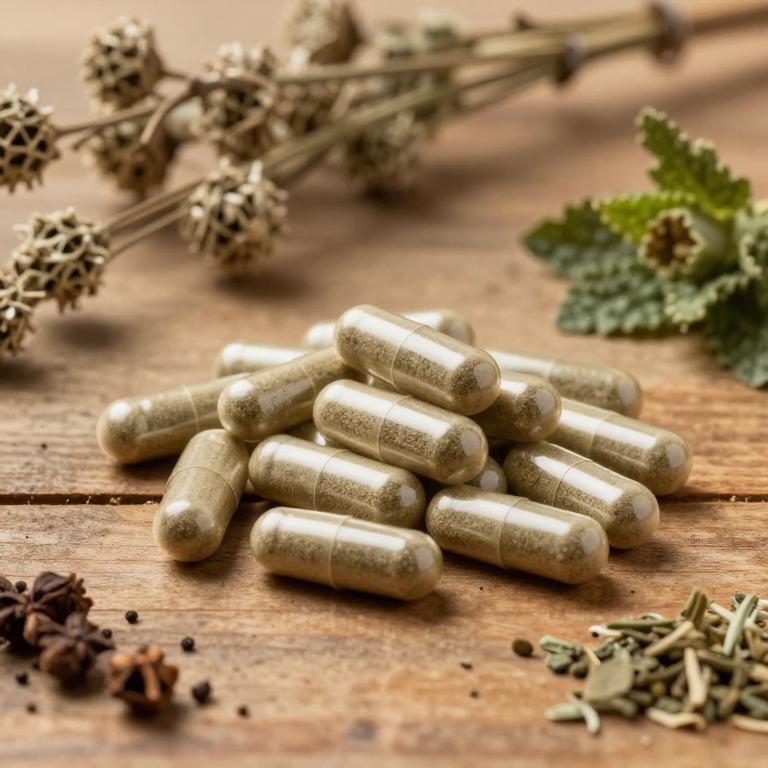
Mentha piperita herbal capsules are used to support digestive health by easing symptoms of indigestion, bloating, and gas.
They are also commonly used to relieve mild headaches and muscle pain due to their cooling and soothing properties. These capsules can help reduce stress and promote relaxation, making them a popular choice for individuals seeking natural remedies for anxiety. Additionally, mentha piperita is known to aid in respiratory health by helping to alleviate nasal congestion and ease coughing.
Overall, their versatility and gentle nature make mentha piperita herbal capsules a valuable addition to natural health regimens.
17. Fennel (Foeniculum vulgare)
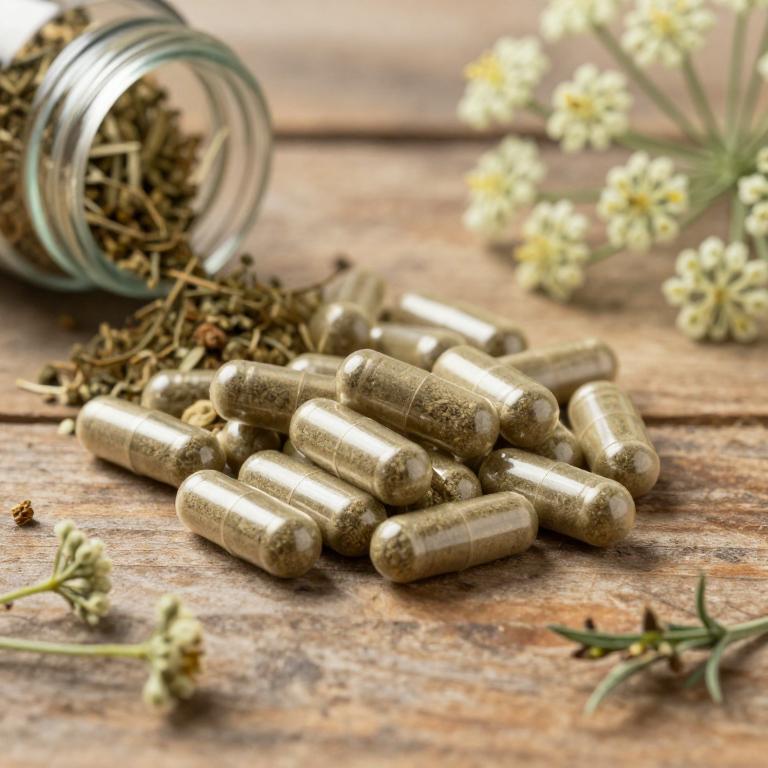
Foeniculum vulgare herbal capsules are used to support digestive health by promoting the secretion of digestive enzymes and reducing bloating and gas.
They are also commonly used to alleviate symptoms of indigestion and irritable bowel syndrome due to their carminative properties. These capsules may help in reducing nausea and improving appetite, making them beneficial for individuals with digestive disorders. Additionally, they are valued for their potential anti-inflammatory and antioxidant effects, which can contribute to overall wellness.
The use of foeniculum vulgare herbal capsules is supported by traditional medicine and some modern studies, making them a popular choice for natural health remedies.
18. Field horsetail (Equisetum arvense)
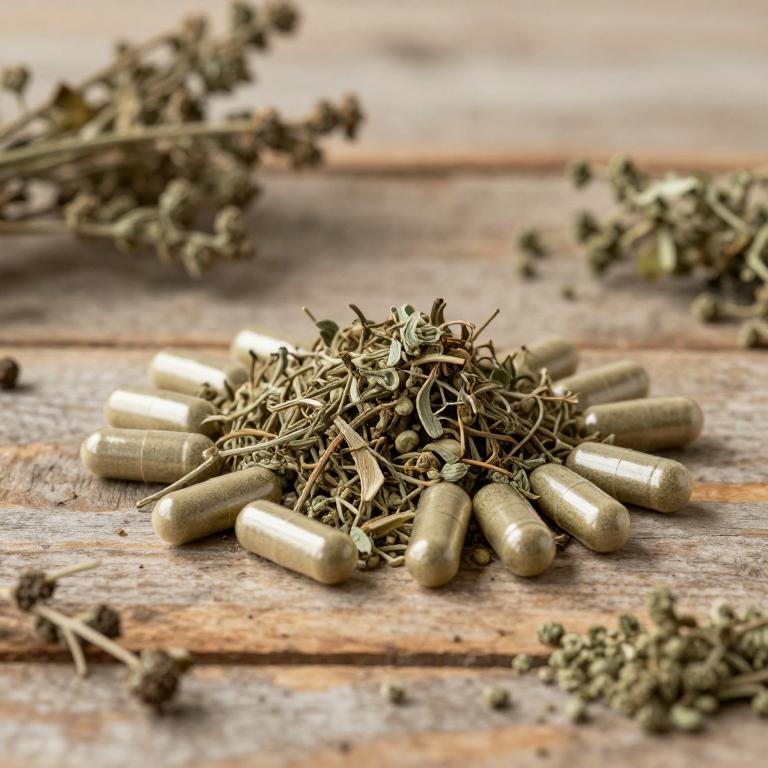
Equisetum arvense herbal capsules are used to support urinary tract health and promote kidney function due to their diuretic properties.
They are also believed to help in the management of gout by reducing uric acid levels in the body. These capsules may aid in detoxification processes by assisting the body in eliminating toxins through urine. Additionally, they are sometimes used to alleviate symptoms of respiratory conditions such as bronchitis and asthma.
The historical use of Equisetum arvense in traditional medicine further supports its role in various health-related applications.
19. Chamomile (Matricaria chamomilla)
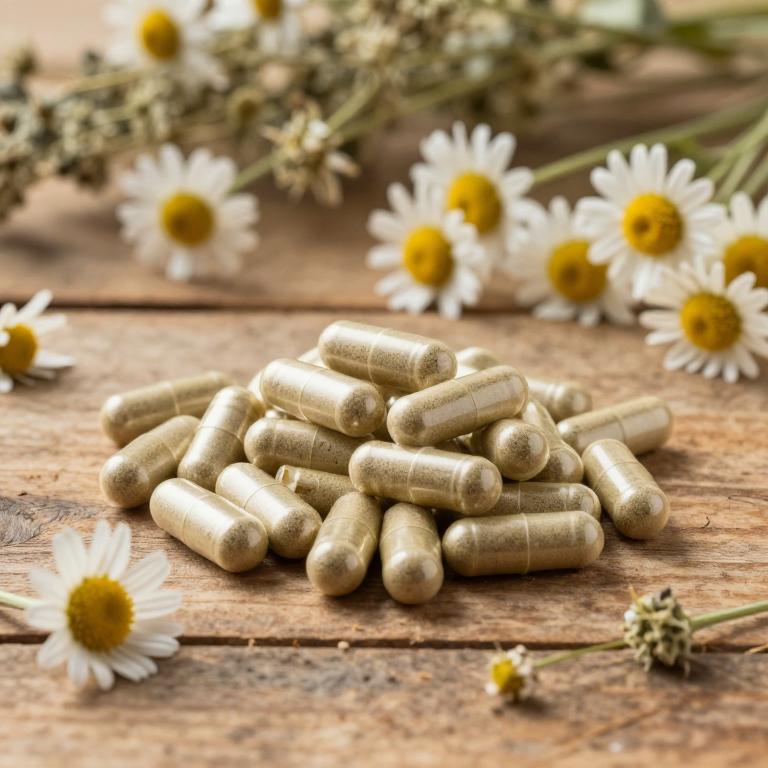
Matricaria chamomilla herbal capsules are used to promote relaxation and alleviate mild anxiety due to their calming properties.
They are commonly taken to support sleep quality by reducing insomnia and fostering a sense of tranquility. These capsules are also used to soothe digestive issues such as indigestion, bloating, and stomach cramps, thanks to their anti-inflammatory and antispasmodic effects. Additionally, they may help reduce inflammation and irritation in the skin, making them useful for minor skin conditions or topical applications.
Their versatility and mild nature make them a popular choice for those seeking natural remedies for stress, sleep, and digestive health.
20. Rosemary (Rosmarinus officinalis)
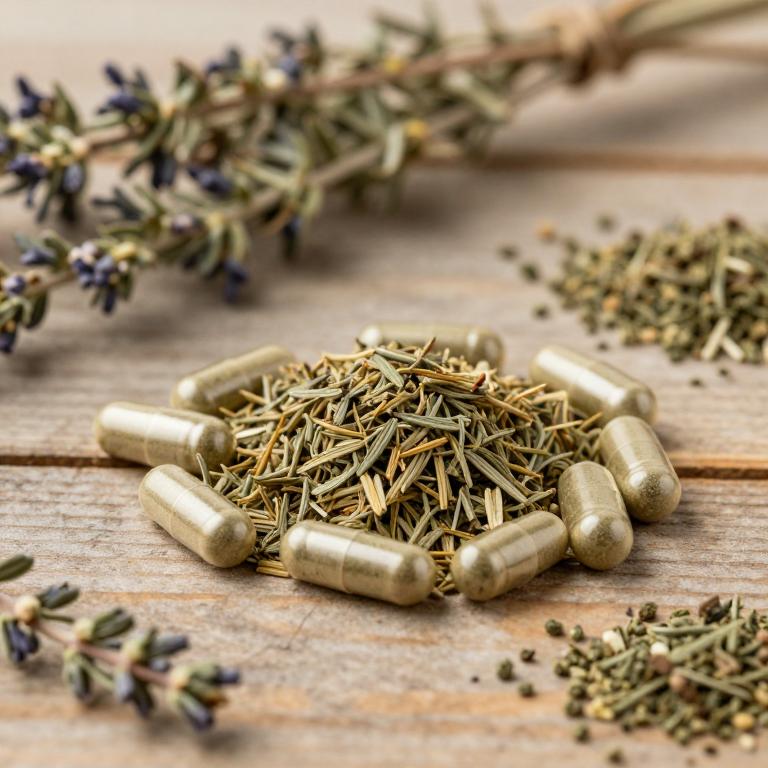
Rosmarinus officinalis herbal capsules are used to support cognitive function and memory due to their rich content of antioxidants and anti-inflammatory compounds.
These capsules may help improve concentration and mental clarity, making them popular among students and professionals. They are also known to promote healthy circulation, which can aid in reducing fatigue and enhancing overall vitality. Additionally, rosmarinus officinalis has been traditionally used to support digestive health and reduce stress-related symptoms.
Because of their natural composition and potential health benefits, these capsules are increasingly sought after as a complementary therapy in holistic wellness practices.
21. Ginkgo (Ginkgo biloba)
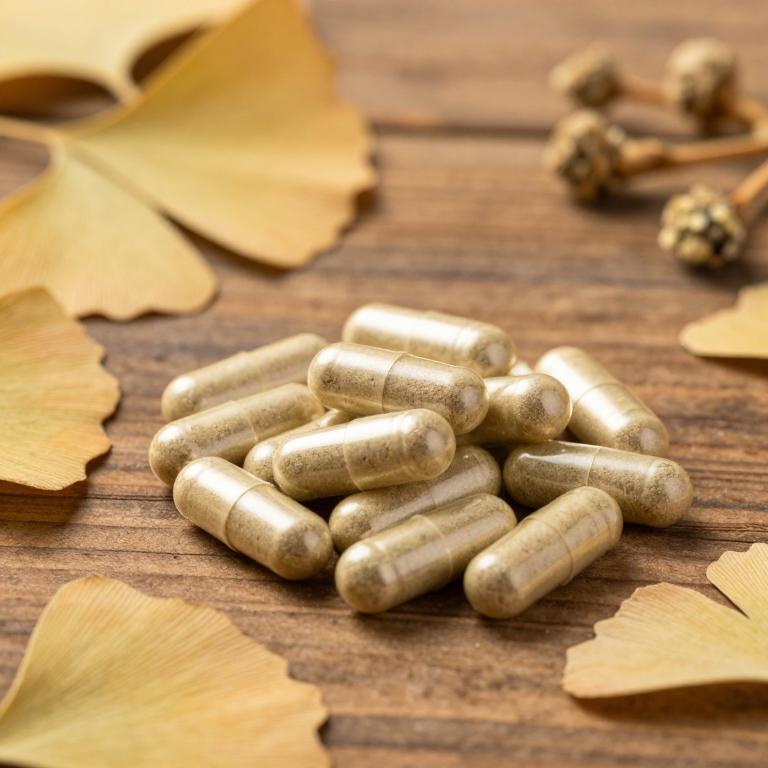
Ginkgo biloba herbal capsules are used to improve cognitive function and memory, particularly in individuals experiencing age-related decline.
They are believed to enhance blood circulation, which can support brain health and reduce the risk of cognitive impairment. These capsules are also commonly used to alleviate symptoms of anxiety and stress due to their calming effects on the nervous system. Additionally, ginkgo biloba is thought to have antioxidant properties that may protect cells from damage and support overall health.
Because of these potential benefits, they are often recommended as a natural supplement for promoting mental clarity and well-being.
22. Common grape (Vitis vinifera)
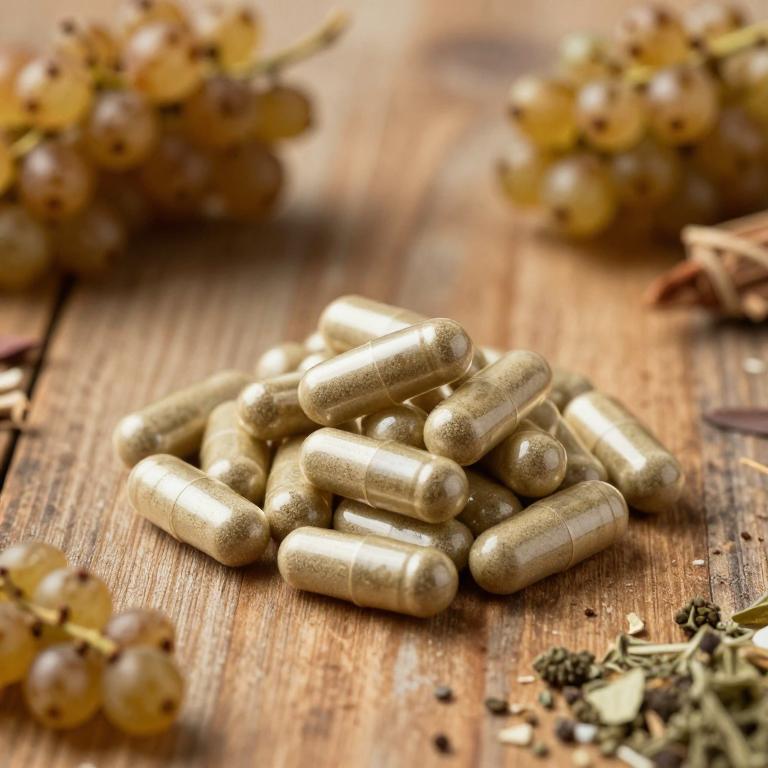
Vitis vinifera herbal capsules are used to support cardiovascular health by promoting healthy blood flow and reducing oxidative stress.
These capsules contain resveratrol, a powerful antioxidant known for its ability to protect cells from damage caused by free radicals. They are also beneficial for improving metabolic function and may help in managing conditions like diabetes and hypertension. Additionally, vitis vinifera capsules are valued for their anti-inflammatory properties, which can contribute to overall wellness.
Due to their natural composition and wide range of health benefits, they are increasingly popular as a dietary supplement for those seeking to enhance their well-being.
23. Cumin (Cuminum cyminum)
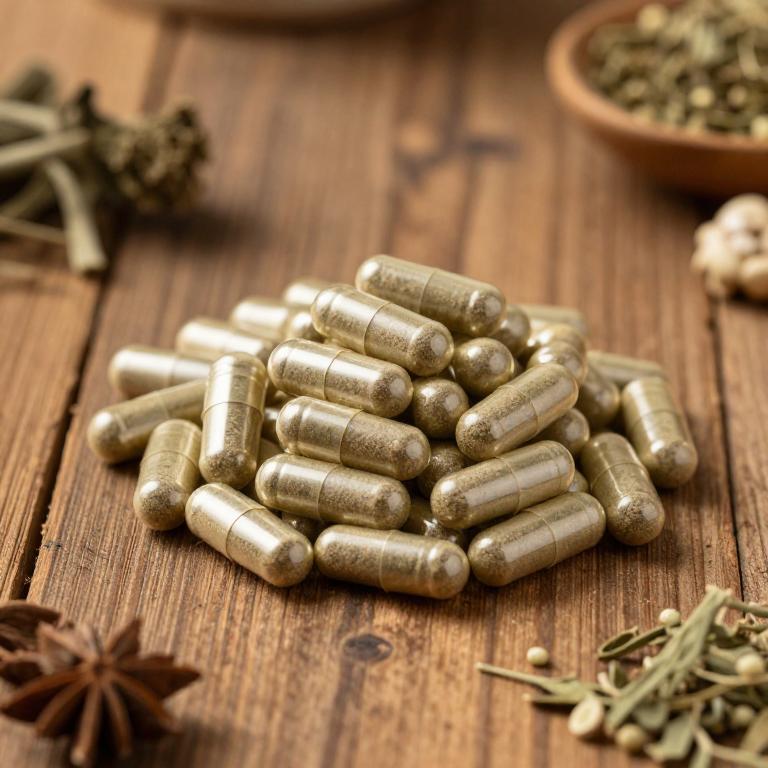
Cuminum cyminum herbal capsules are used to support digestive health by promoting the secretion of digestive enzymes and reducing bloating and gas.
They are also commonly used to aid in the relief of respiratory issues such as coughs and congestion due to their expectorant properties. These capsules may help in reducing inflammation and supporting the immune system, making them beneficial during seasonal changes or when the body is under stress. Additionally, cuminum cyminum is valued for its potential to enhance appetite and improve the overall function of the gastrointestinal tract.
Their versatility and natural properties make them a popular choice in traditional and modern herbal medicine for a variety of wellness purposes.
24. Thyme (Thymus vulgaris)
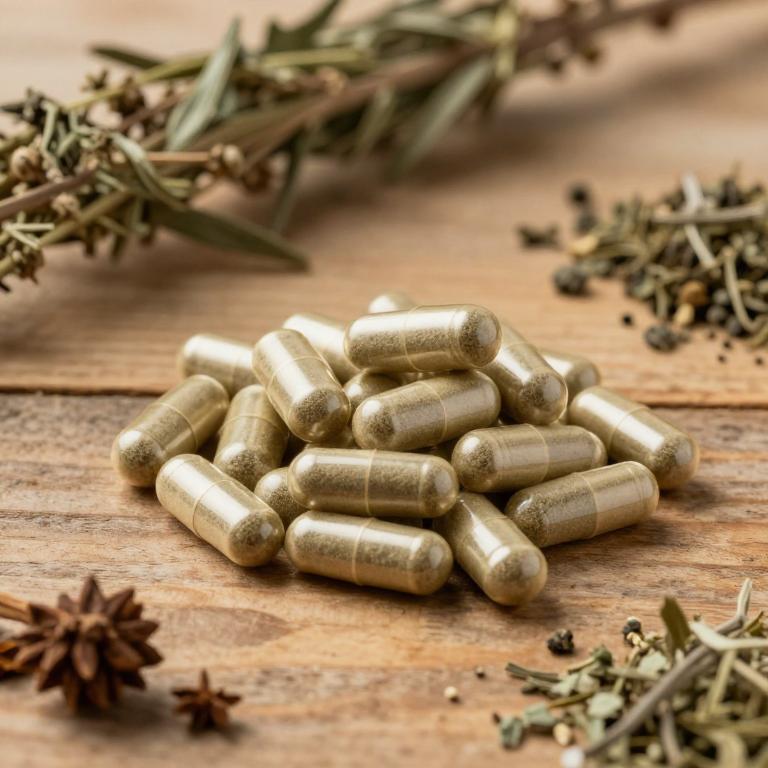
Thymus vulgaris herbal capsules are used to support immune system function by stimulating the production of white blood cells, which help the body fight off infections.
They are also known to have antioxidant properties that protect cells from damage caused by free radicals. These capsules may be beneficial for individuals experiencing frequent colds or respiratory issues, as they can enhance the body's natural defenses. Additionally, thymus vulgaris is believed to aid in the recovery process after illness or surgery by promoting overall vitality and energy levels.
Due to their natural composition and potential health benefits, they are increasingly popular as a complementary therapy in holistic health practices.
25. English lavender (Lavandula angustifolia)
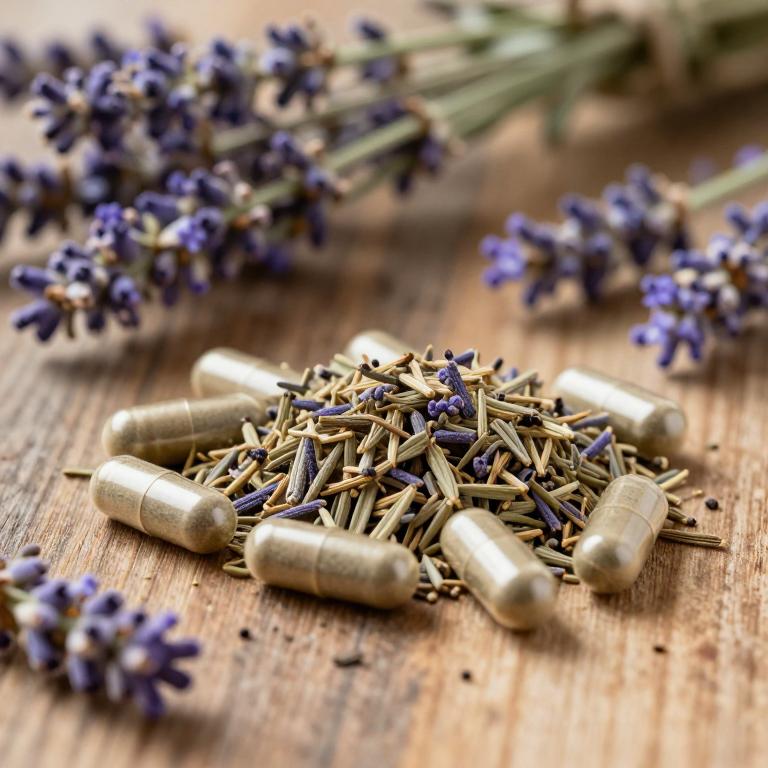
Lavandula angustifolia herbal capsules are used to promote relaxation and improve sleep quality by reducing anxiety and stress.
These capsules contain lavender oil, which has been traditionally used for its calming properties that help ease tension and foster a sense of well-being. They are also beneficial for alleviating symptoms of mild depression and supporting emotional balance. The natural compounds in lavender, such as linalool and lavandulyl acetate, contribute to their effectiveness in reducing irritability and enhancing mood.
Due to their gentle nature, lavender capsules are often recommended as a complementary therapy for those seeking natural remedies for mental and emotional health.
26. Panax ginseng (Panax ginseng)
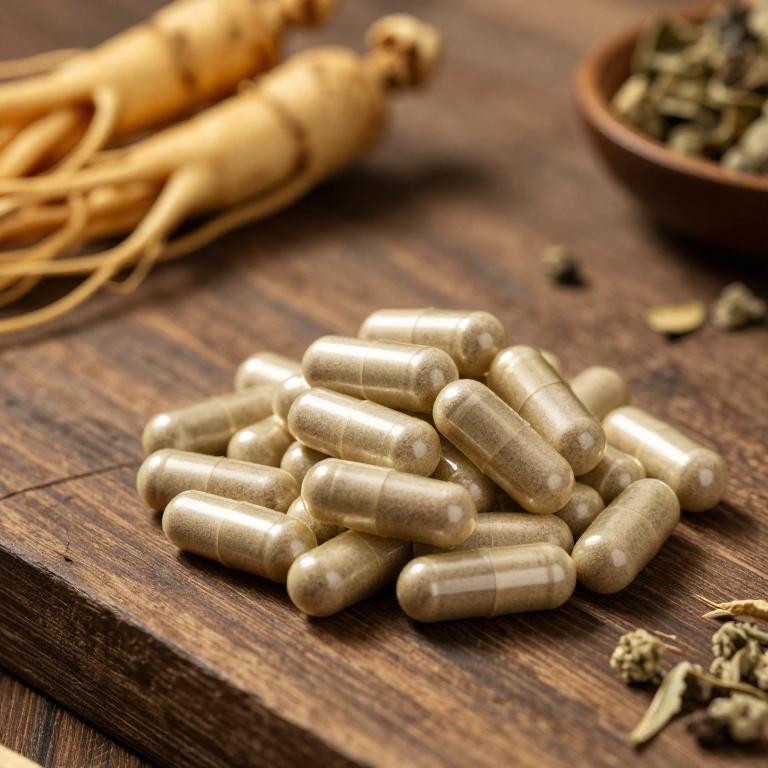
Panax ginseng herbal capsules are used to enhance physical and mental performance by improving energy levels and reducing fatigue.
They are often consumed to support cognitive function, helping with concentration, memory, and overall mental clarity. These capsules are also utilized in traditional medicine to boost the immune system and promote overall vitality. Additionally, they may help in managing stress and anxiety by regulating the body's stress response mechanisms.
Due to their adaptogenic properties, panax ginseng herbal capsules are increasingly popular as a natural supplement for those seeking holistic health benefits.
27. Eucalyptus (Eucalyptus globulus)
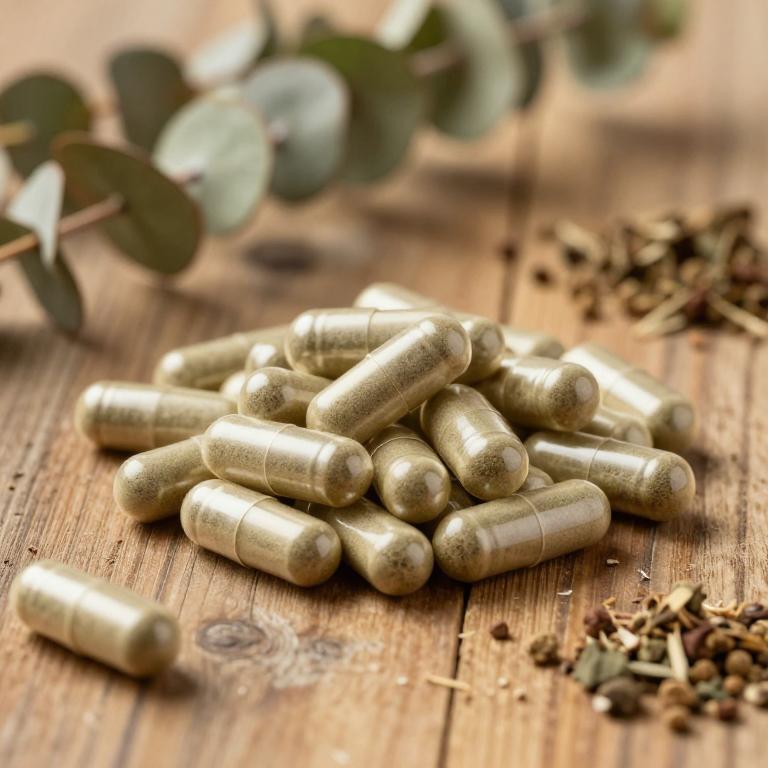
Eucalyptus globulus herbal capsules are used to support respiratory health by helping to relieve symptoms of colds, coughs, and congestion.
They contain eucalyptus oil, which has natural decongestant properties that can help loosen mucus and improve breathing. These capsules are also known to have anti-inflammatory and antimicrobial effects, making them useful for reducing inflammation in the respiratory tract and fighting off infections. Due to their soothing properties, they are often recommended for people suffering from persistent bronchitis or sinusitis.
Overall, eucalyptus globulus herbal capsules are a popular natural remedy for promoting clearer airways and enhancing overall respiratory function.
28. Camellia (Camellia sinensis)
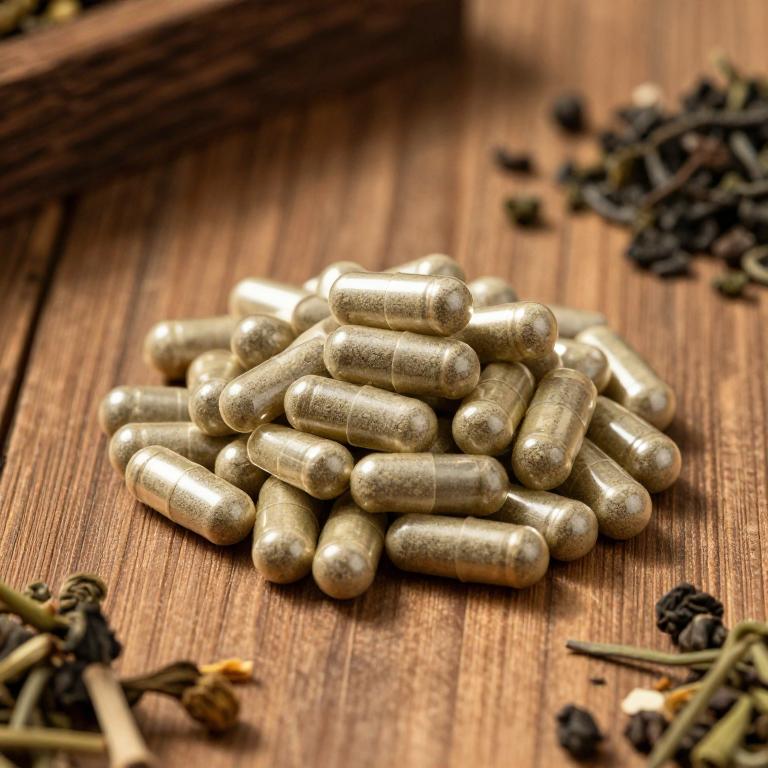
Camellia sinensis herbal capsules are used to support overall health and wellness by providing a concentrated form of green tea extract, which is rich in antioxidants and bioactive compounds.
These capsules are often consumed to boost metabolism, enhance mental alertness, and aid in weight management due to their caffeine and catechin content. They are also used to reduce inflammation and improve heart health by lowering cholesterol and blood pressure levels. Additionally, camellia sinensis capsules may help in promoting skin health and reducing the risk of chronic diseases through their antioxidant properties.
Their popularity stems from the numerous potential health benefits they offer, making them a favored supplement for those seeking natural health support.
29. German chamomile (Chamomilla recutita)
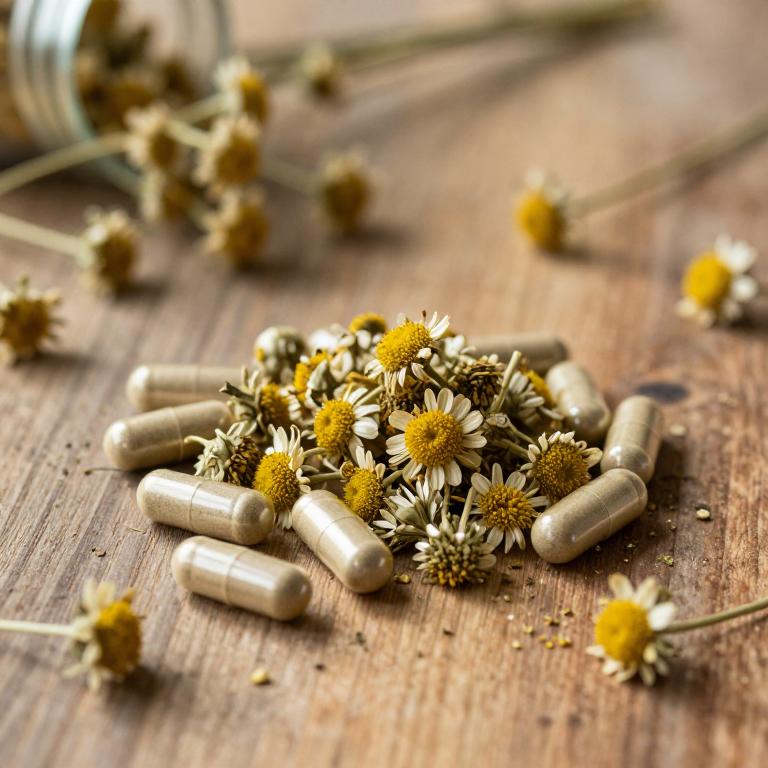
Chamomilla recutita herbal capsules are used to support digestive health by alleviating symptoms of gastrointestinal discomfort such as bloating, gas, and indigestion.
These capsules are also commonly used to promote relaxation and improve sleep quality due to the calming effects of chamomile's active compounds, such as apigenin. Their anti-inflammatory and antispasmodic properties make them beneficial for managing conditions like irritable bowel syndrome (IBS) and menstrual cramps. Additionally, chamomilla recutita is often incorporated into natural remedies for reducing stress and anxiety, thanks to its mild sedative effects.
Overall, these herbal capsules are valued for their versatile therapeutic applications and gentle nature, making them a popular choice for holistic health practices.
30. Black elderberry (Sambucus nigra)
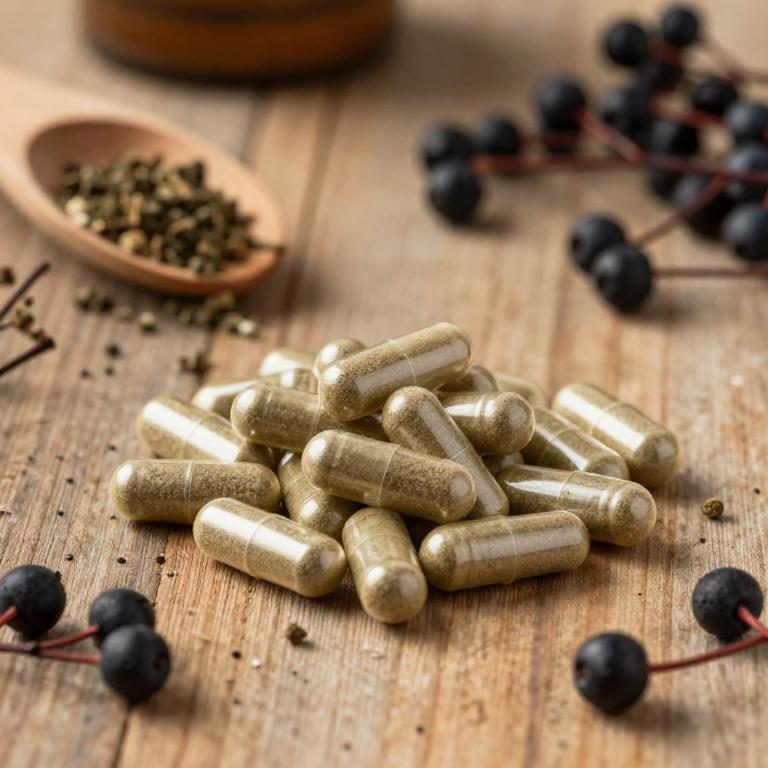
Sambucus nigra herbal capsules are used to support immune function and alleviate symptoms of the common cold and flu.
They contain compounds like flavonoids and antioxidants that may help reduce inflammation and strengthen the body's defenses against viral infections. These capsules are also believed to promote respiratory health by soothing coughs and easing congestion. Additionally, they are sometimes used to support cardiovascular health due to their potential to lower cholesterol and improve blood flow.
The combination of these properties makes sambucus nigra a popular choice for those seeking natural remedies for seasonal illnesses and immune support.
31. Black cohosh (Cimicifuga racemosa)
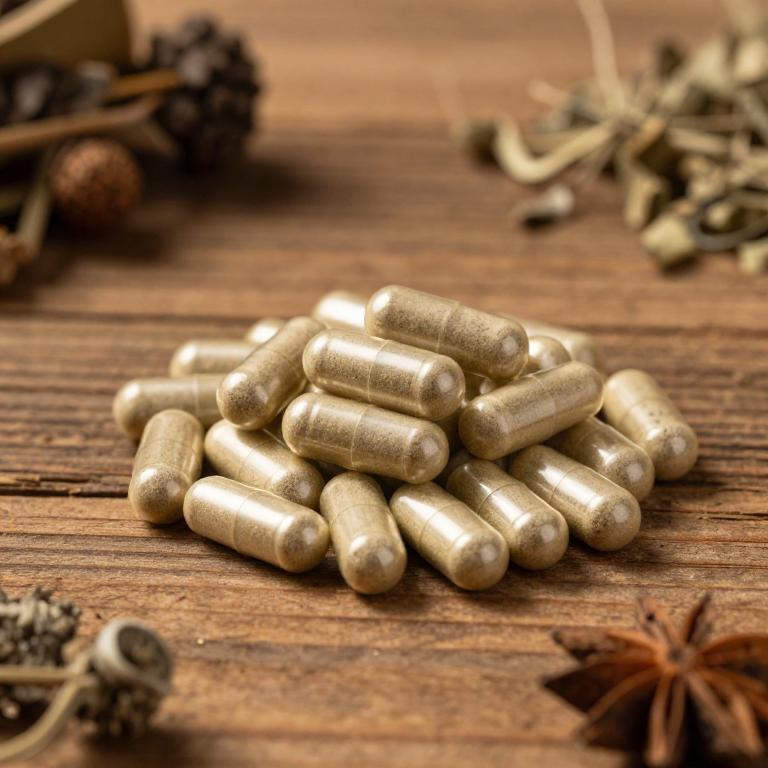
Cimicifuga racemosa herbal capsules are used to support hormonal balance, particularly in women experiencing menopausal symptoms such as hot flashes, night sweats, and mood swings.
They contain compounds that may help regulate estrogen activity in the body, offering a natural alternative to conventional hormone replacement therapy. These capsules are also known to alleviate menstrual discomfort, including cramps and irritability, due to their phytoestrogen content. Their adaptogenic properties may enhance overall well-being by reducing stress and promoting emotional stability.
As a result, cimicifuga racemosa herbal capsules are increasingly sought after for their potential to address hormonal imbalances and improve quality of life.
32. Marigold (Calendula officinalis)
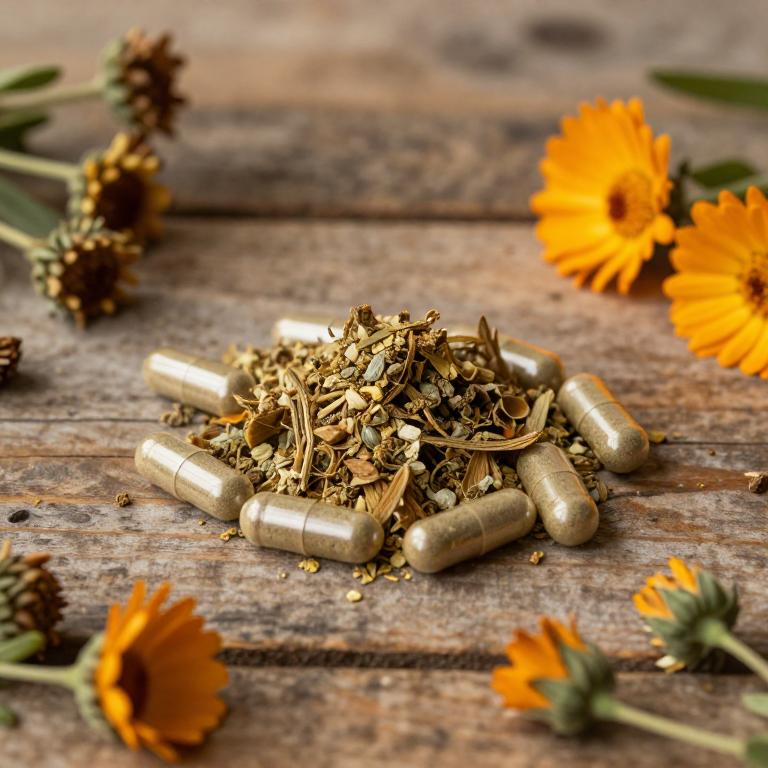
Calendula officinalis herbal capsules are used to support skin health and promote wound healing due to their anti-inflammatory and antimicrobial properties.
They are commonly incorporated into topical formulations to treat minor skin irritations, eczema, and dermatitis by reducing redness and soothing inflammation. These capsules are also used to aid in digestive health, as calendula has been shown to soothe the gastrointestinal tract and alleviate symptoms of indigestion or inflammation. Additionally, calendula officinalis is valued for its potential antioxidant effects, which may help protect cells from oxidative stress.
Overall, the versatility of calendula officinalis herbal capsules makes them a popular choice in both traditional and modern herbal medicine for a range of therapeutic applications.
33. Valerian (Valeriana officinalis)
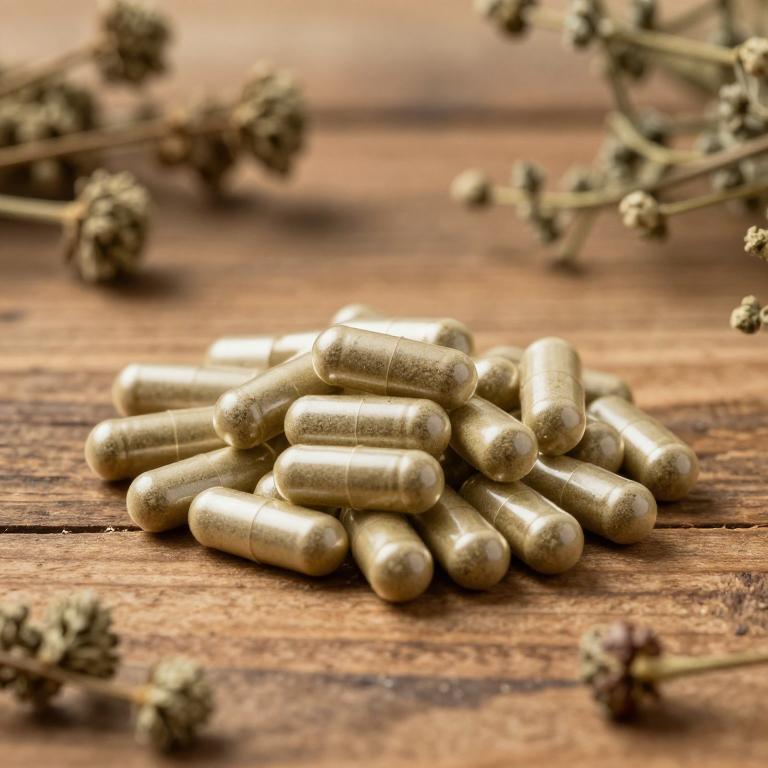
Valeriana officinalis herbal capsules are used to promote relaxation and improve sleep quality by acting as a natural sedative.
They are commonly recommended for individuals suffering from insomnia or restless sleep due to their calming effects on the nervous system. These capsules may also help reduce anxiety and stress, making them a popular choice for those seeking natural remedies for mental wellness. The active compounds in valeriana officinalis, such as valerenic acid, contribute to its ability to modulate neurotransmitter activity.
Overall, valeriana officinalis herbal capsules are valued for their potential to support emotional balance and enhance restful sleep without the side effects associated with pharmaceutical sedatives.
34. Centella (Centella asiatica)
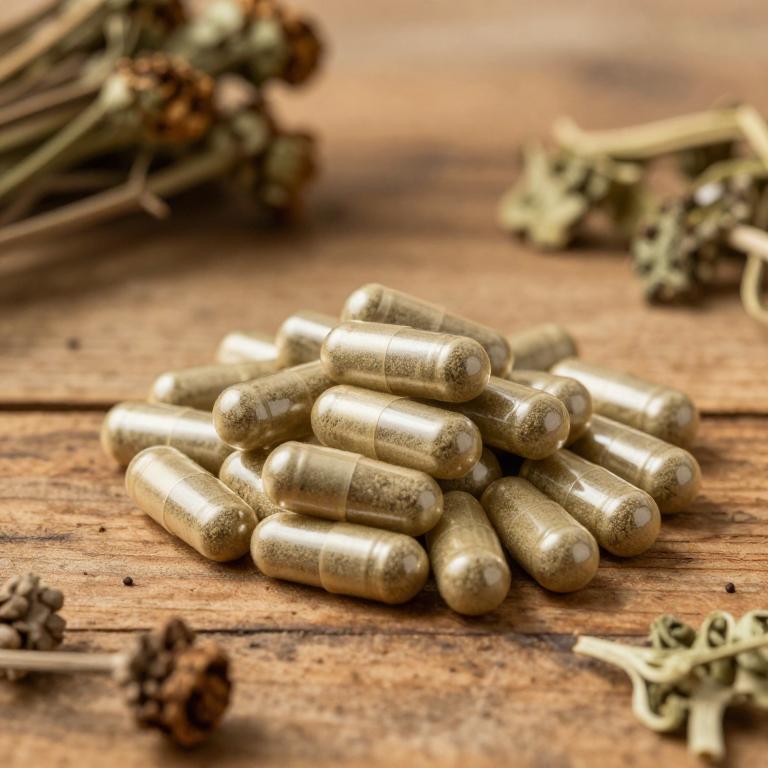
Centella asiatica herbal capsules are used to promote skin health and wound healing due to their rich content of active compounds like asiatic acid and madecassol.
These compounds are known to stimulate collagen production, enhance skin elasticity, and reduce the appearance of scars, making them beneficial for individuals with acne, burns, or surgical scars. Additionally, centella asiatica is valued for its ability to improve circulation and reduce inflammation, which can support overall skin rejuvenation and vitality. The capsules are also popular in traditional medicine for their calming effects on the nervous system, aiding in stress relief and cognitive function.
Due to these diverse benefits, centella asiatica herbal capsules are increasingly sought after for their natural, holistic approach to health and wellness.
35. White water lily (Nymphaea alba)
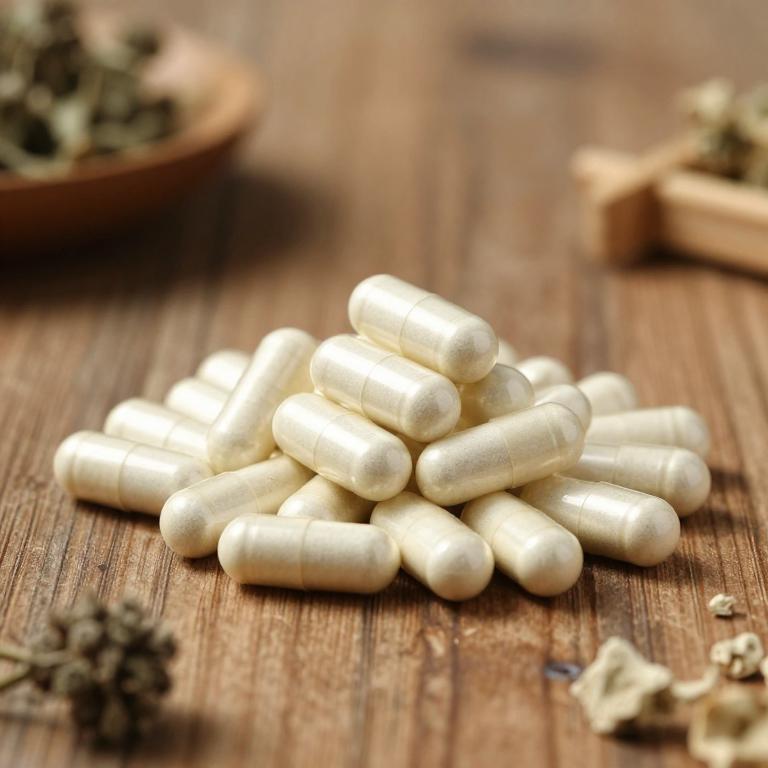
Nymphaea alba herbal capsules are used to support respiratory health and alleviate symptoms of chronic bronchitis.
These capsules contain extracts from the white water lily, which is known for its anti-inflammatory and expectorant properties. The active compounds in nymphaea alba help to reduce mucus buildup and soothe irritated airways, making them beneficial for individuals suffering from persistent coughing or congestion. Additionally, they are valued for their calming effects, which can aid in reducing stress-related respiratory issues.
Due to their natural composition and traditional use in herbal medicine, nymphaea alba herbal capsules are considered a safe and effective option for those seeking alternative remedies for respiratory conditions.
36. Black cumin (Nigella sativa)
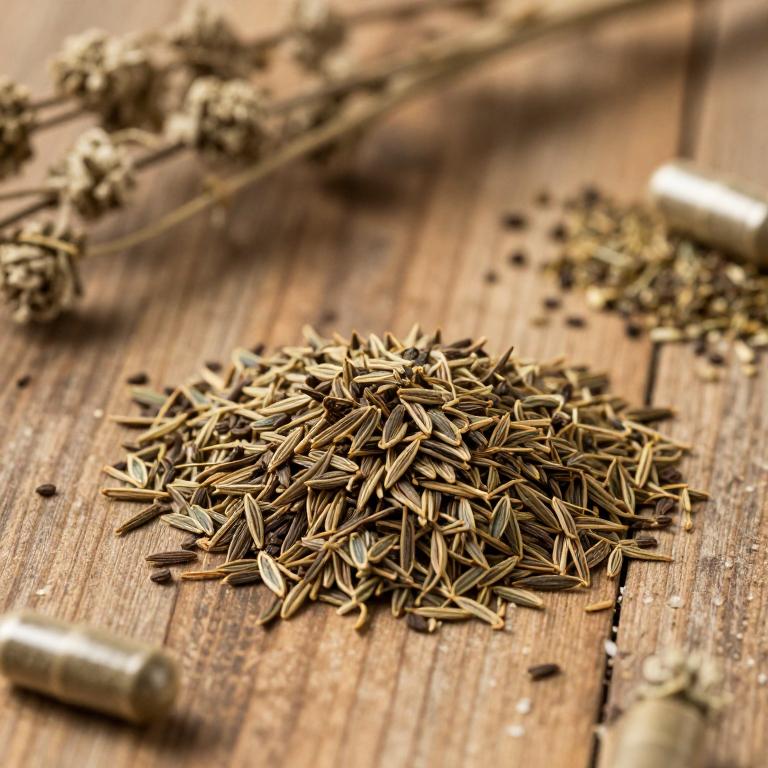
Nigella sativa herbal capsules are used to support digestive health by promoting healthy gut function and reducing inflammation in the gastrointestinal tract.
They are also commonly used to enhance immune system function due to their high concentration of bioactive compounds, such as thymoquinone, which have antimicrobial and antioxidant properties. These capsules may help alleviate symptoms of respiratory conditions like asthma and cough by reducing airway inflammation and improving lung function. Additionally, they are used to manage blood sugar levels and improve insulin sensitivity, making them beneficial for individuals with diabetes.
Overall, nigella sativa herbal capsules are valued for their wide range of therapeutic benefits and natural approach to wellness.
37. Red sage (Salvia miltiorrhiza)
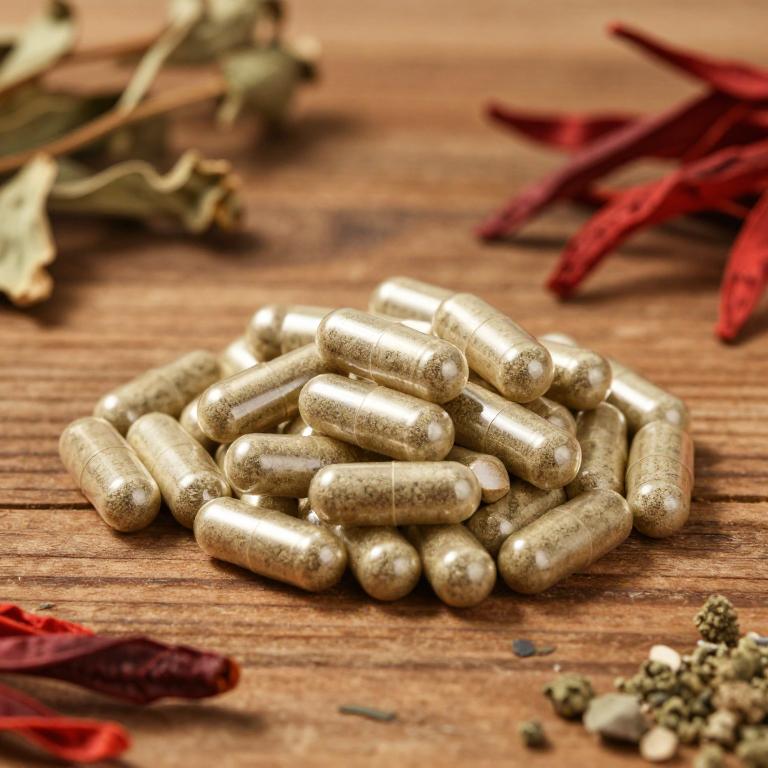
Salvia miltiorrhiza herbal capsules are used to promote cardiovascular health by improving blood circulation and reducing oxidative stress.
They are also utilized to support liver function and protect against liver damage due to their antioxidant and anti-inflammatory properties. These capsules may help in managing conditions such as high cholesterol and hypertension by regulating lipid metabolism. Additionally, they are often taken to enhance blood flow to the extremities, which can alleviate symptoms of poor circulation and cold hands or feet.
Their traditional use in Chinese medicine highlights their potential in preventing and treating various chronic diseases through natural means.
38. Anise (Pimpinella anisum)
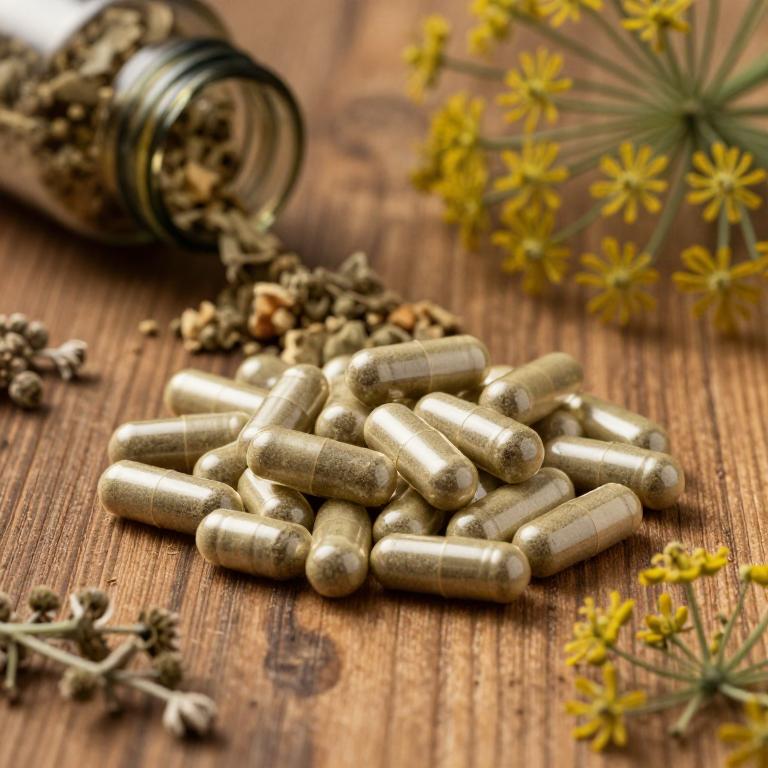
Pimpinella anisum herbal capsules are used to support digestive health by relieving symptoms such as bloating, gas, and indigestion.
These capsules contain anise seeds, which are known for their carminative properties that help ease gastrointestinal discomfort. They are also valued for their ability to promote the secretion of digestive enzymes, enhancing the breakdown of food and improving nutrient absorption. Additionally, the aromatic compounds in anise may help soothe the respiratory system, making these capsules beneficial for coughs and mild bronchial issues.
Overall, pimpinella anisum herbal capsules are a natural remedy that supports both digestive and respiratory wellness.
39. Ceylon cinnamon (Cinnamomum zeylanicum)
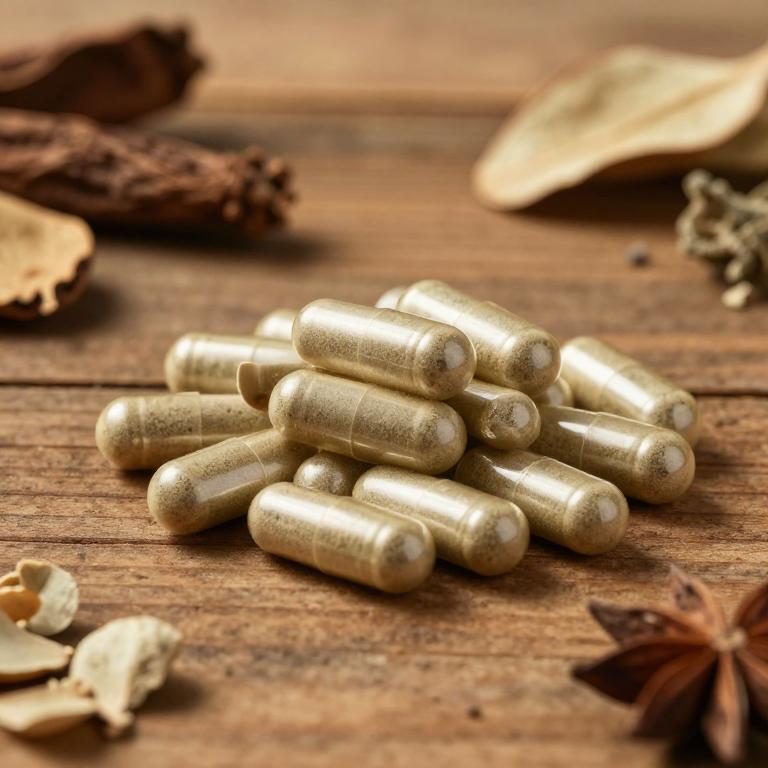
Cinnamomum zeylanicum herbal capsules are used to support digestive health by promoting the secretion of digestive enzymes and reducing bloating.
They are also utilized to help manage blood sugar levels due to their potential to improve insulin sensitivity. These capsules may aid in reducing inflammation and alleviating symptoms of conditions like arthritis and inflammatory bowel disease. Additionally, they are often taken to enhance mental clarity and reduce stress because of their calming effects on the nervous system.
The versatility of Cinnamomum zeylanicum makes it a popular choice in herbal medicine for its wide range of health benefits.
40. Ashwagandha (Withania somnifera)
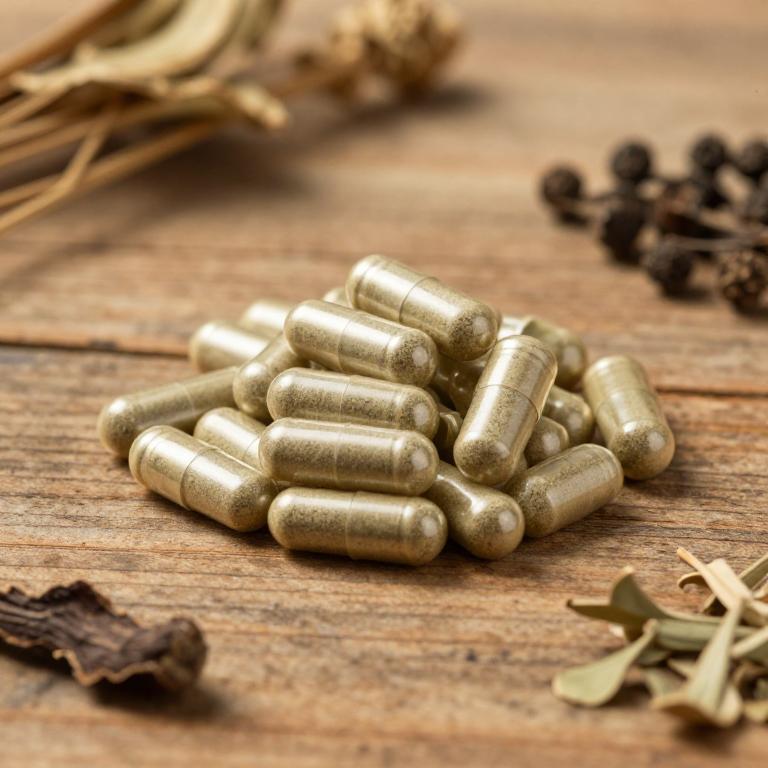
Withania somnifera herbal capsules are used to support overall wellness and promote balance in the body by enhancing vitality and reducing stress.
They are commonly used to alleviate symptoms of anxiety and fatigue due to their adaptogenic properties, which help the body cope with physical and emotional stress. These capsules are also beneficial for improving sleep quality and supporting the immune system, making them a popular choice for those seeking natural health solutions. Their active compounds, such as withanolides, contribute to their therapeutic effects by modulating various physiological processes.
Overall, withania somnifera herbal capsules are valued for their holistic benefits and are often incorporated into daily routines for long-term health maintenance.
41. Bacopa (Bacopa monnieri)
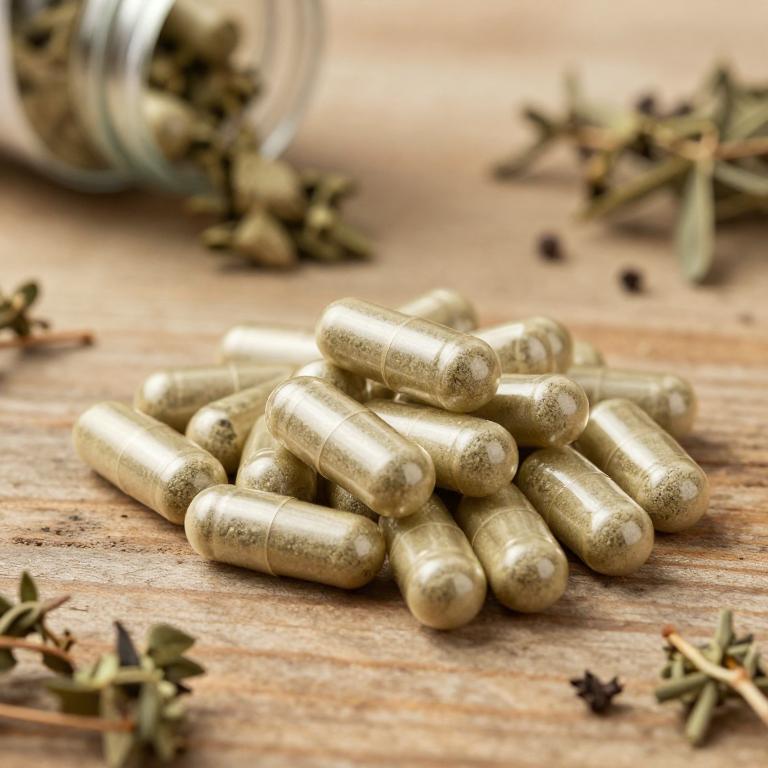
Bacopa monnieri herbal capsules are used to enhance cognitive function and memory retention, making them popular among students and professionals seeking mental clarity.
These capsules contain compounds like bacosides, which are believed to support neural communication and protect brain cells from oxidative stress. They are also used to reduce anxiety and improve mood, contributing to overall mental well-being. Due to their adaptogenic properties, bacopa monnieri capsules are often recommended for stress management and to promote a sense of calm.
Because of these benefits, they are increasingly incorporated into natural health supplements aimed at boosting brain health and performance.
42. Golden root (Rhodiola rosea)
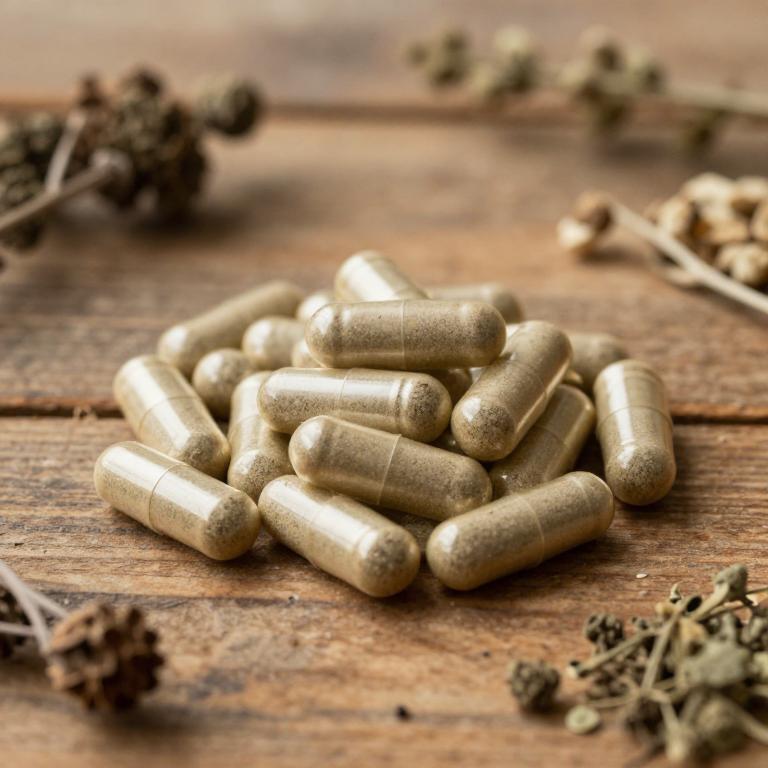
Rhodiola rosea herbal capsules are used to enhance physical and mental performance by supporting energy levels and reducing fatigue.
They are particularly beneficial for individuals experiencing stress, as they help the body adapt to physical and emotional challenges through their adaptogenic properties. These capsules may also support cognitive function, improving focus, concentration, and memory, making them popular among students and professionals. Additionally, rhodiola rosea is believed to have antioxidant properties that may protect cells from damage and promote overall wellness.
Due to their natural composition and potential health benefits, these capsules are increasingly being incorporated into holistic health regimens.
43. European plum (Prunus domestica)
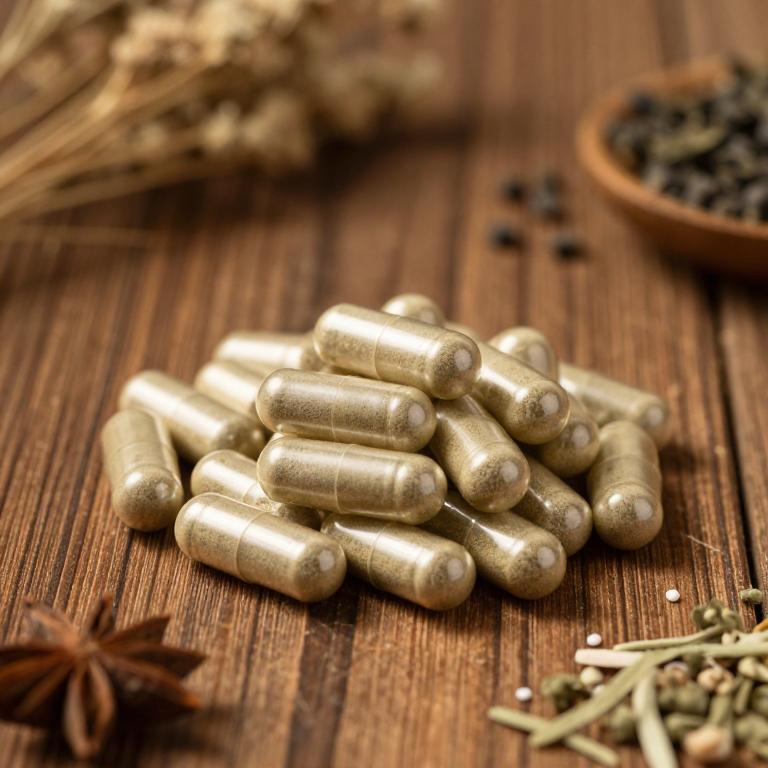
Prunus domestica herbal capsules are used to support digestive health due to their high content of fiber and polyphenols, which can aid in regular bowel movements and promote a healthy gut microbiome.
These capsules are also valued for their potential anti-inflammatory properties, which may help reduce symptoms of conditions like irritable bowel syndrome (IBS) and inflammatory bowel disease (IBD). Additionally, they are often consumed for their antioxidant benefits, which can help neutralize free radicals and support overall immune function. The natural compounds in prunus domestica, such as chlorogenic acid and flavonoids, contribute to its reputation as a natural remedy for digestive and metabolic support.
Because of these benefits, prunus domestica herbal capsules are increasingly popular as a dietary supplement for those seeking natural ways to enhance gut health and overall wellness.
44. Kava (Piper methysticum)
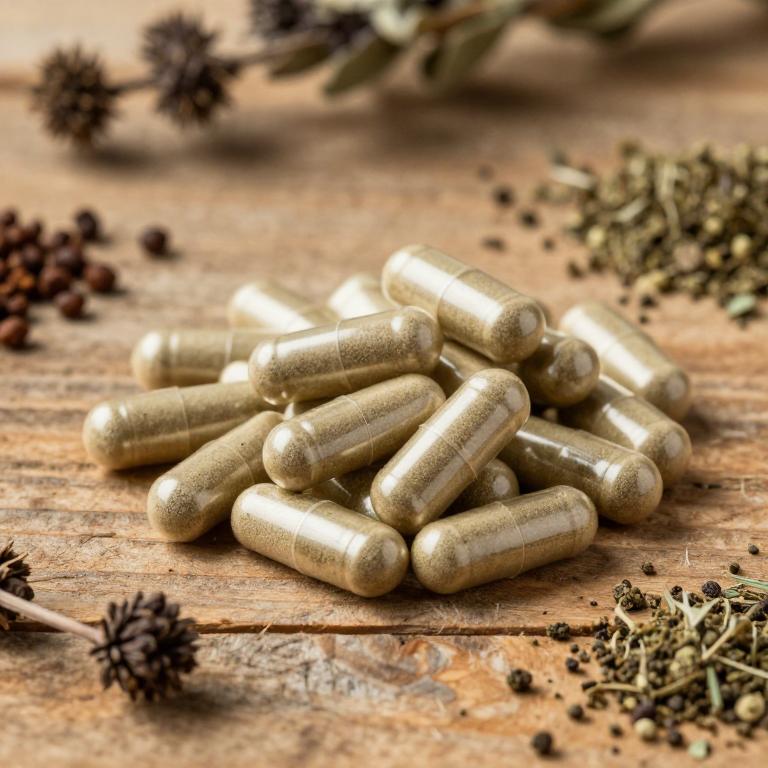
Piper methysticum herbal capsules are used to support emotional well-being and reduce stress by promoting a sense of calm and relaxation.
These capsules contain kava extract, which is known for its mild sedative properties that can help alleviate anxiety and improve sleep quality. They are also used to enhance social interactions and reduce feelings of agitation, making them popular in cultural and recreational settings. The natural compounds in piper methysticum may help regulate neurotransmitters, contributing to mood stabilization.
However, it is important to use these capsules responsibly and consult a healthcare professional to ensure safe and effective use.
45. Lemon balm (Melissa officinalis)
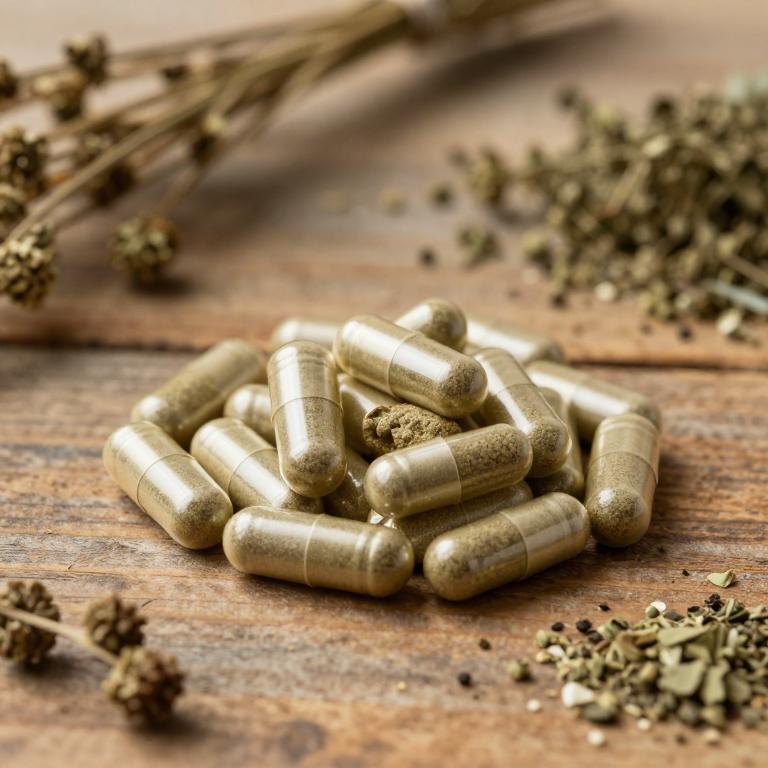
Melissa officinalis herbal capsules are used to support digestive health by promoting the secretion of digestive enzymes and reducing gastrointestinal discomfort.
They are also known to help alleviate symptoms of anxiety and stress due to their calming effects on the nervous system. These capsules may aid in improving sleep quality by regulating the body's natural rhythms and promoting relaxation. Additionally, melissa officinalis is often used to support respiratory health by easing symptoms of coughs and sore throats.
Because of their adaptogenic properties, these capsules are valued for their ability to help the body manage stress and maintain overall well-being.
46. Common mallow (Symphytum officinale)
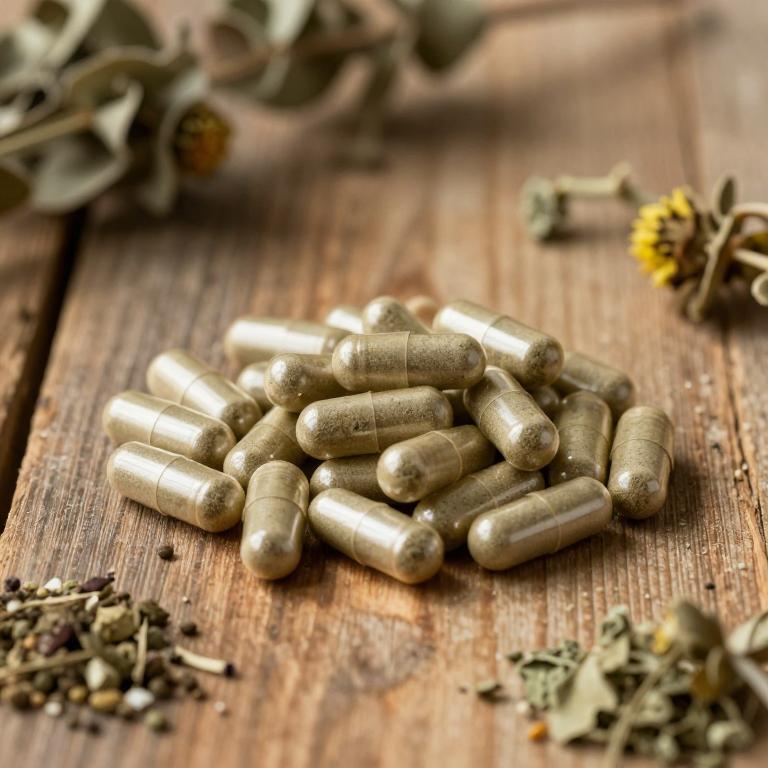
Symphytum officinale herbal capsules are used to support bone health and accelerate the healing of fractures and bruises.
They contain compounds like allantoin and mucilage, which have anti-inflammatory and regenerative properties that promote tissue repair. These capsules are also valued for their potential to alleviate symptoms of osteoarthritis and joint pain by reducing inflammation and improving mobility. Due to their natural composition, they are often preferred by individuals seeking alternative or complementary therapies.
Their effectiveness is supported by traditional use and growing scientific interest in their therapeutic benefits.
47. Maca (Lepidium meyenii)
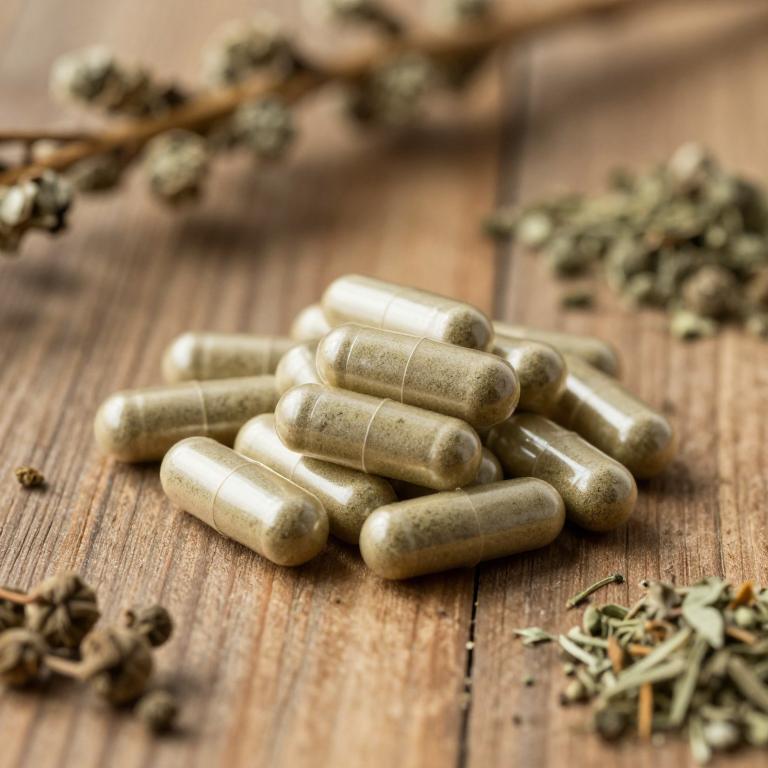
Lepidium meyenii herbal capsules are used to support digestive health and promote nutrient absorption due to their high content of essential nutrients and bioactive compounds.
These capsules are often taken to enhance overall vitality and energy levels, as they are rich in minerals like calcium, iron, and magnesium. They are also valued for their potential role in improving bone density and supporting immune function. Additionally, lepidium meyenii is traditionally used to alleviate symptoms of menopause and support reproductive health.
Because of these benefits, they are increasingly popular as a natural supplement for those seeking holistic wellness.
48. Lemon grass (Cymbopogon citratus)
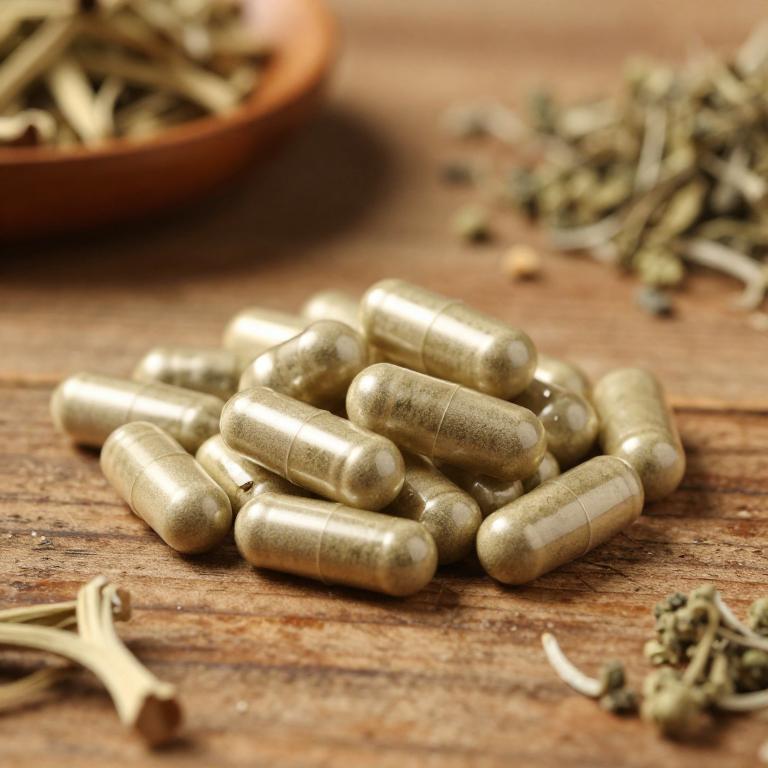
Cymbopogon citratus herbal capsules are used to support digestive health due to their natural antispasmodic and carminative properties.
These capsules help alleviate symptoms of indigestion, bloating, and gas by promoting healthy gastrointestinal function. They are also beneficial for reducing stress and anxiety, as they contain compounds that may influence the nervous system. Additionally, cymbopogon citratus is known for its antimicrobial effects, making it useful in supporting immune health.
Overall, these herbal capsules offer a natural and holistic approach to improving overall wellness and addressing common digestive and emotional concerns.
49. Maypop (Passiflora incarnata)
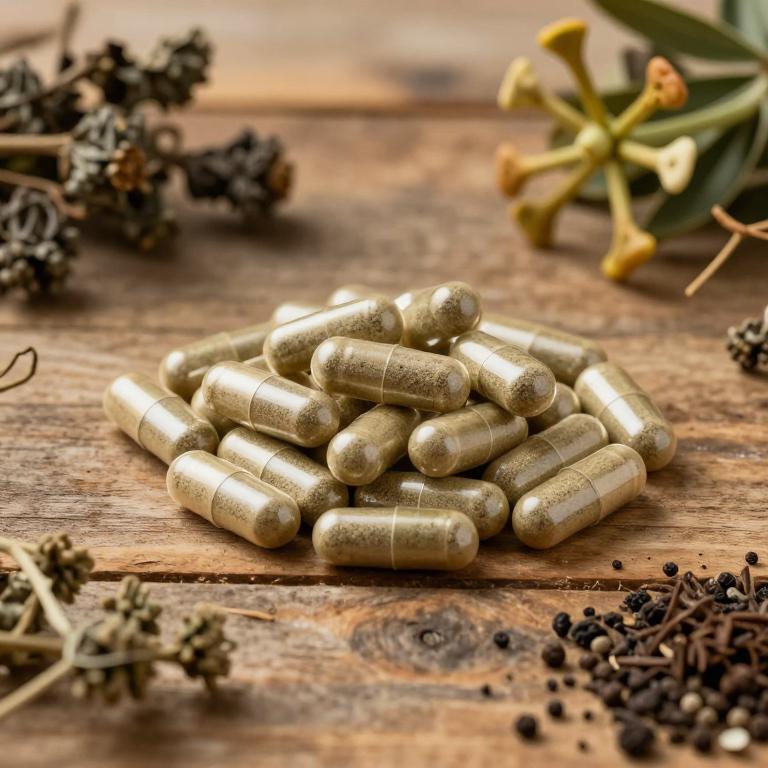
Passiflora incarnata herbal capsules are used to promote relaxation and reduce anxiety due to their calming properties.
They contain compounds such as flavonoids and harmine, which may help regulate the nervous system and alleviate stress. These capsules are often recommended for individuals experiencing mild to moderate anxiety or sleep disturbances. Their natural composition makes them a popular alternative to synthetic sedatives with fewer side effects.
Additionally, passiflora incarnata is believed to support better sleep quality by enhancing the body's ability to relax and transition into restful sleep.
50. Heartworts (Leonurus cardiaca)
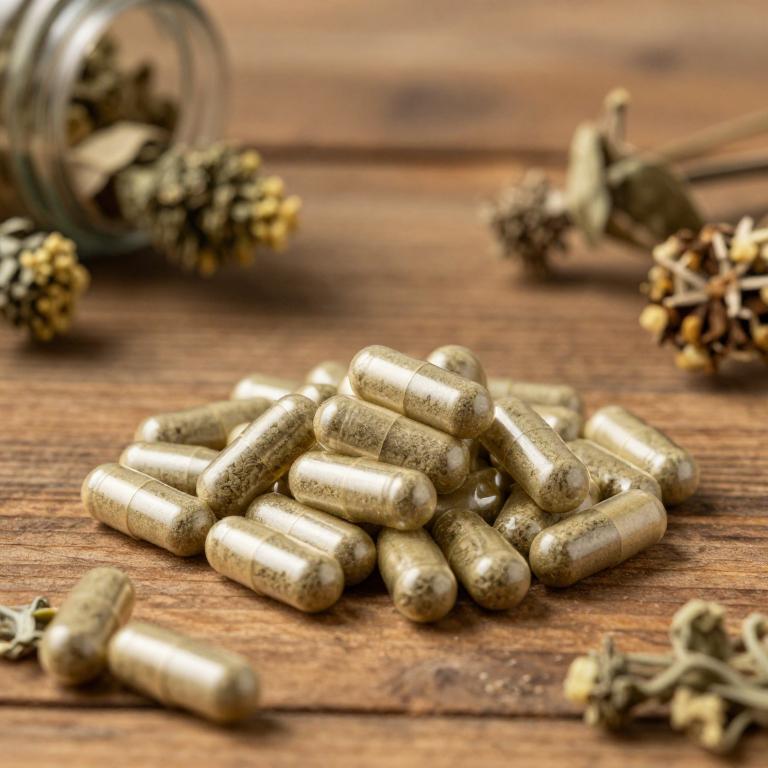
Leonurus cardiaca herbal capsules are used to support cardiovascular health by improving blood circulation and reducing symptoms of heart-related conditions.
They contain compounds that may help lower blood pressure and strengthen the heart muscle, making them beneficial for individuals with hypertension or weak cardiac function. These capsules are also believed to have antioxidant properties that protect the heart from oxidative stress and damage. Due to their traditional use in herbal medicine, they are often recommended as a complementary therapy alongside conventional treatments.
However, it is important to consult a healthcare professional before using them, especially for those with existing medical conditions or taking other medications.
51. Puncture vine (Tribulus terrestris)
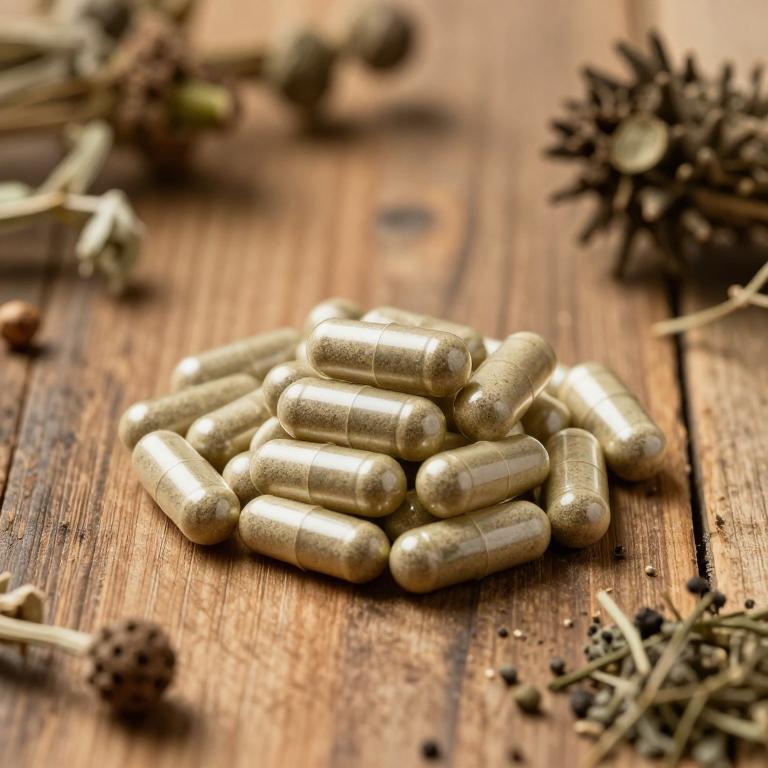
Tribulus terrestris herbal capsules are used to enhance athletic performance and boost energy levels due to their potential to increase testosterone production.
They are also commonly taken to support sexual health and improve libido in both men and women. These capsules may help with muscle growth and recovery by promoting protein synthesis and reducing fatigue. Additionally, they are believed to have antioxidant properties that can support overall health and well-being.
However, it is important to consult a healthcare professional before starting any supplement regimen to ensure safety and appropriateness for individual needs.
52. Bloodroot (Sanguinaria canadensis)
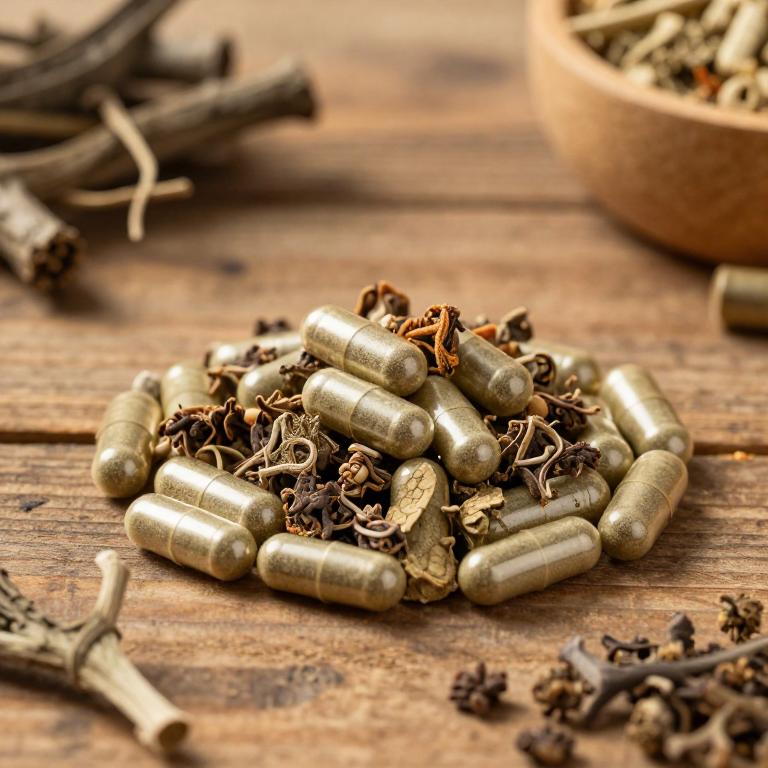
Sanguinaria canadensis herbal capsules are used to support respiratory health by helping to relieve symptoms of coughs and colds due to their expectorant properties.
These capsules are also known to have anti-inflammatory effects, which can aid in reducing inflammation in the respiratory tract. Additionally, they are sometimes used in traditional medicine to promote skin health and treat minor wounds because of their astringent properties. The alkaloids present in sanguinaria canadensis may contribute to its ability to enhance circulation and reduce pain.
However, it is important to note that these capsules should be used with caution and under the guidance of a healthcare professional, as they can have potential side effects and interactions with other medications.
53. Oregano (Origanum vulgare)
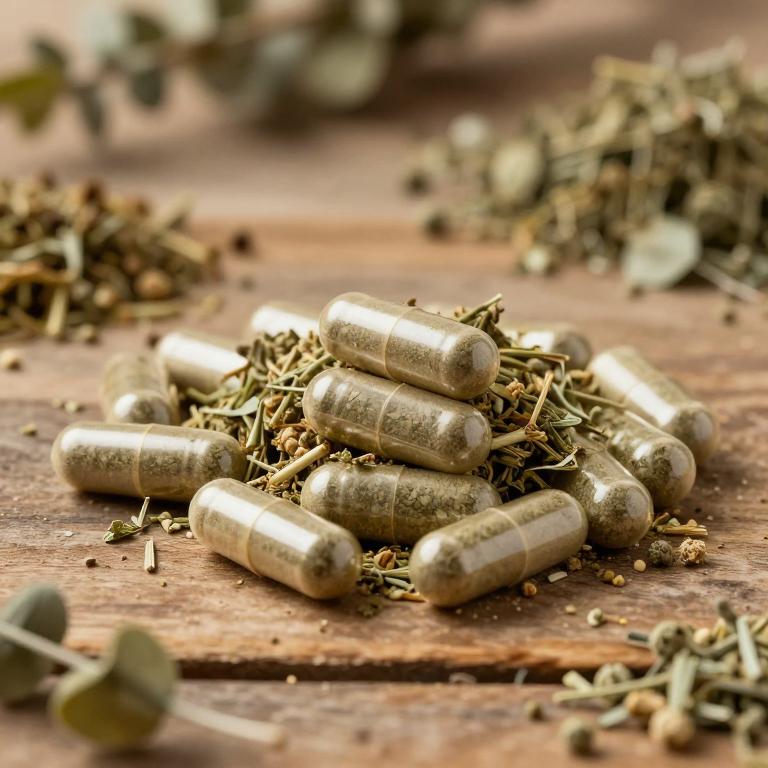
Origanum vulgare herbal capsules are used to support digestive health by promoting the secretion of digestive enzymes and reducing bloating and gas.
They are also commonly used to alleviate symptoms of indigestion and nausea due to their carminative properties. The essential oils in oregano, such as thymol and carvacrol, contribute to their antimicrobial effects, making them useful in fighting harmful bacteria in the gut. Additionally, these capsules may help reduce inflammation and support immune function, thanks to their high concentration of antioxidants.
Overall, origanum vulgare herbal capsules are valued for their natural therapeutic properties and versatility in addressing various health concerns.
54. Indian barberry (Berberis aristata)
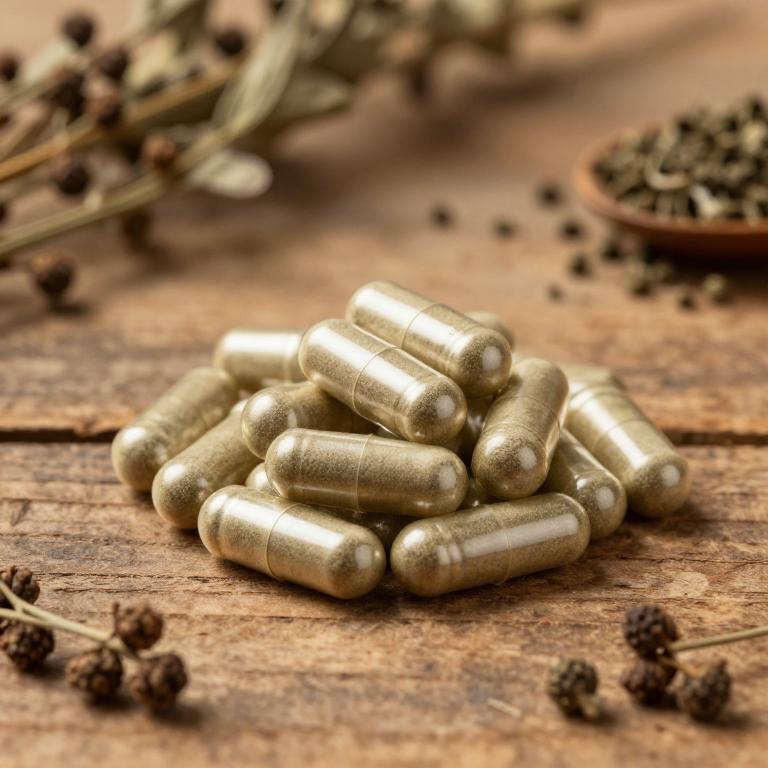
Berberis aristata herbal capsules are used to support digestive health by promoting healthy gut function and reducing inflammation in the gastrointestinal tract.
They contain berberine, a potent alkaloid known for its antimicrobial and anti-inflammatory properties, which can help alleviate symptoms of conditions like irritable bowel syndrome and inflammatory bowel disease. These capsules are also beneficial for managing blood sugar levels due to berberine's ability to improve insulin sensitivity and reduce glucose absorption. Additionally, they are used to enhance liver function and detoxification processes in the body.
Because of their natural composition and wide range of health benefits, berberis aristata herbal capsules are a popular choice for those seeking holistic and supportive treatment options.
55. Indian frankincense (Boswellia serrata)
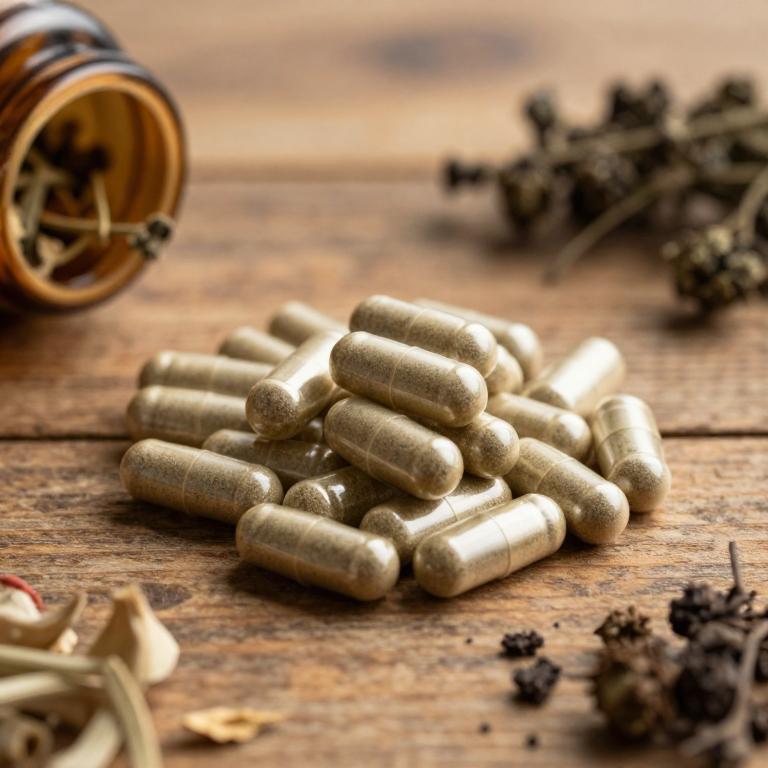
Boswellia serrata herbal capsules are used to support joint health and reduce inflammation, particularly in conditions like osteoarthritis.
They contain active compounds called boswellic acids, which have been shown to inhibit inflammatory responses in the body. These capsules are also valued for their potential to alleviate symptoms of chronic inflammation and improve mobility in affected individuals. Due to their natural origin and generally mild side effect profile, they are a popular choice for those seeking alternative or complementary therapies.
Overall, boswellia serrata herbal capsules are increasingly recognized for their role in promoting overall wellness and managing inflammatory conditions.
56. Dandelion (Taraxacum officinale)
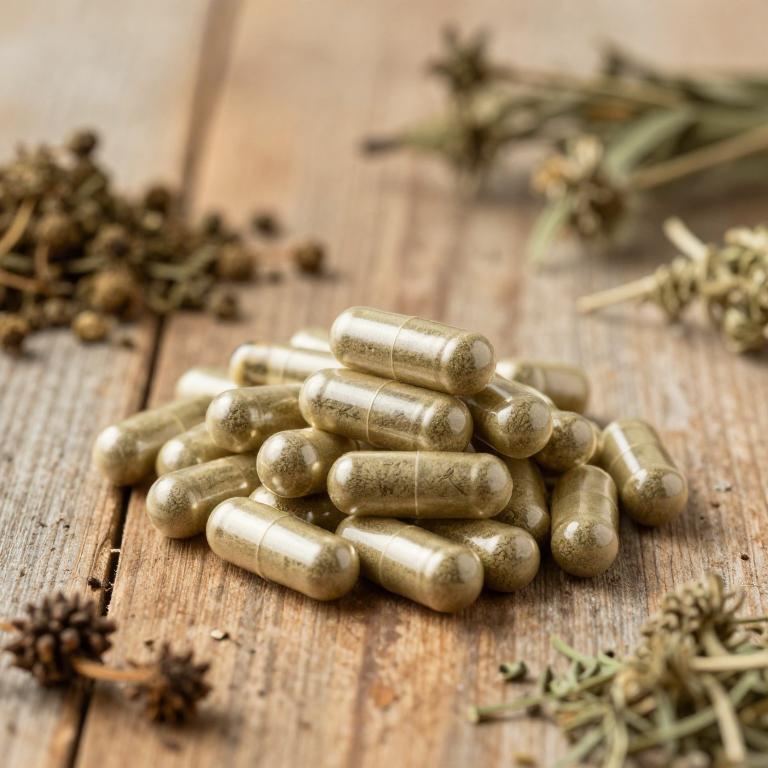
Taraxacum officinale herbal capsules are used to support digestive health and promote detoxification in the body.
These capsules contain the active compounds found in dandelion root, which can help stimulate bile production and improve liver function. They are also beneficial for individuals experiencing mild digestive issues such as bloating or indigestion. Additionally, they may aid in weight management by enhancing metabolic processes and reducing water retention.
Due to their natural composition and potential health benefits, taraxacum officinale herbal capsules are a popular choice for those seeking natural remedies for digestive and detox-related concerns.
57. Buckwheat (Plantago ovata)
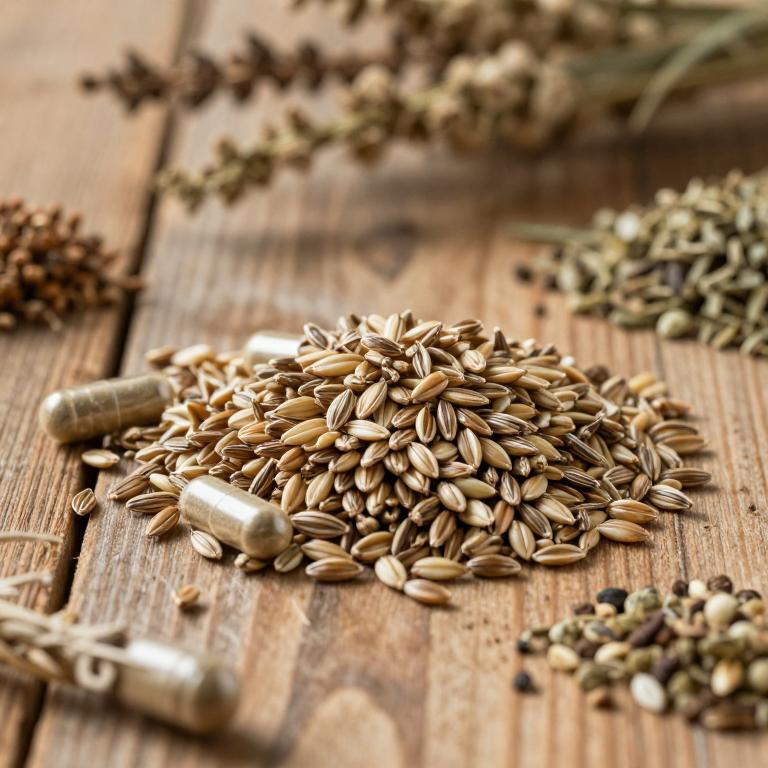
Plantago ovata herbal capsules are used to support digestive health and promote regular bowel movements due to their high content of soluble fiber.
These capsules are particularly beneficial for individuals experiencing constipation, as the fiber absorbs water and helps soften stool, making it easier to pass. Additionally, they may aid in maintaining a healthy gut environment by supporting the balance of intestinal bacteria. The natural and gentle nature of plantago ovata makes it a preferred choice for those seeking a non-pharmacological approach to digestive wellness.
Overall, these capsules are valued for their ability to enhance digestive function without causing significant side effects.
58. Parsley (Petroselinum crispum)
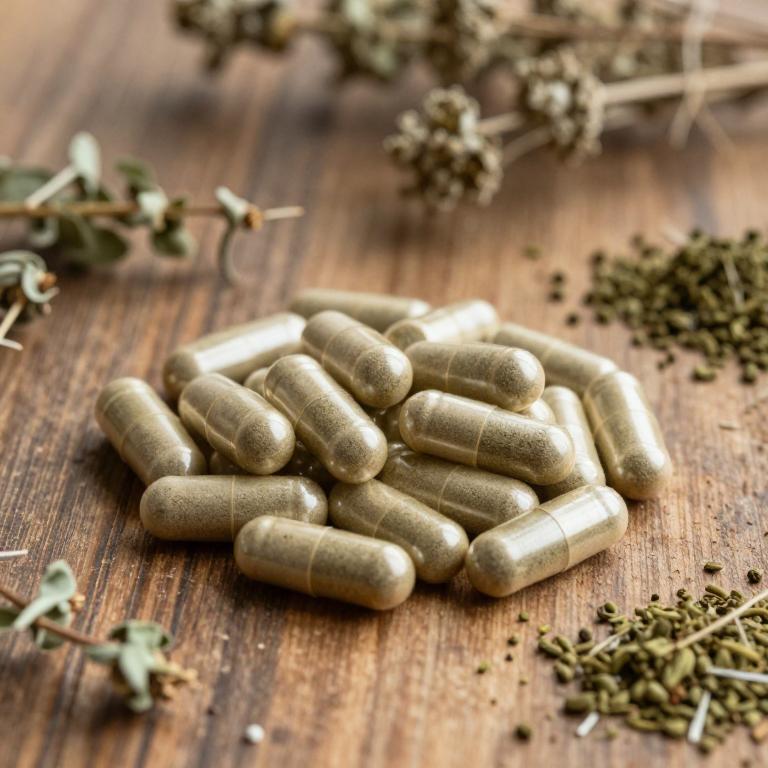
Petroselinum crispum herbal capsules are used to support digestive health by promoting the production of digestive enzymes and reducing bloating and gas.
They are also known to aid in detoxification processes by supporting liver function and helping the body eliminate toxins more efficiently. These capsules may help alleviate symptoms of respiratory conditions such as bronchitis and coughs due to their expectorant properties. Additionally, petroselinum crispum is rich in antioxidants, which can help protect cells from oxidative stress and boost the immune system.
Overall, these herbal capsules are valued for their natural ability to enhance overall wellness and support the body’s natural healing processes.
59. False leaf (Phyllanthus amarus)
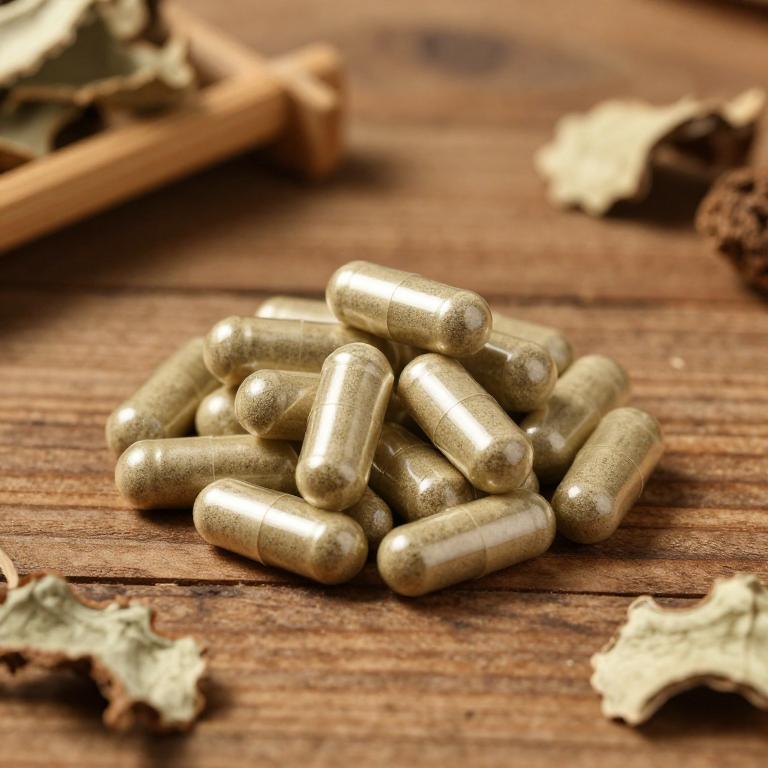
Phyllanthus amarus herbal capsules are used to support liver health and detoxification by promoting the regeneration of liver cells and enhancing metabolic functions.
They are also utilized to aid in the management of diabetes due to their potential to improve insulin sensitivity and regulate blood sugar levels. These capsules may help reduce inflammation and oxidative stress in the body, contributing to overall wellness. Additionally, they are often taken to support kidney function and may assist in the treatment of urinary tract infections.
The use of phyllanthus amarus herbal capsules is rooted in traditional medicine and is increasingly supported by modern scientific research for their wide-ranging therapeutic benefits.
60. Horse radish (Cnidium monnieri)
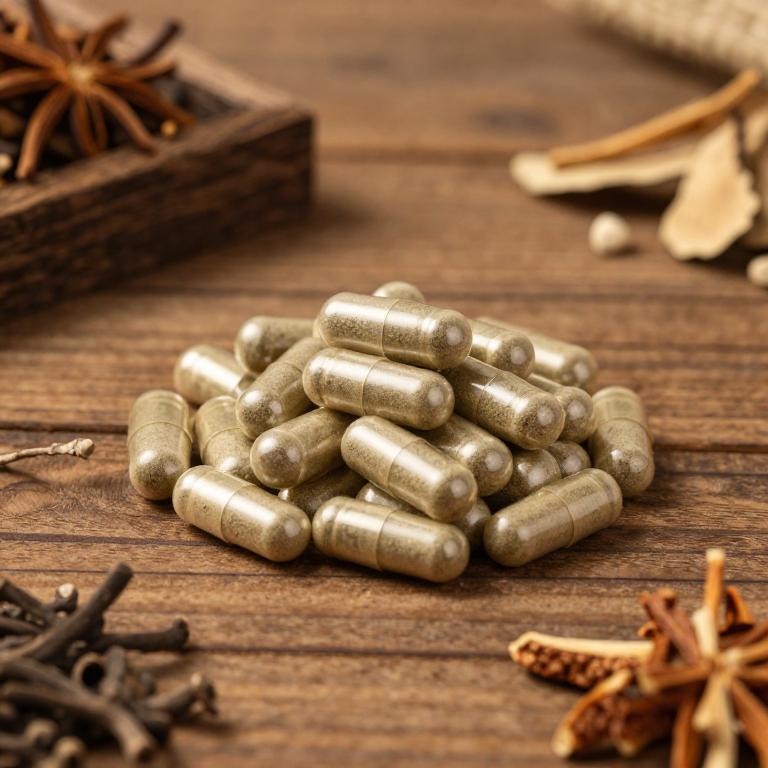
Cnidium monnieri herbal capsules are used to support men's health, particularly in enhancing sexual function and vitality.
They contain bioactive compounds such as alkaloids and flavonoids, which are believed to improve blood flow and nerve function. These capsules are also valued for their potential role in treating conditions like erectile dysfunction and low libido. Their traditional use in Chinese medicine highlights their long-standing reputation for promoting overall well-being.
Due to their natural composition and purported benefits, they are increasingly sought after as a complementary health aid.
61. Sacred lotus (Nelumbo nucifera)
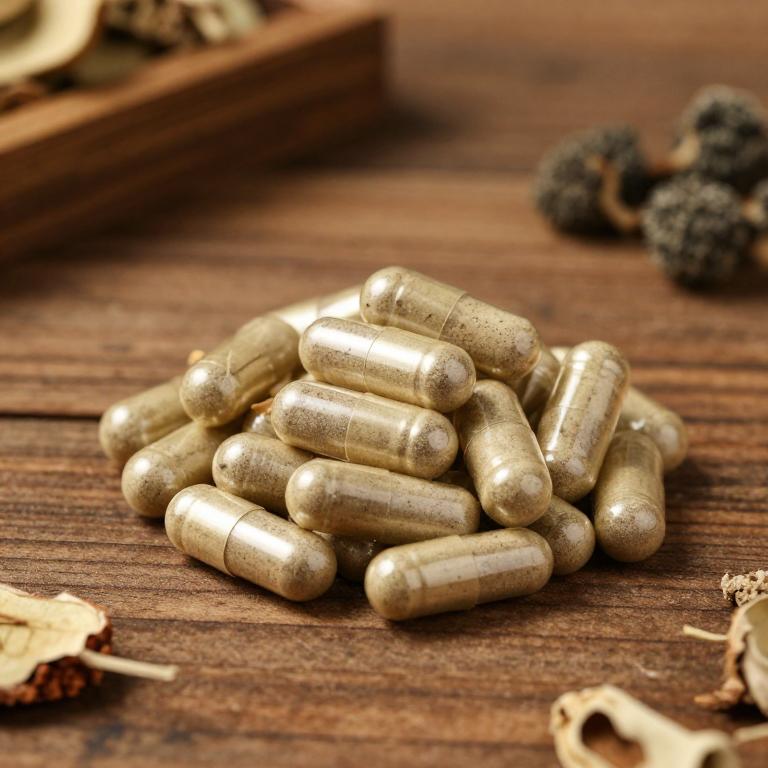
Nelumbo nucifera herbal capsules are used to support overall health and wellness through their rich content of bioactive compounds.
These capsules are particularly valued for their ability to promote cardiovascular health by helping to regulate blood pressure and improve circulation. They are also used to enhance cognitive function and reduce stress due to their calming and neuroprotective properties. Additionally, nelumbo nucifera herbal capsules are known to support digestive health by aiding in the reduction of inflammation and improving gut function.
Their versatility and natural origin make them a popular choice for individuals seeking holistic and traditional remedies for various health concerns.
62. White cedar (Thuja occidentalis)
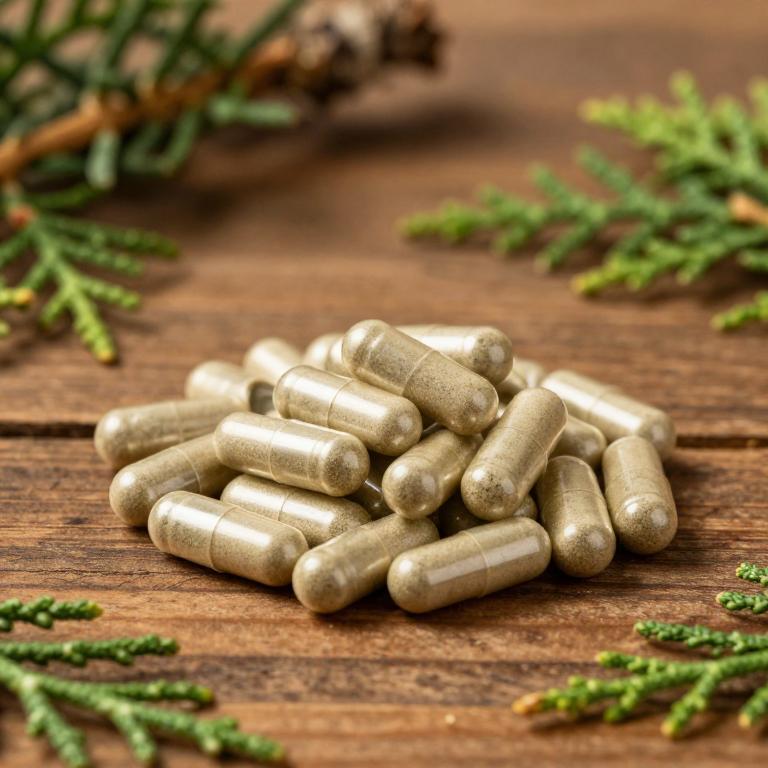
Thuja occidentalis herbal capsules are used to support immune system function and promote the body's natural defenses against infections.
These capsules are often taken to help alleviate symptoms of colds, flu, and other respiratory ailments by enhancing the body's ability to fight off pathogens. They are also utilized in alternative medicine for their potential anti-inflammatory and detoxifying properties, which may aid in skin conditions and respiratory health. The active compounds in thuja occidentalis, such as alpha-pinene and flavonoids, are believed to contribute to its therapeutic effects.
However, it is important to consult a healthcare professional before using these capsules, as they may interact with certain medications or have side effects in some individuals.
63. Sutherlandia frutescens
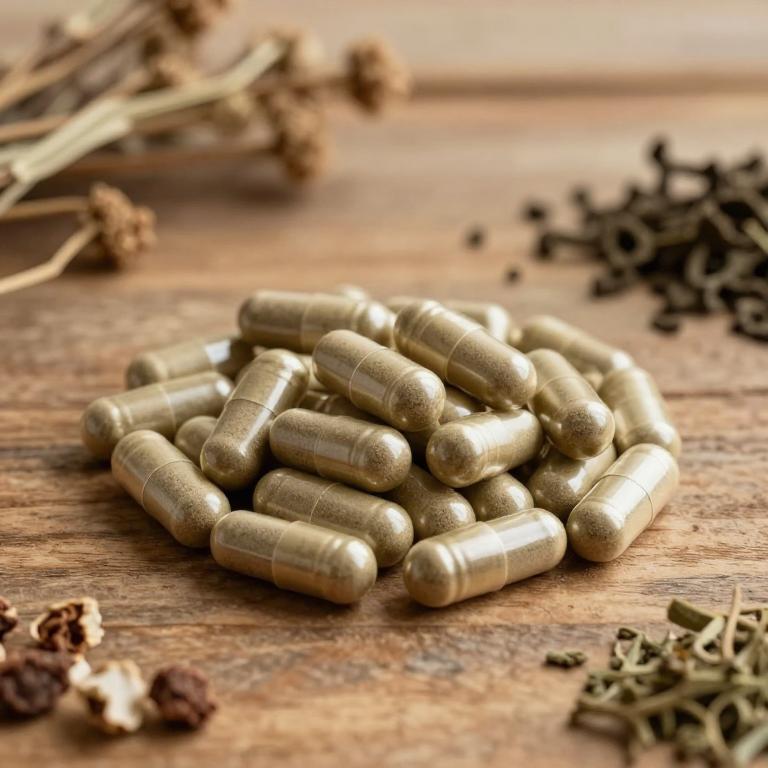
Sutherlandia frutescens herbal capsules are used to support immune function and promote overall wellness by providing essential nutrients and antioxidants.
They are often incorporated into herbal remedies to assist in managing stress and enhancing vitality, making them popular among individuals seeking natural health support. These capsules are also valued for their potential role in improving energy levels and aiding in the body's natural healing processes. Their adaptogenic properties may help the body better cope with physical and emotional challenges.
Due to these benefits, sutherlandia frutescens herbal capsules are increasingly sought after as a complementary therapy in holistic health practices.
64. Tulsi (Ocimum sanctum)
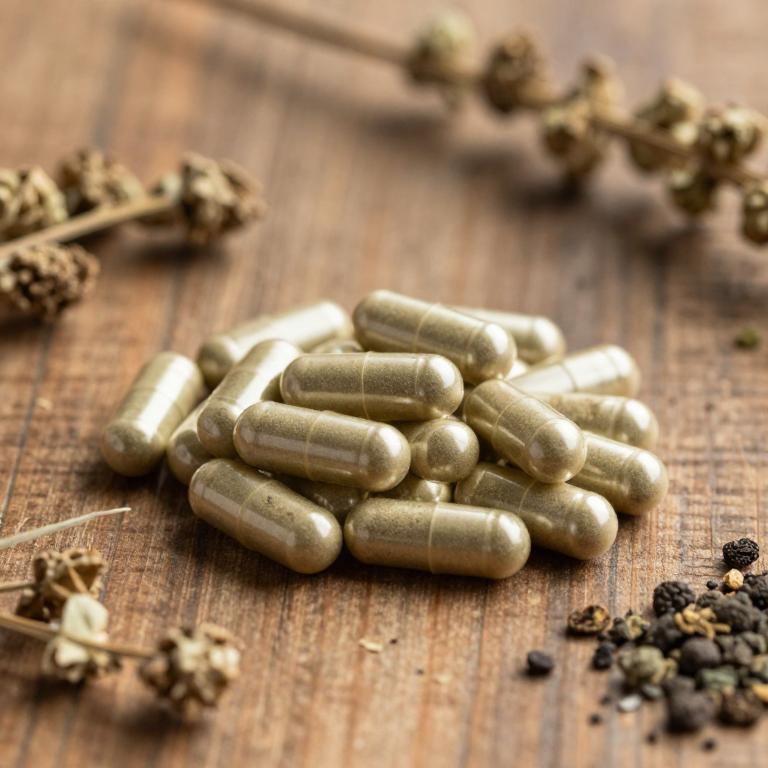
Ocimum sanctum herbal capsules are used to support overall health and well-being by promoting digestion, reducing inflammation, and boosting the immune system.
These capsules are rich in antioxidants, which help neutralize free radicals in the body, thereby protecting cells from damage. They are also known to aid in managing stress and improving respiratory function, making them beneficial for individuals with chronic cough or asthma. Additionally, ocimum sanctum has been traditionally used in Ayurvedic medicine to enhance mental clarity and reduce anxiety.
Due to their natural composition and wide range of health benefits, these capsules are increasingly popular as a complementary therapy in modern wellness practices.
65. Wormwood (Artemisia vulgaris)
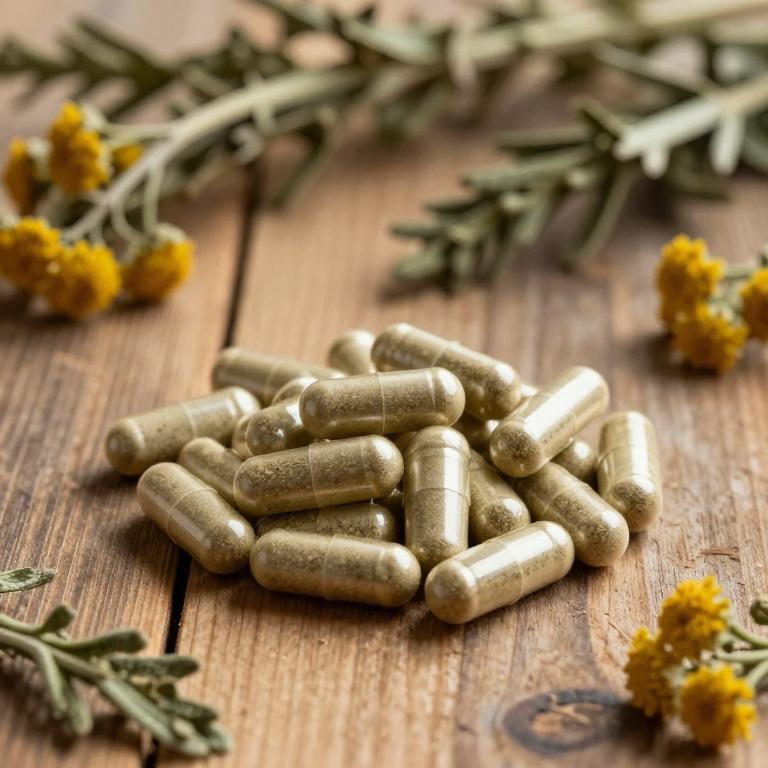
Artemisia vulgaris herbal capsules are used to support digestive health by promoting the secretion of bile and aiding in the breakdown of fats.
They are also valued for their potential anti-inflammatory and antioxidant properties, which may help in reducing inflammation and oxidative stress in the body. These capsules are commonly used to alleviate symptoms of indigestion, bloating, and gas, making them a popular choice for those seeking natural digestive support. Additionally, artemisia vulgaris has been traditionally used to assist with respiratory conditions, such as coughs and bronchitis, due to its expectorant properties.
Overall, the versatility of artemisia vulgaris herbal capsules makes them a valuable supplement for improving overall wellness and supporting various bodily functions.
66. Catnip (Nepeta cataria)
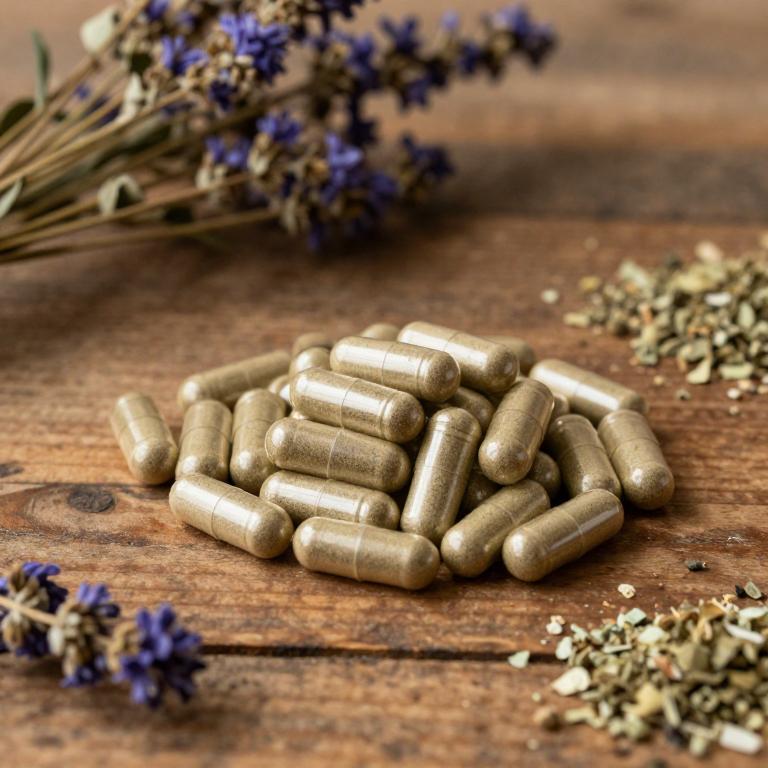
Nepeta cataria herbal capsules are used to promote relaxation and reduce anxiety due to their calming properties.
These capsules contain catnip, which has been traditionally used to ease stress and improve mood. They may also aid in improving sleep quality by helping to calm the nervous system. The active compounds in nepeta cataria, such as nepetalactone, are believed to interact with the central nervous system to produce these effects.
Because of their natural composition, these capsules are often considered a safe alternative for those seeking non-pharmacological methods to manage stress and enhance well-being.
67. Plantain (Plantago lanceolata)
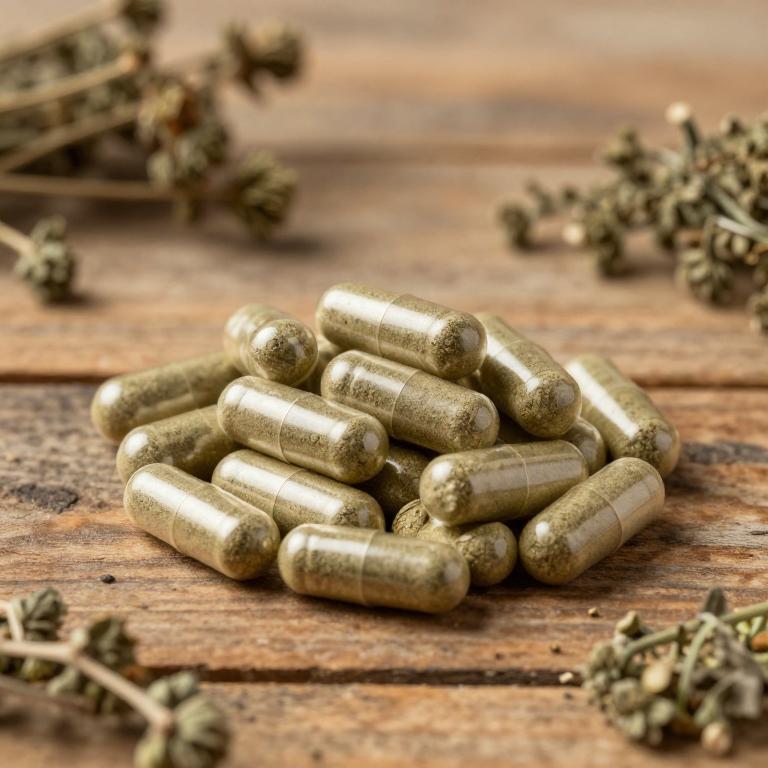
Plantago lanceolata herbal capsules are used to support respiratory health by alleviating symptoms of coughs, bronchitis, and other respiratory conditions due to their expectorant and anti-inflammatory properties.
These capsules are also beneficial for digestive health, as they can help soothe irritated mucous membranes in the gastrointestinal tract and promote the healing of ulcers. Additionally, they are often used to reduce inflammation and irritation in the urinary tract, making them a natural remedy for conditions like cystitis. The plant's high content of mucilage contributes to its soothing effects on the body's mucous membranes.
Because of these properties, plantago lanceolata herbal capsules are a popular choice for those seeking natural remedies for various inflammatory and mucous-related ailments.
68. Greek oregano (Satureja hortensis)
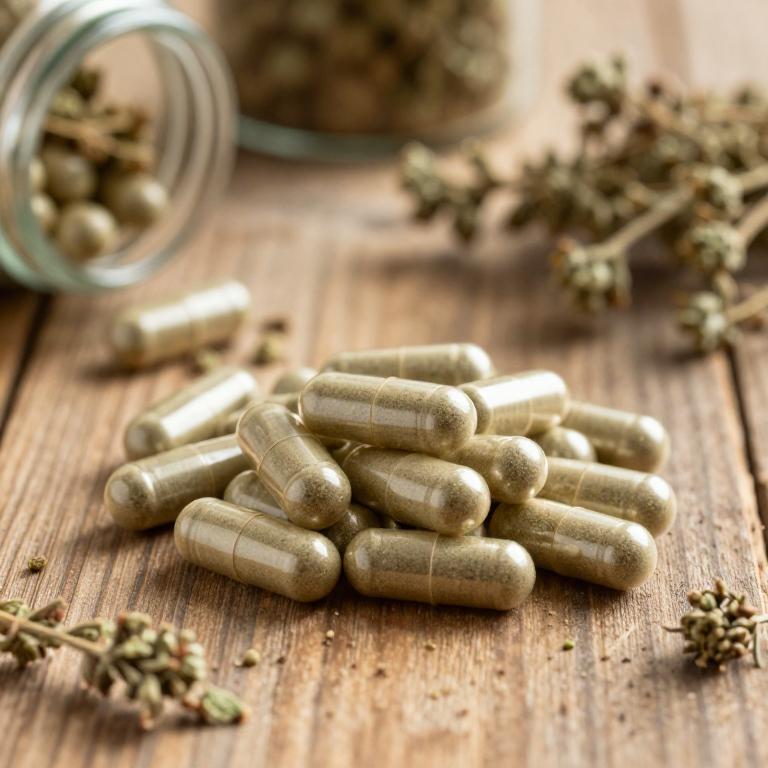
Satureja hortensis herbal capsules are used to support digestive health by promoting the secretion of digestive enzymes and reducing gastrointestinal discomfort.
They are also valued for their antimicrobial properties, which can help in fighting off harmful bacteria and supporting immune function. These capsules are commonly incorporated into herbal formulations for their potential to alleviate symptoms of indigestion, bloating, and gas. The plant's essential oils contribute to its anti-inflammatory effects, making it beneficial for respiratory and skin conditions.
Overall, satureja hortensis herbal capsules are favored for their natural therapeutic properties that address a range of health concerns.
69. Nux vomica (Strychnos nux-vomica)
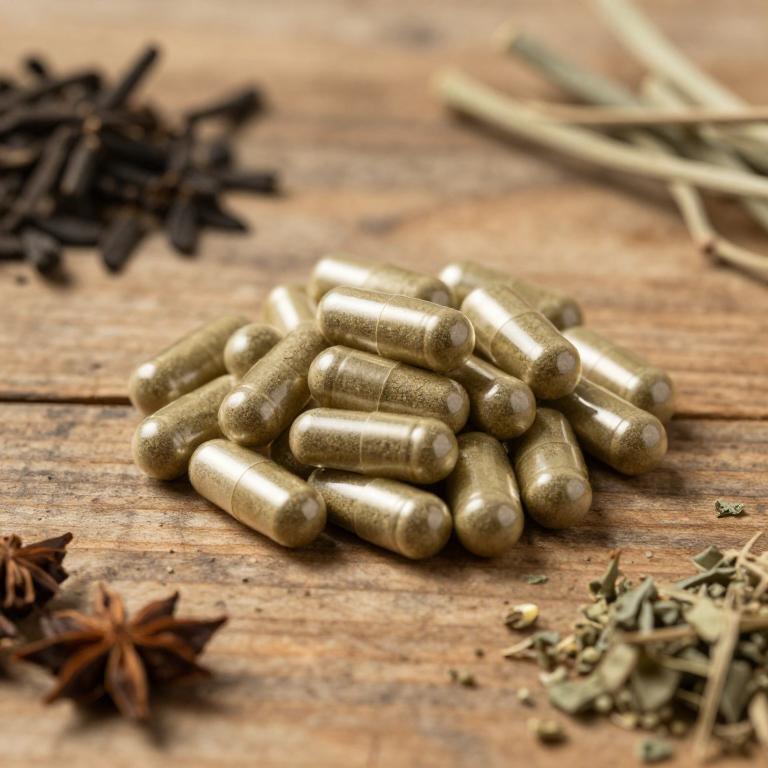
Strychnos nux-vomica herbal capsules are used to support digestive health and alleviate symptoms of digestive disorders.
They are believed to stimulate the production of digestive enzymes, enhancing the body's ability to break down food and absorb nutrients. In traditional Chinese medicine, these capsules are also used to treat conditions such as gastritis and indigestion due to their purported anti-inflammatory and detoxifying properties. However, it is important to note that strychnos nux-vomica contains toxic compounds, and its use must be strictly monitored to avoid adverse effects.
Despite their potential benefits, these capsules should only be used under the guidance of a qualified healthcare professional.
70. Tree peony (Paeonia suffruticosa)
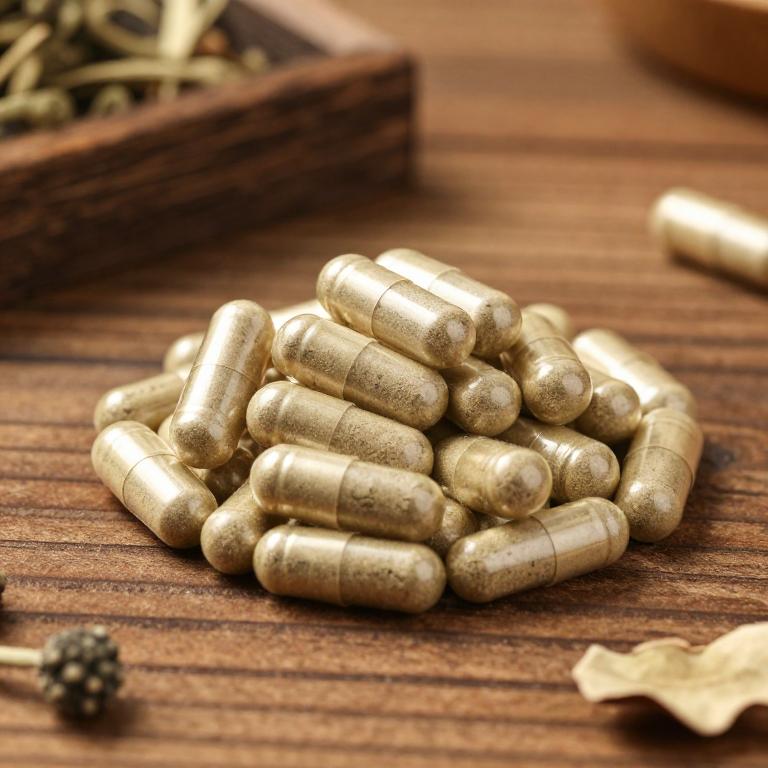
Paeonia suffruticosa herbal capsules are used to support cardiovascular health by promoting healthy blood pressure levels and improving circulation.
They are also valued for their potential to reduce inflammation and alleviate symptoms of conditions such as arthritis and menstrual cramps. These capsules may aid in enhancing liver function and supporting detoxification processes within the body. Additionally, they are often used in traditional medicine to improve mood and reduce stress, thanks to their adaptogenic properties.
Their versatility and natural composition make them a popular choice for those seeking holistic health benefits.
71. Velvet bean (Mucuna pruriens)
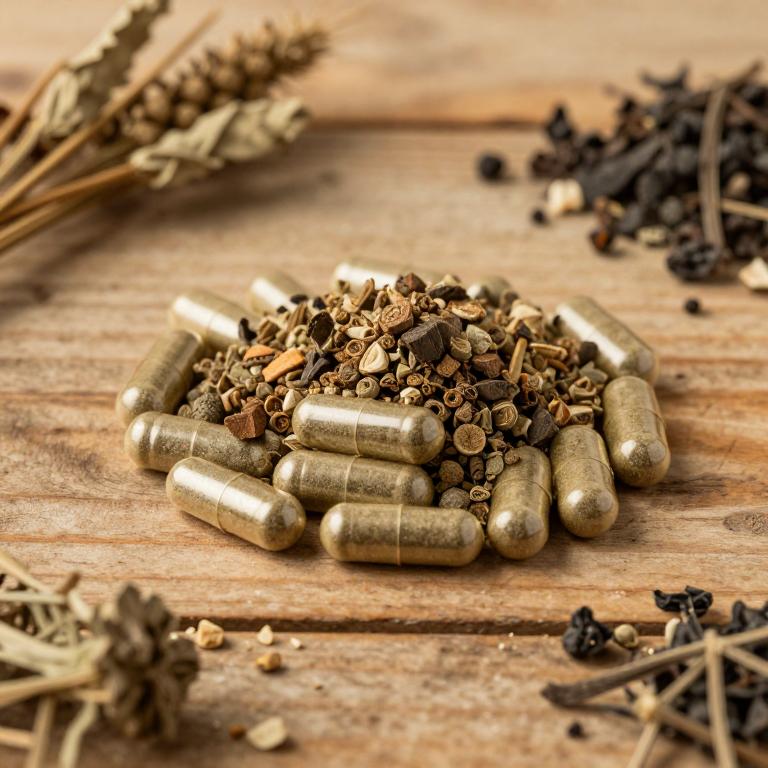
Mucuna pruriens herbal capsules are used to enhance libido and sexual performance due to their high content of L-DOPA, a precursor to dopamine, which can improve mood and energy levels.
They are also utilized to support mental clarity and cognitive function, as the compound may help in reducing anxiety and improving focus. These capsules are often taken by individuals seeking natural alternatives to manage stress and promote emotional well-being. Additionally, mucuna pruriens is believed to have potential benefits for muscle growth and physical endurance, making it popular among athletes and fitness enthusiasts.
Overall, the combination of its neurochemical effects and traditional usage makes mucuna pruriens herbal capsules a sought-after supplement for various health and wellness goals.
72. Barrenwort (Epimedium grandiflorum)
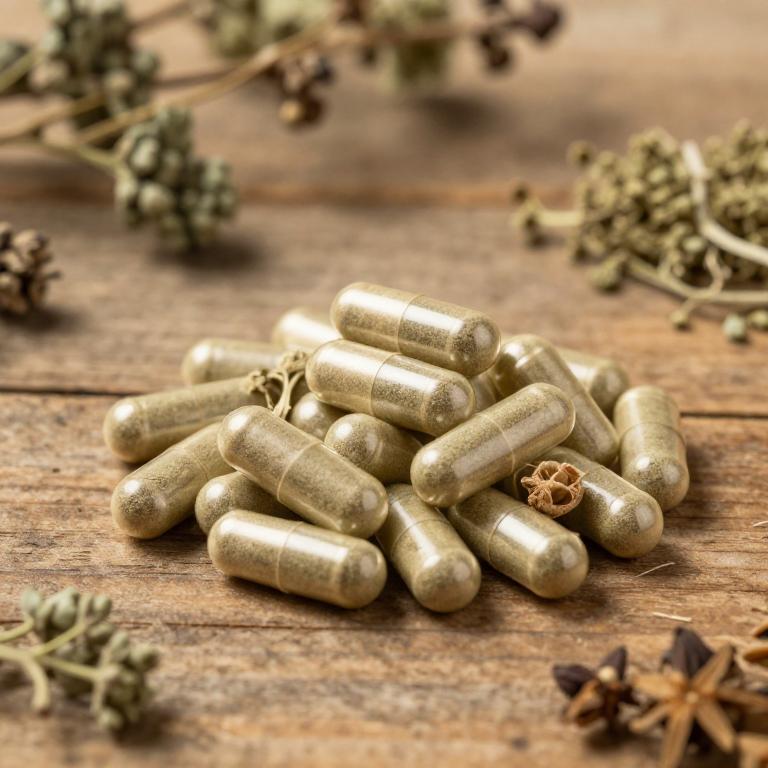
Epimedium grandiflorum herbal capsules are used to enhance sexual health and vitality in both men and women by improving blood flow and increasing libido.
These capsules contain compounds such as icariin, which have been shown to support erectile function and overall sexual performance. They are also believed to help with energy levels and physical endurance, making them popular among individuals seeking natural supplements for wellness. The herb has a long history in traditional Chinese medicine for its purported aphrodisiac properties and its ability to promote hormonal balance.
Due to these benefits, epimedium grandiflorum herbal capsules are increasingly sought after as a natural alternative to pharmaceutical treatments for sexual health issues.
73. Garlic (Allium sativum)
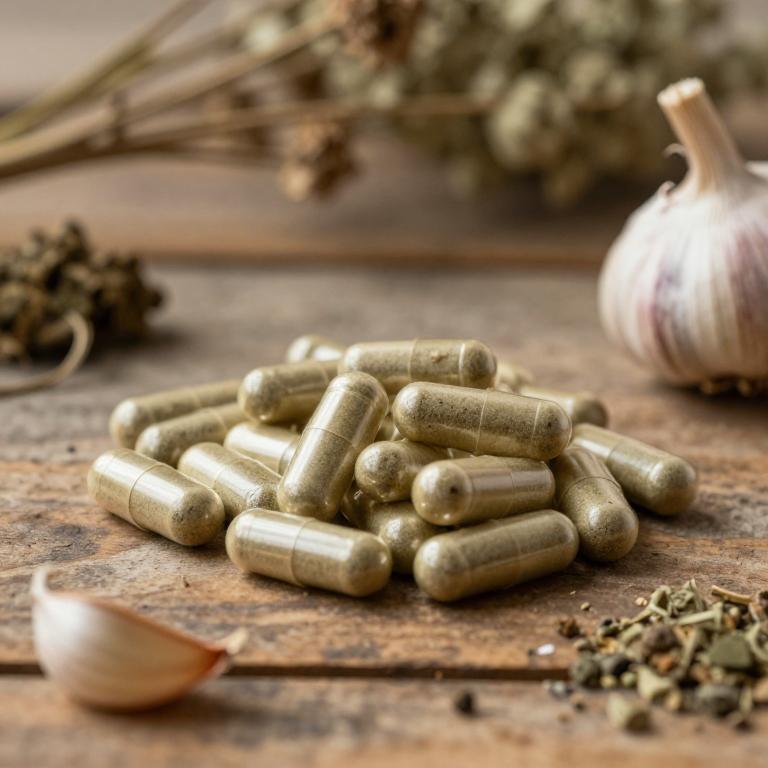
Allium sativum herbal capsules are used to support cardiovascular health by helping to lower blood pressure and cholesterol levels.
They are also known to enhance immune function and reduce the risk of infections due to their antimicrobial properties. These capsules may aid in digestive health by promoting the production of digestive enzymes and reducing inflammation in the gastrointestinal tract. Additionally, they have been studied for their potential role in cancer prevention and management due to their antioxidant and anti-inflammatory effects.
Overall, allium sativum herbal capsules are valued for their broad range of health benefits, making them a popular natural supplement for overall wellness.
74. Caraway (Carum carvi)
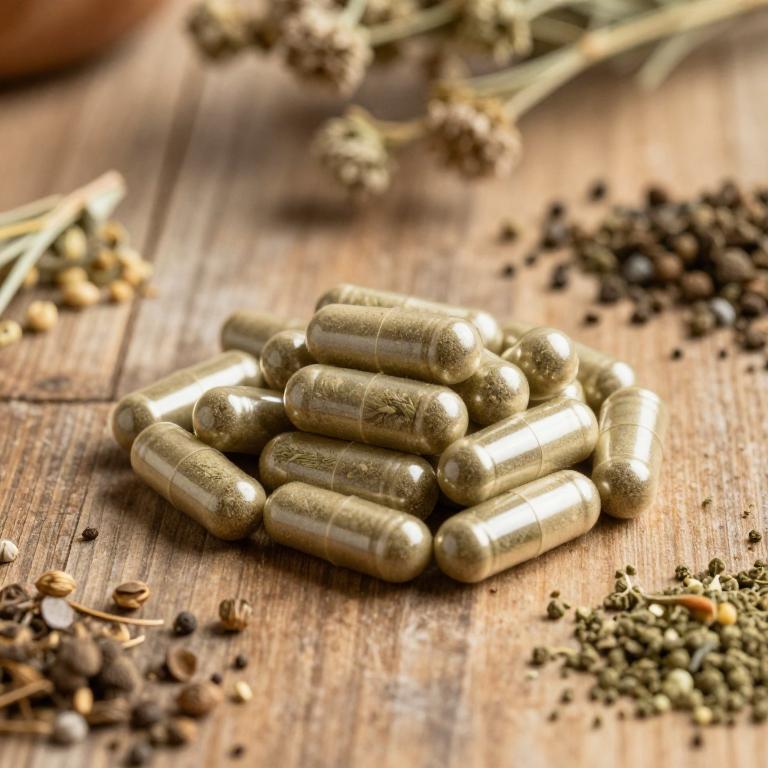
Carum carvi herbal capsules are used to support digestive health by promoting the secretion of digestive enzymes and reducing gastrointestinal discomfort.
They are commonly used to alleviate symptoms of indigestion, bloating, and flatulence due to their carminative properties. These capsules may also help in managing mild respiratory issues such as coughs and congestion by acting as an expectorant. Additionally, carum carvi is valued for its antimicrobial properties, which can contribute to overall immune support.
Due to these benefits, carum carvi herbal capsules are a popular choice in natural remedies for maintaining a healthy digestive and respiratory system.
75. Scots pine (Pinus sylvestris)
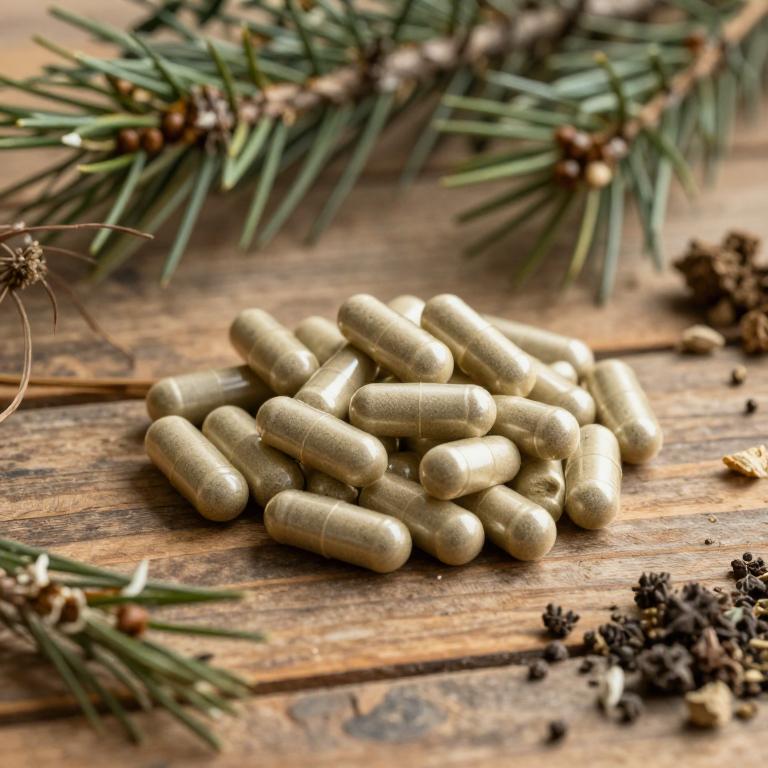
Pinus sylvestris herbal capsules are used to support respiratory health by helping to reduce inflammation and ease symptoms of conditions such as bronchitis and asthma.
These capsules contain extracts from the needles of the Scots pine tree, which are rich in antioxidants and bioactive compounds that may enhance immune function. They are also believed to promote circulation and aid in the detoxification process due to their high concentration of flavonoids and other beneficial phytochemicals. Additionally, pinus sylvestris is traditionally used in herbal medicine to help alleviate stress and improve mental clarity, making it a popular choice for those seeking natural wellness support.
Overall, the combination of its anti-inflammatory, antioxidant, and immune-boosting properties makes pinus sylvestris a versatile and valuable herbal supplement.
76. Tongkat ali (Eurycoma longifolia)
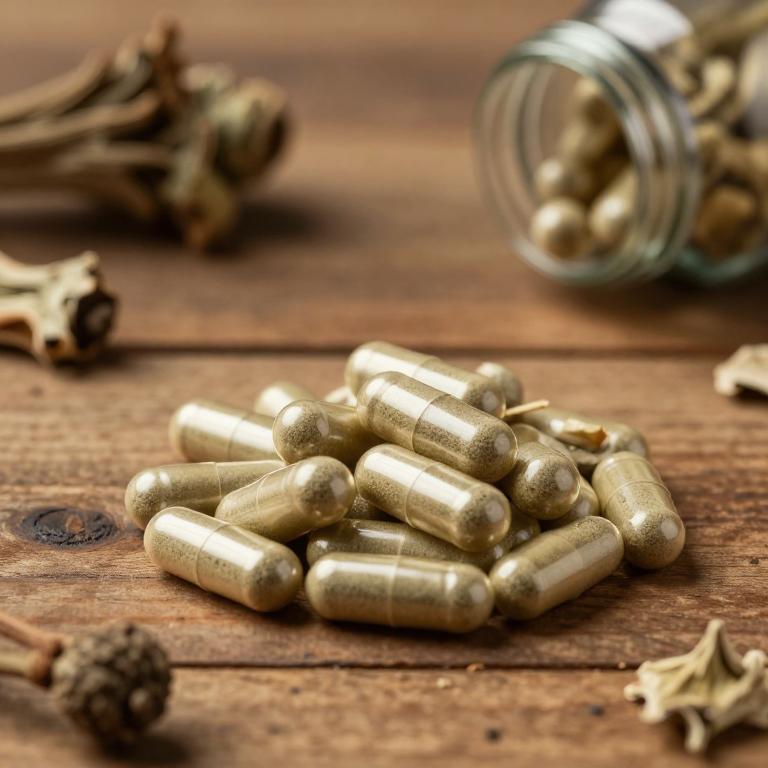
Eurycoma longifolia herbal capsules are used to enhance vitality and support overall health due to their rich content of bioactive compounds such as alkaloids and flavonoids.
These capsules are commonly used to boost energy levels and improve physical endurance, making them popular among individuals with active lifestyles. They are also believed to support immune function and may help in reducing fatigue, thereby promoting a sense of well-being. The traditional use of Eurycoma longifolia in Southeast Asian medicine has led to its incorporation into modern herbal supplements for various wellness purposes.
Overall, these capsules are valued for their potential to improve health and vitality through natural means.
77. Goatweed (Eclipta prostrata)
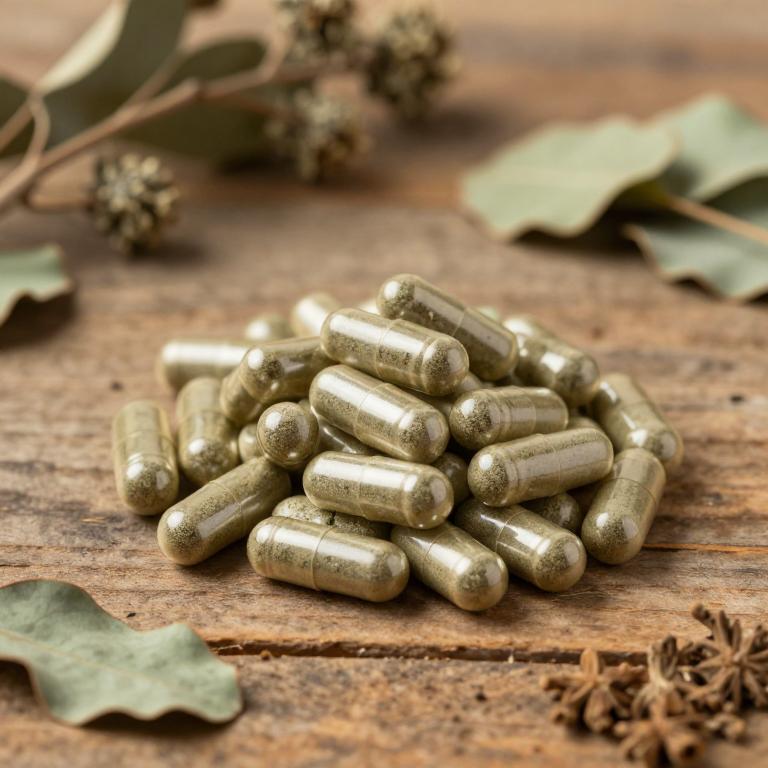
Eclipta prostrata herbal capsules are used to support liver health and promote detoxification by enhancing the body's natural processes.
These capsules contain compounds that may help in reducing liver inflammation and improving the function of liver cells. They are also believed to aid in the treatment of skin conditions such as eczema and psoriasis due to their anti-inflammatory and antioxidant properties. Additionally, eclipta prostrata is traditionally used to enhance hair growth and strengthen hair follicles, making it beneficial for those experiencing hair loss.
Overall, the use of these capsules is rooted in traditional medicine and is supported by modern research into their potential therapeutic benefits.
78. Melaleuca (Melaleuca alternifolia)
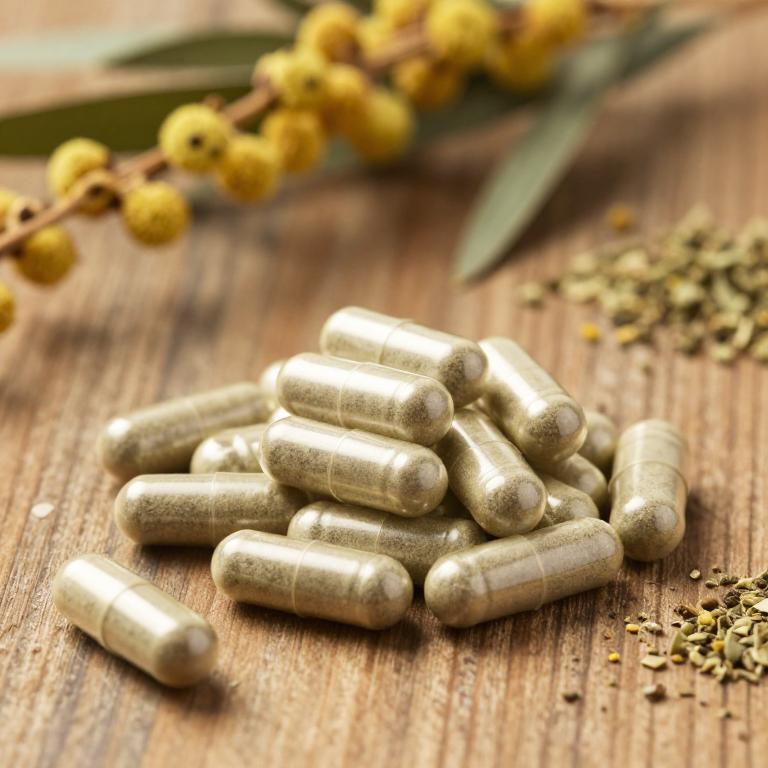
Melaleuca alternifolia herbal capsules are used to support immune health and promote overall wellness due to their active compound, tea tree oil, which possesses strong antimicrobial properties.
These capsules are commonly used to help alleviate symptoms of respiratory infections, such as colds and sinusitis, by reducing inflammation and fighting bacterial or viral infections. They may also be used topically in diluted form to treat skin conditions like acne, fungal infections, and minor wounds, although the capsules themselves are ingested for internal benefits. The natural antioxidants in melaleuca alternifolia help boost the body's defenses and may aid in detoxification processes.
Because of their broad-spectrum antimicrobial activity, these capsules are a popular choice for individuals seeking natural remedies to enhance their health and prevent illness.
79. Mountain arnica (Arnica montana)
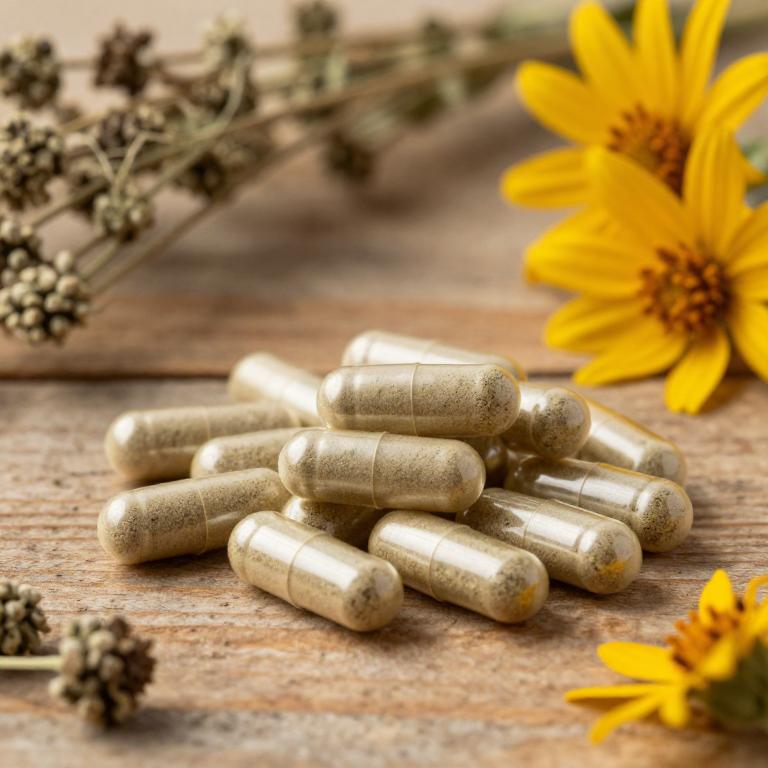
Arnica montana herbal capsules are used to support recovery from injuries and reduce inflammation in the body.
They are commonly taken to alleviate pain associated with bruises, sprains, and muscle strains by promoting circulation and reducing swelling. These capsules are also used to ease symptoms of arthritis and other inflammatory conditions due to their anti-inflammatory properties. Because they are taken internally, they can provide systemic benefits that topical applications may not achieve.
However, they should be used with caution and under the guidance of a healthcare professional, especially for pregnant women or those with certain medical conditions.
80. Polium germander (Teucrium polium)
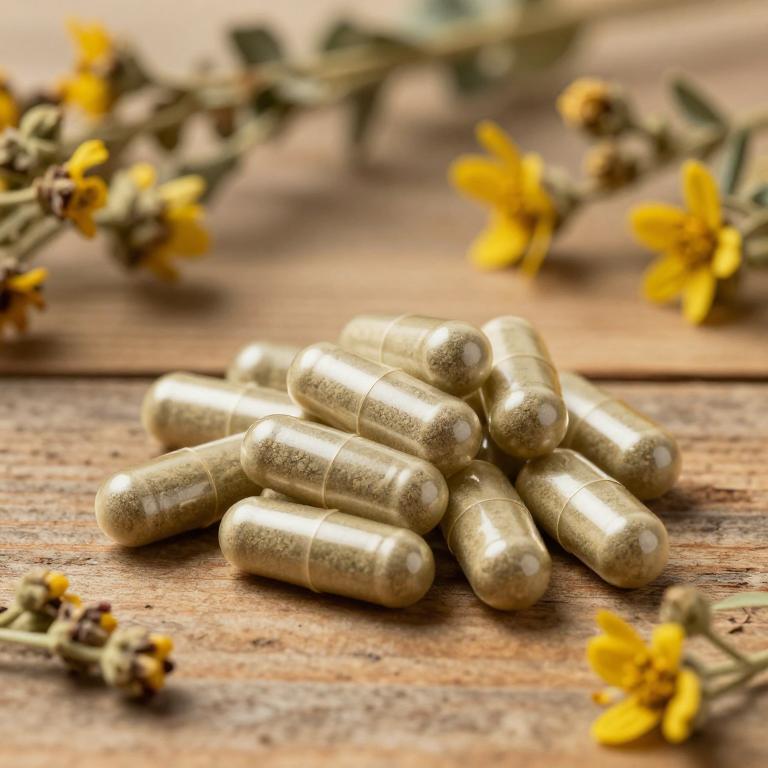
Teucrium polium herbal capsules are used to support digestive health and alleviate symptoms of gastrointestinal discomfort.
They are traditionally valued for their ability to reduce inflammation in the digestive tract, making them beneficial for individuals suffering from conditions like indigestion, bloating, or irritable bowel syndrome. The plant contains compounds such as flavonoids and tannins, which contribute to its soothing and antispasmodic properties. These capsules are also believed to enhance overall gut motility and may help in the management of mild to moderate digestive disorders.
Due to their natural composition and potential therapeutic benefits, teucrium polium herbal capsules are increasingly sought after as a complementary remedy in holistic health practices.
81. Euphrasia (Euphrasia officinalis)
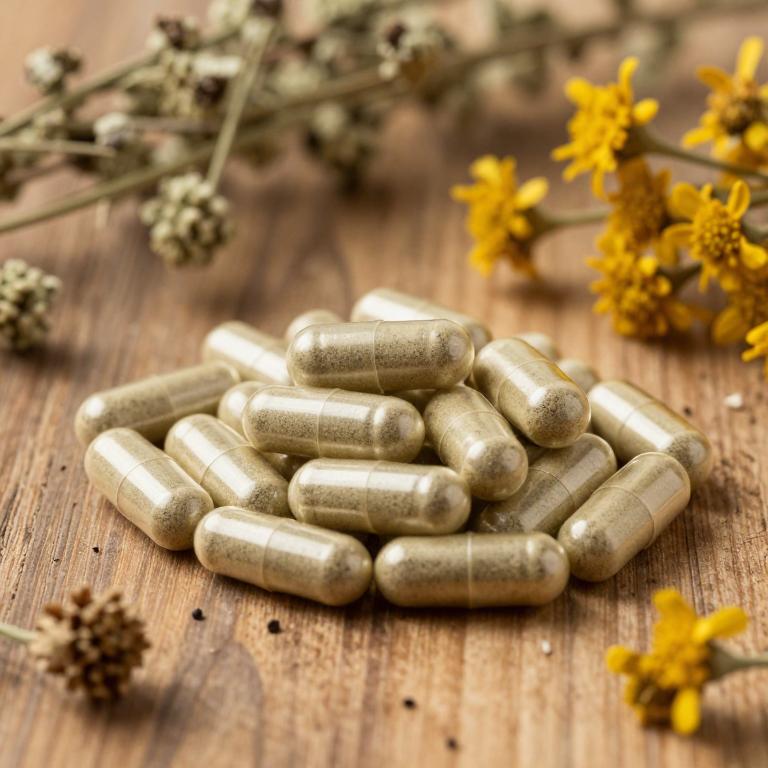
Euphrasia officinalis herbal capsules are used to support eye health and alleviate symptoms of eye strain, redness, and irritation.
They contain the active compound aucubin, which has been traditionally used to soothe inflammation and improve tear production. These capsules are often recommended for individuals who spend long hours in front of screens or suffer from dry eye syndrome. Their mild and natural properties make them a preferred choice for those seeking alternative remedies without harsh side effects.
Additionally, they are believed to enhance overall visual clarity and reduce discomfort associated with various eye conditions.
82. Sanguisorba (Sanguisorba officinalis)
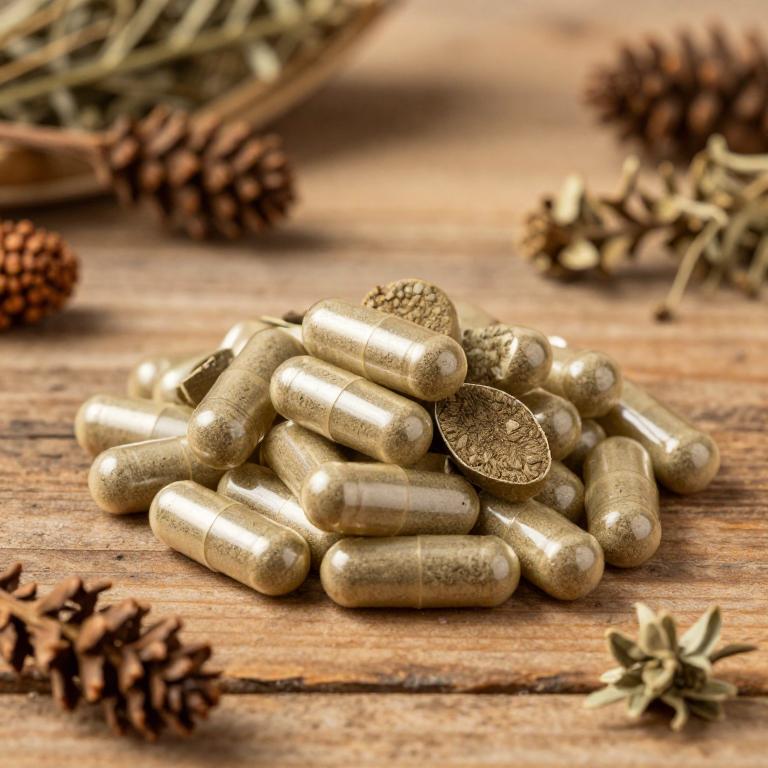
Sanguisorba officinalis herbal capsules are used to support digestive health by promoting the secretion of digestive enzymes and improving nutrient absorption.
They are also valued for their potential to reduce inflammation in the gastrointestinal tract, making them beneficial for individuals suffering from conditions like irritable bowel syndrome. These capsules may aid in detoxification processes by supporting the liver's ability to process toxins and maintain a healthy internal environment. Additionally, they are believed to have antioxidant properties that help protect cells from oxidative stress and support overall immune function.
Due to their natural composition and multiple health benefits, sanguisorba officinalis herbal capsules are increasingly sought after as a complementary therapy in holistic health practices.
83. Geranium (Pelargonium graveolens)
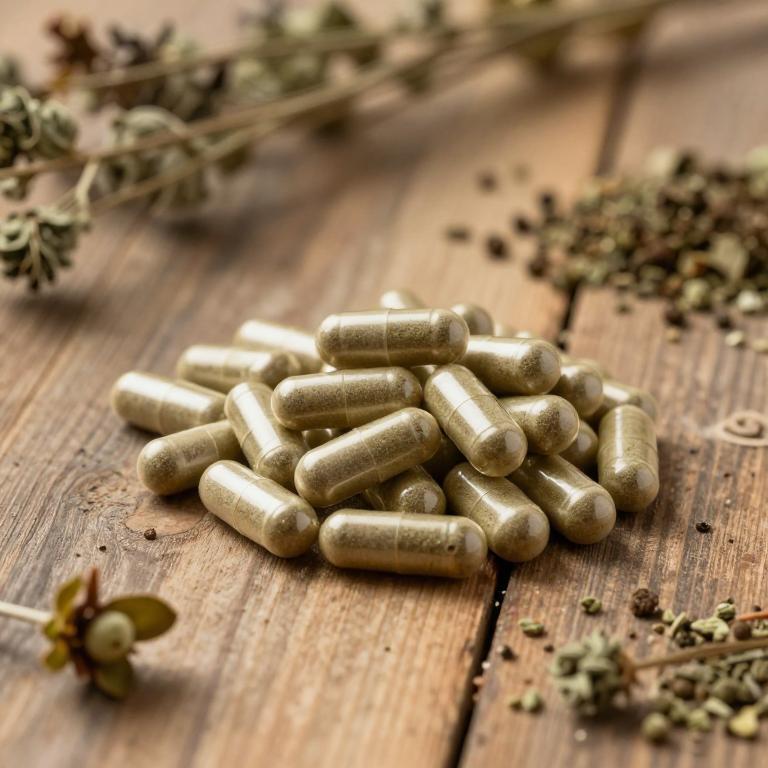
Pelargonium graveolens herbal capsules are used to support respiratory health by helping to relieve symptoms of coughs, colds, and bronchitis due to their expectorant and anti-inflammatory properties.
These capsules are also beneficial for alleviating digestive issues such as bloating and indigestion, as they contain compounds that promote healthy digestion. Additionally, pelargonium graveolens is known for its calming effects, making it useful in reducing stress and anxiety when taken as a supplement. The plant’s essential oils, particularly geraniol and citronellol, contribute to its therapeutic benefits by acting as natural antiseptics and antioxidants.
Because of these properties, pelargonium graveolens herbal capsules are a popular choice for those seeking natural remedies for common ailments and overall wellness.
84. Negundo vitex (Vitex negundo)
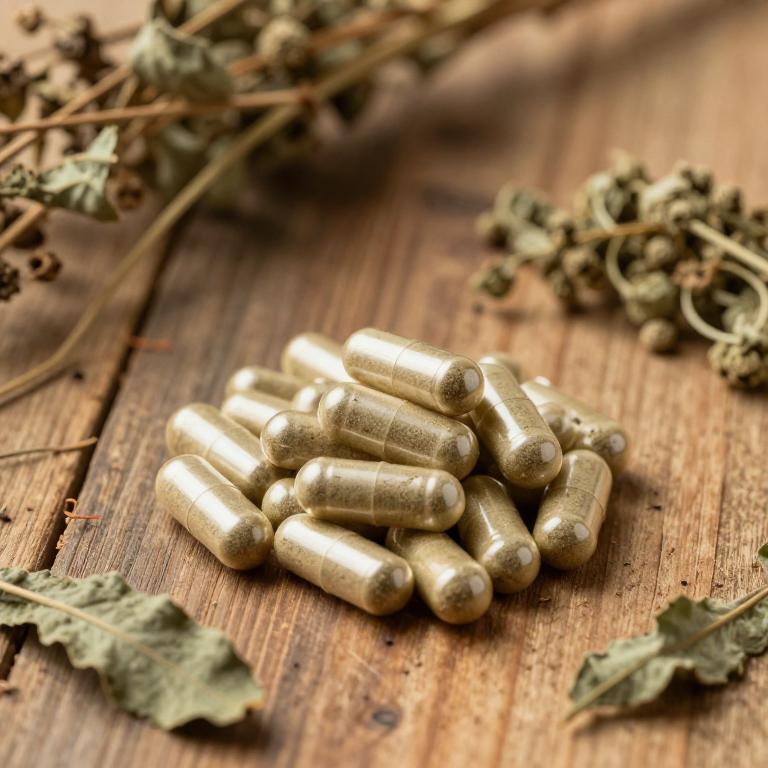
Vitex negundo herbal capsules are used to support hormonal balance, particularly in women, by regulating menstrual cycles and alleviating symptoms of premenstrual syndrome (PMS).
These capsules are also beneficial for improving fertility by enhancing ovulation and supporting reproductive health. The herb is known for its adaptogenic properties, which help the body manage stress and promote overall well-being. Additionally, Vitex negundo is used to reduce inflammation and support the immune system, making it a versatile herbal remedy.
Its traditional use in Ayurvedic and Chinese medicine further underscores its long-standing reputation for promoting health and vitality.
85. Sweet wormwood (Artemisia annua)
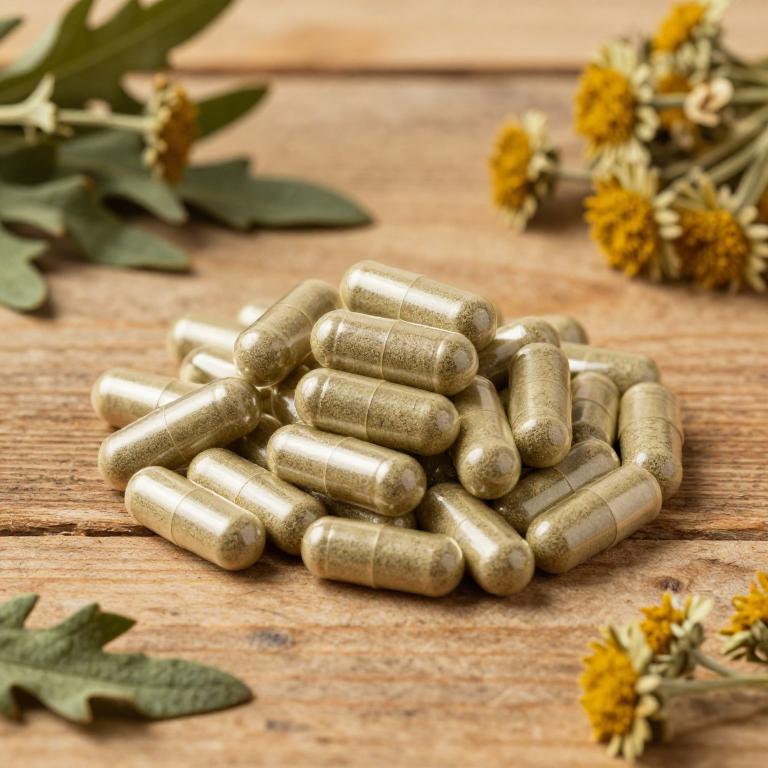
Artemisia annua herbal capsules are used to support immune function and combat infections, particularly those caused by parasites and certain viral infections.
They contain artemisinin, a compound known for its antimalarial properties, making them a traditional remedy for malaria treatment. These capsules are also used in herbal medicine to reduce fever and alleviate symptoms of respiratory infections. Due to their natural origin and potential efficacy, they are often sought as complementary therapy alongside conventional treatments.
However, their use should be guided by healthcare professionals to ensure safety and proper dosage.
86. Kudzu (Pueraria lobata)
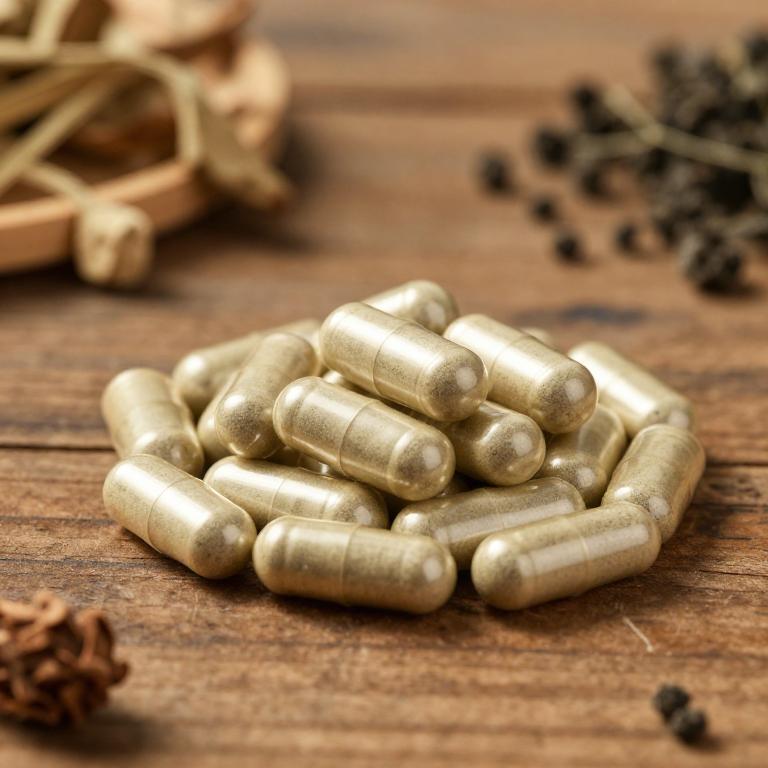
Pueraria lobata herbal capsules are used to support weight management by helping to reduce body fat and increase lean muscle mass.
They are also utilized to enhance metabolic function, which can aid in the body's ability to burn calories more efficiently. These capsules may help regulate blood sugar levels, making them beneficial for individuals with diabetes or those at risk of developing the condition. Additionally, pueraria lobata is believed to have anti-inflammatory and antioxidant properties that contribute to overall health and well-being.
Due to these potential benefits, pueraria lobata herbal capsules are increasingly being incorporated into dietary supplements for holistic health support.
87. St. john's wort (Agrimonia eupatoria)
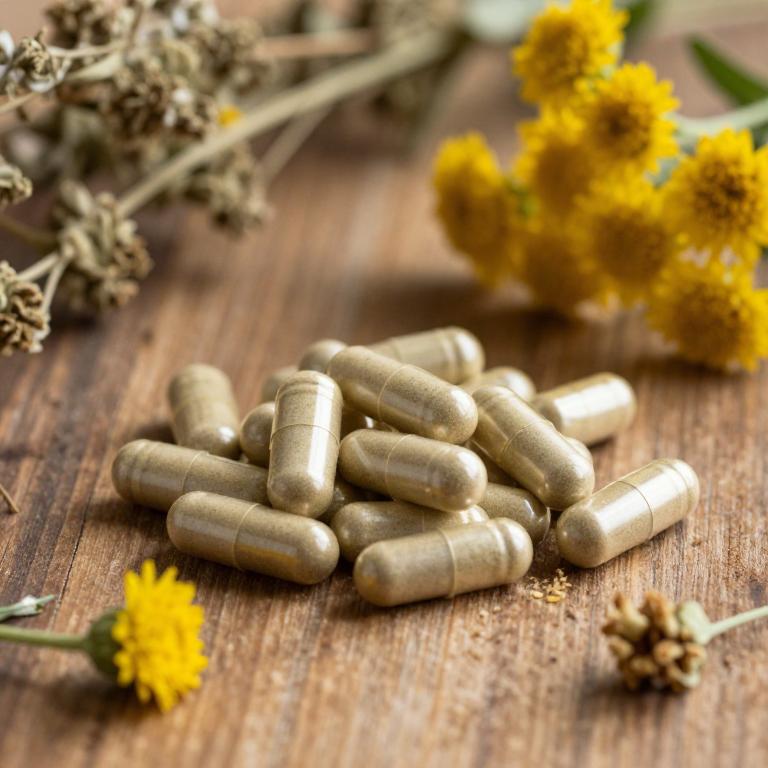
Agrimonia eupatoria herbal capsules are used to support digestive health by promoting the secretion of digestive enzymes and reducing gastrointestinal discomfort.
They are also utilized to alleviate symptoms of mild inflammation due to their anti-inflammatory properties. These capsules may help in managing stress-related digestive issues, such as irritable bowel syndrome, by calming the digestive system. The herb is known for its astringent and tonic effects, which can aid in improving overall gut function and nutrient absorption.
Because of these benefits, agrimonia eupatoria herbal capsules are often recommended as a natural supplement for those seeking to enhance digestive wellness.
88. Sandalwood (Santalum album)
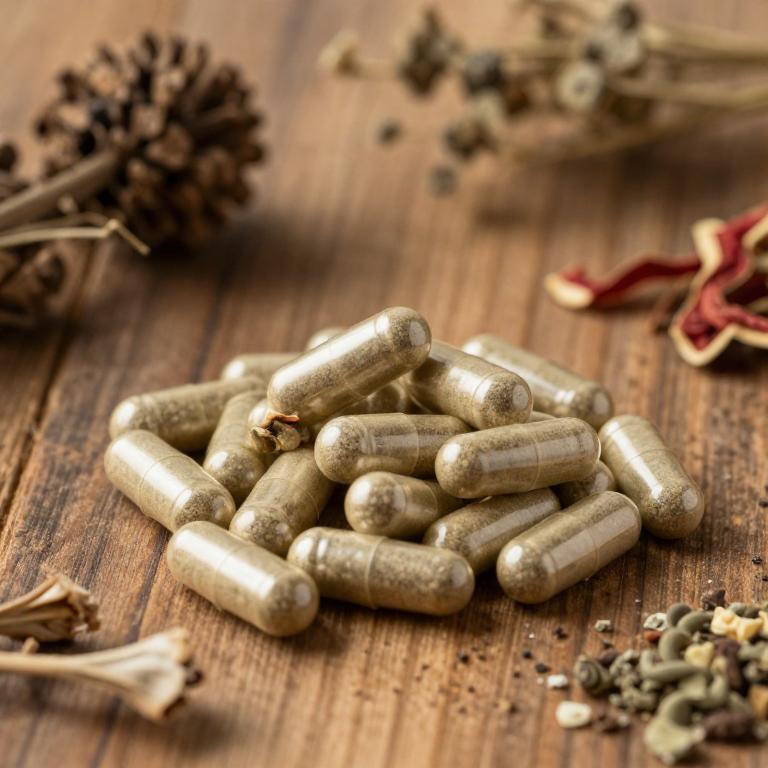
Santalum album herbal capsules are used to support emotional well-being and reduce symptoms of anxiety and stress.
These capsules contain the resinous extract of the sandalwood tree, which is traditionally valued for its calming and grounding properties. The active compounds in santalum album, such as santalols and sesquiterpenes, are believed to promote relaxation and enhance mental clarity. They are often recommended as a natural alternative for individuals seeking to manage mild to moderate stress without pharmaceutical interventions.
Due to their soothing effects, santalum album herbal capsules are also used in aromatherapy and as a complementary therapy in holistic health practices.
89. Pumpkin (Cucurbita pepo)
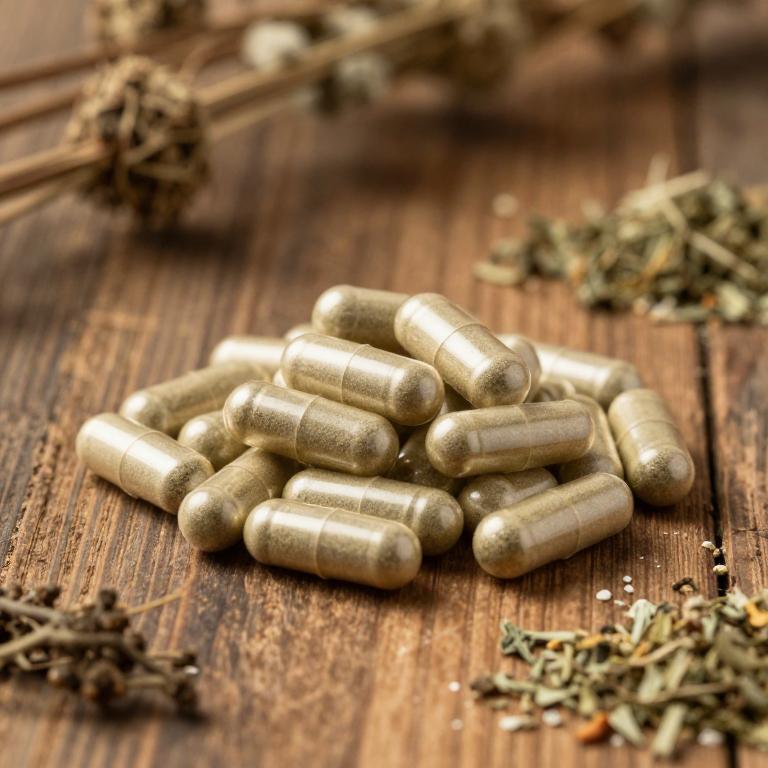
Cucurbita pepo herbal capsules are used to support digestive health by promoting the secretion of digestive enzymes and reducing gastrointestinal discomfort.
They are often incorporated into herbal remedies to aid in the treatment of constipation and to soothe inflammation in the digestive tract. These capsules are also valued for their antioxidant properties, which may help protect cells from oxidative stress and support overall immune function. Due to their mild nature, they are suitable for long-term use in maintaining general wellness.
The versatility of cucurbita pepo makes it a popular choice in both traditional and modern herbal medicine practices.
90. Tamarind (Tamarindus indica)
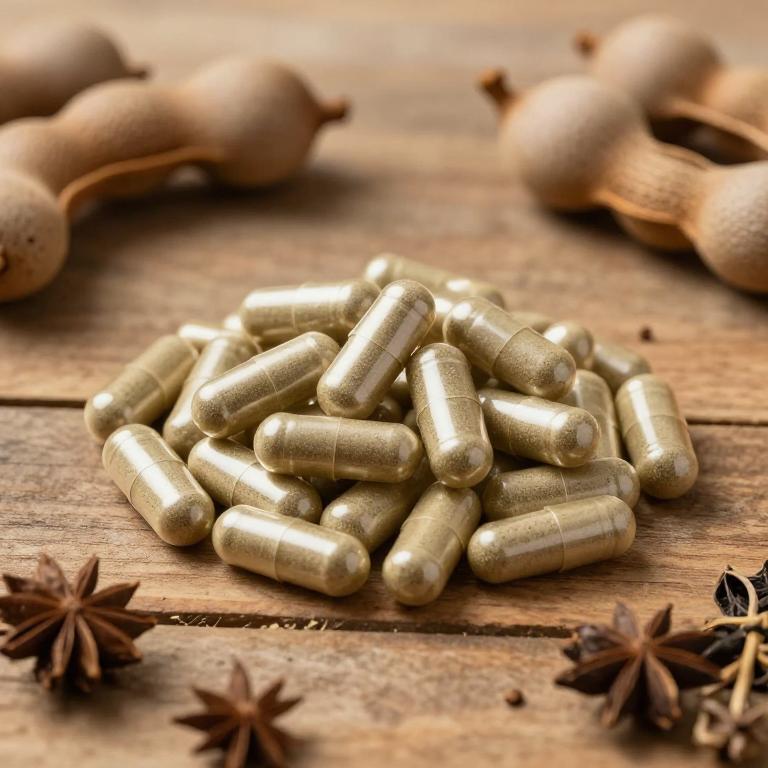
Tamarindus indica herbal capsules are used to support digestive health by promoting the secretion of digestive enzymes and improving gut motility.
They are also beneficial in managing symptoms of indigestion, bloating, and constipation due to their mild laxative properties. These capsules may help in reducing inflammation in the gastrointestinal tract, making them a natural remedy for individuals with conditions like irritable bowel syndrome. Additionally, tamarindus indica is rich in antioxidants, which can contribute to overall immune support and detoxification processes in the body.
Because of these benefits, tamarindus indica herbal capsules are increasingly being incorporated into holistic health regimens for their natural and supportive role in maintaining digestive wellness.
91. Common myrtle (Myrtus communis)
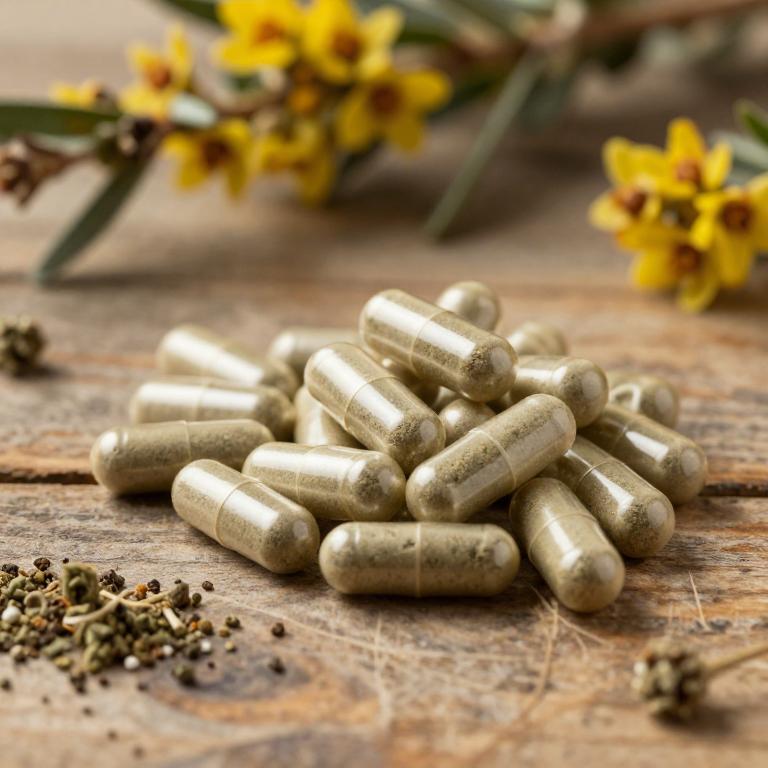
Myrtus communis herbal capsules are used to support respiratory health by helping to relieve symptoms of coughs, bronchitis, and other respiratory conditions due to their anti-inflammatory and expectorant properties.
These capsules are also beneficial for digestive health, as they can help alleviate digestive discomfort and promote healthy digestion by stimulating the production of digestive enzymes. Additionally, myrtus communis is known for its calming effects, making it useful in reducing stress and improving mood, which can contribute to overall well-being. The plant’s rich content of antioxidants and essential oils further supports immune function and may help protect against oxidative stress.
Due to these diverse benefits, myrtus communis herbal capsules are a versatile natural remedy that can be incorporated into a holistic approach to health and wellness.
92. Pogostemon (Pogostemon cablin)
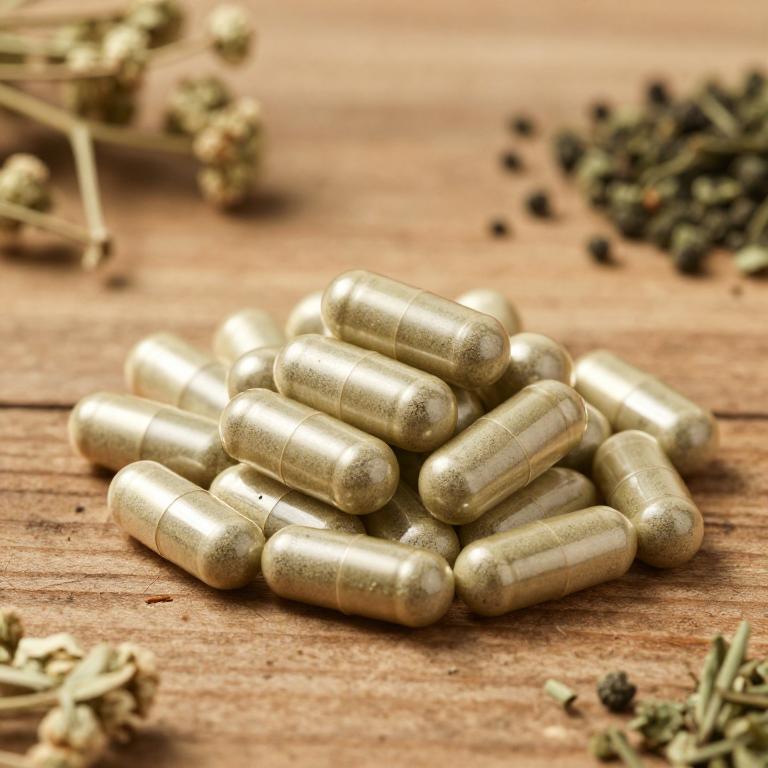
Pogostemon cablin herbal capsules are used to support digestive health by promoting healthy gut function and alleviating symptoms of indigestion.
They are also utilized to reduce inflammation and soothe gastrointestinal discomfort, making them beneficial for individuals with irritable bowel syndrome or other digestive disorders. These capsules may help in managing stress-related stomach issues due to their calming effects on the nervous system. Additionally, they are believed to aid in the detoxification process by supporting liver function.
Overall, pogostemon cablin herbal capsules are valued for their natural properties that contribute to overall wellness and digestive balance.
93. Purple coneflower (Echinacea angustifolia)
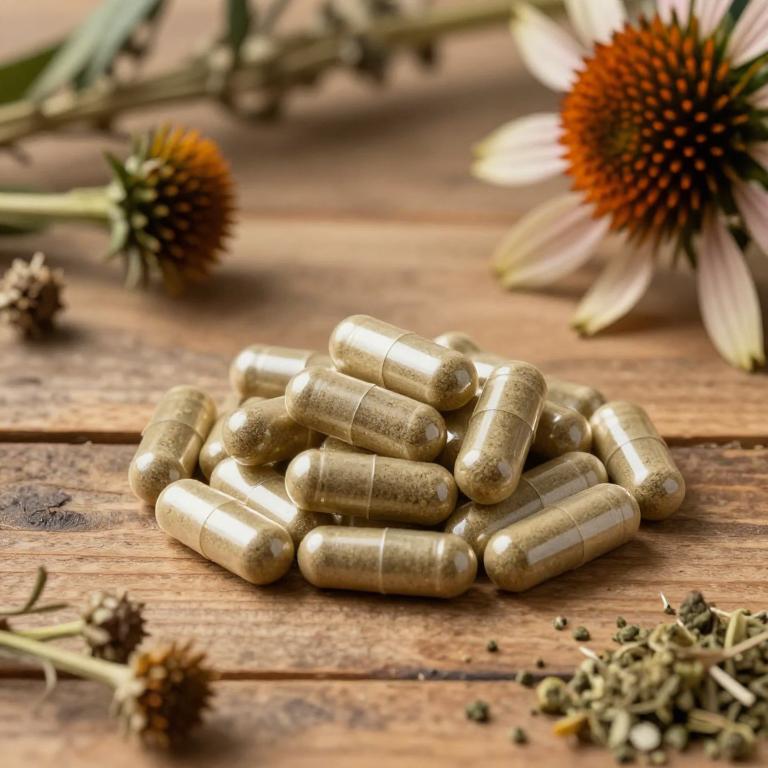
Echinacea angustifolia herbal capsules are used to support the immune system and reduce the severity and duration of colds and respiratory infections.
They contain active compounds such as alkamides, caffeic acid derivatives, and polysaccharides, which are believed to enhance immune function by stimulating the production of white blood cells. These capsules are also commonly used to help alleviate symptoms of inflammatory conditions like arthritis due to their potential anti-inflammatory properties. Their natural origin makes them a popular choice for individuals seeking alternative or complementary health support.
Overall, echinacea angustifolia herbal capsules are valued for their ability to promote wellness and provide natural immune support.
94. Hops (Humulus lupulus)
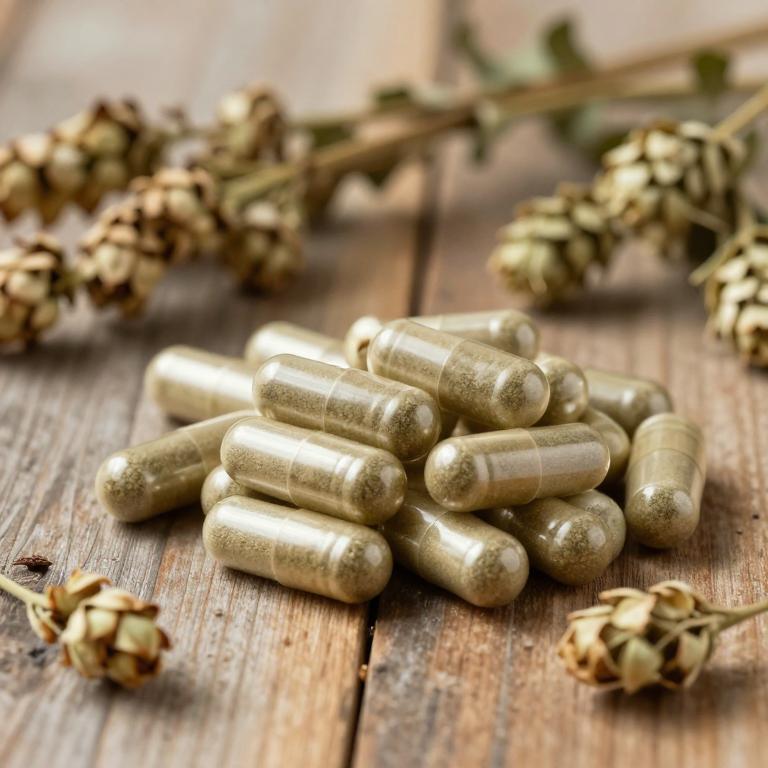
Humulus lupulus herbal capsules are used to support digestive health and alleviate symptoms of mild digestive discomfort.
They contain compounds such as humulone and lupulins, which have antimicrobial and anti-inflammatory properties that can help soothe the gastrointestinal tract. These capsules are also known to reduce bloating, gas, and indigestion, making them a popular choice for individuals with irritable bowel syndrome or other digestive disorders. The sedative effects of humulus lupulus may also contribute to its use in promoting relaxation and reducing stress-related digestive issues.
Overall, they offer a natural and effective alternative for those seeking to improve their digestive wellness.
95. Chinese date (Ziziphus jujuba)
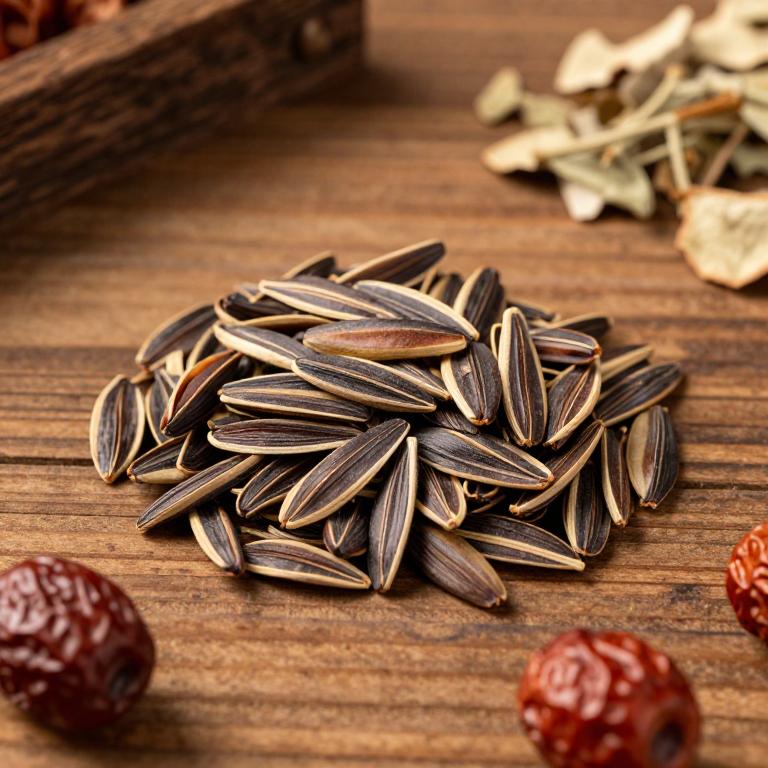
Ziziphus jujuba herbal capsules are used to support relaxation and improve sleep quality by promoting calmness and reducing anxiety.
These capsules contain extracts from the jujube fruit, which is known for its high levels of antioxidants, amino acids, and minerals that contribute to overall well-being. They are particularly beneficial for individuals experiencing stress-related insomnia or mild nervousness, as they help regulate the nervous system. The natural compounds in ziziphus jujuba may also enhance mood and cognitive function, making them a popular choice in traditional and complementary medicine.
Due to their gentle nature, these capsules are often recommended as a safe alternative to synthetic sedatives for long-term use.
96. Hemp (Cannabis sativa)
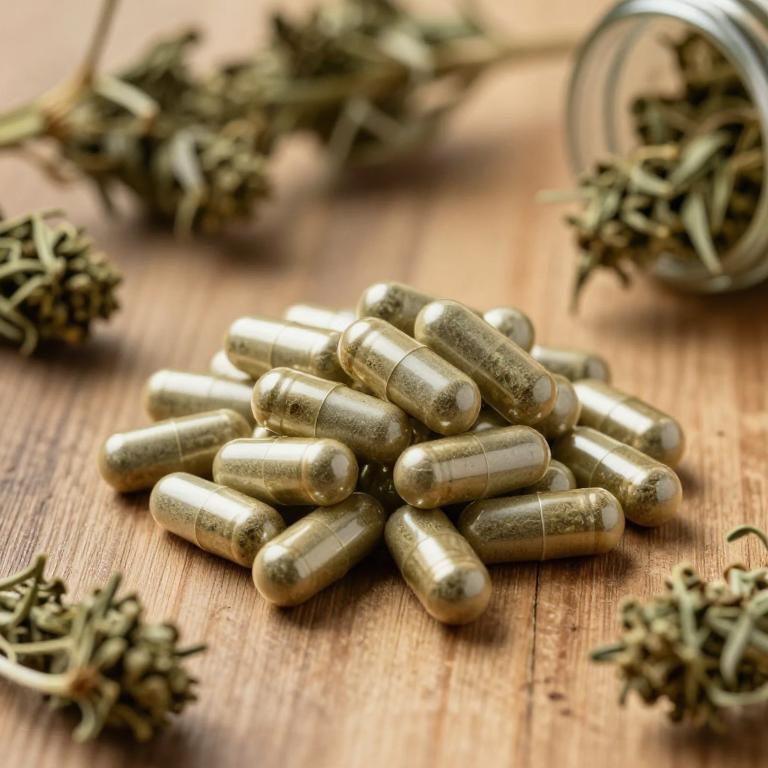
Cannabis sativa herbal capsules are used to support overall wellness and alleviate various physical and mental health conditions.
They are commonly utilized for their potential anti-inflammatory, analgesic, and anxiolytic properties, making them beneficial for individuals suffering from chronic pain, anxiety, and insomnia. These capsules provide a convenient and discreet method of consuming cannabis-derived compounds, allowing for consistent dosing and ease of use. Additionally, they may aid in managing symptoms of neurological disorders and promoting relaxation without the psychoactive effects associated with higher THC content.
As interest in natural remedies grows, cannabis sativa herbal capsules are increasingly being explored as a complementary therapy in holistic health practices.
97. Dill (Anethum graveolens)
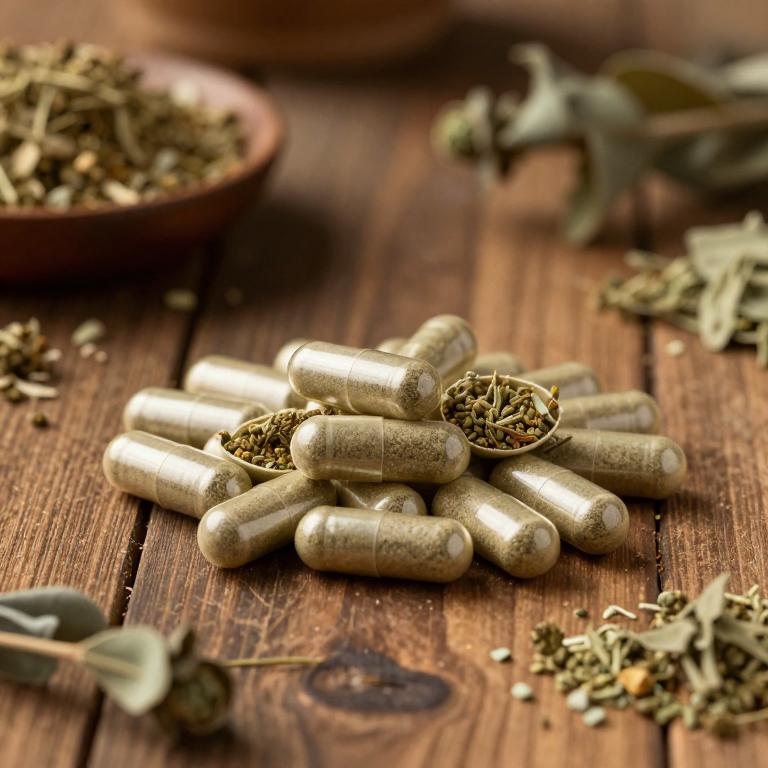
Anethum graveolens herbal capsules are used to support digestive health by promoting the secretion of digestive enzymes and reducing symptoms of bloating and gas.
They are also commonly used to relieve nausea and motion sickness due to their calming and soothing properties. These capsules may aid in the treatment of respiratory conditions like coughs and congestion by acting as a natural expectorant. Additionally, they are valued for their potential anti-inflammatory and antioxidant effects, which can contribute to overall wellness.
The versatility of anethum graveolens makes it a popular choice in herbal medicine for its wide range of therapeutic benefits.
98. Love-in-a-mist (Peucedanum ostruthium)
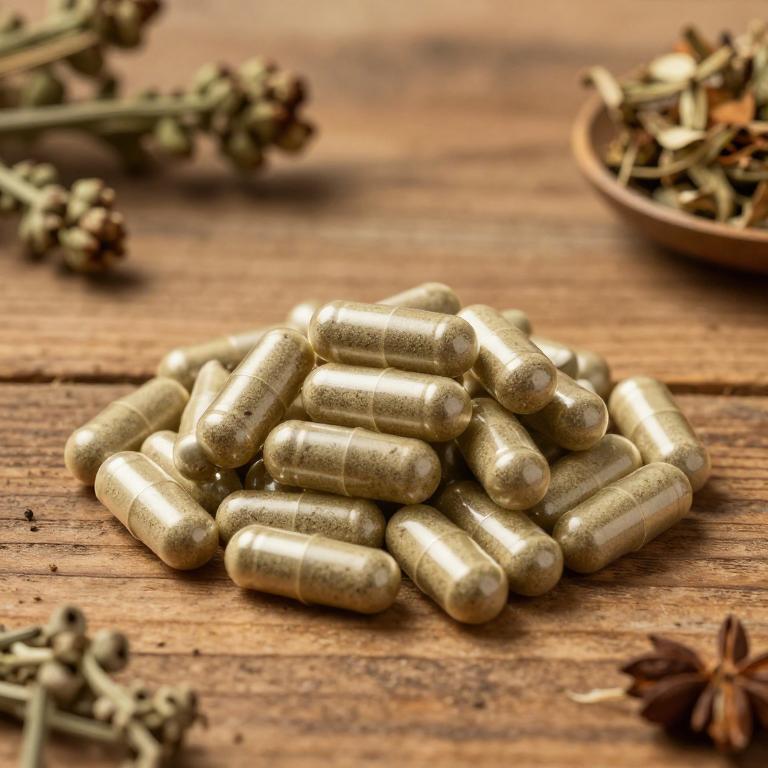
Peucedanum ostruthium herbal capsules are used to support digestive health and alleviate symptoms of gastrointestinal discomfort.
These capsules contain a concentrated form of the plant’s active compounds, which have been traditionally valued for their soothing and anti-inflammatory properties. They are often recommended for individuals experiencing bloating, gas, or mild stomach cramps due to their ability to promote healthy digestion. The herb is also believed to aid in detoxification processes within the body, making it beneficial for overall wellness.
Due to its natural composition and mild side effect profile, peucedanum ostruthium herbal capsules are a popular choice for those seeking gentle yet effective herbal remedies.
99. Marshmallow (Althaea officinalis)
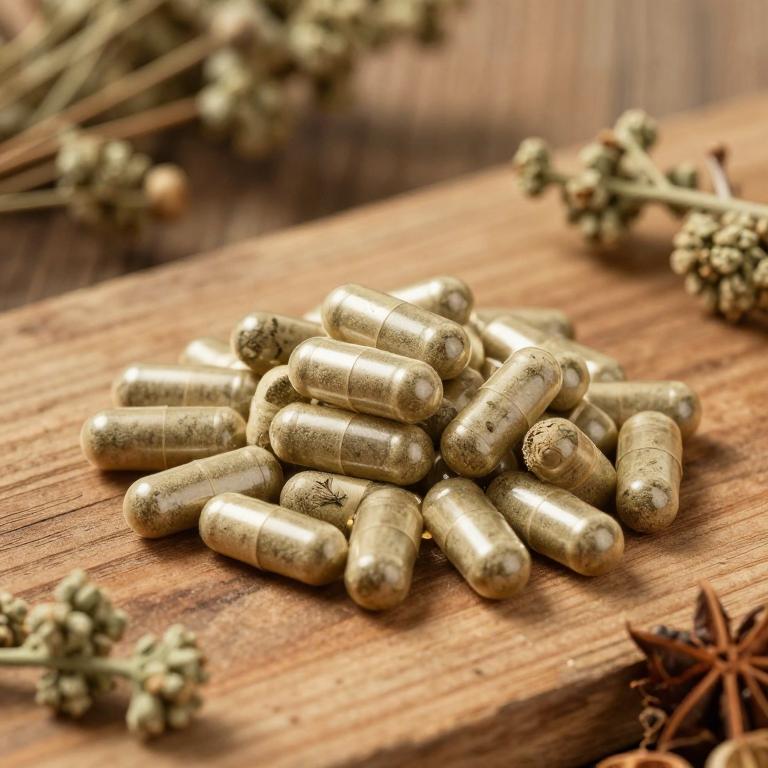
Althaea officinalis herbal capsules are used to support respiratory health by alleviating symptoms of coughs and sore throats due to their mucilage content, which acts as a natural demulcent.
They are also beneficial for digestive health, helping to soothe inflammation in the gastrointestinal tract and promote healthy digestion. These capsules may aid in reducing inflammation and irritation in the urinary tract, making them useful for conditions like cystitis. Additionally, althaea officinalis is known for its calming properties, which can help ease stress and promote relaxation.
Overall, their soothing and anti-inflammatory properties make althaea officinalis herbal capsules a versatile natural remedy for various health concerns.
100. Rhubarb (Rheum palmatum)
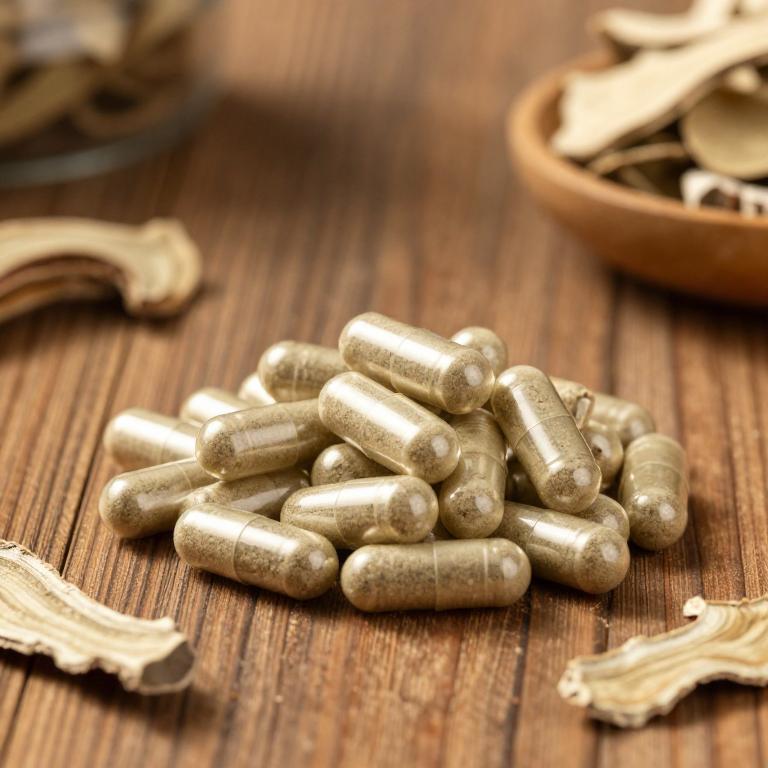
Rheum palmatum herbal capsules are used to support digestive health and alleviate symptoms of constipation due to their high content of active compounds like anthraquinones, which stimulate bowel movements.
These capsules are also commonly used to reduce inflammation in the gastrointestinal tract, making them beneficial for individuals suffering from conditions like irritable bowel syndrome or inflammatory bowel disease. Additionally, rheum palmatum is believed to have detoxifying properties that help in cleansing the body of toxins, promoting overall wellness. Its natural laxative effects make it a preferred choice for those seeking a gentle and effective alternative to synthetic laxatives.
However, it is important to use these capsules under the guidance of a healthcare professional to avoid potential side effects and ensure proper dosage.